Engine Replacement LHD
Tools Required
J 41798 Engine Lifting Brackets
Removal Procedure
- Turn the ignition key to the LOCK position.
- Disconnect the negative battery cable. Refer to Battery Negative Cable Disconnection and Connection .
- Remove the engine cover. Refer to Engine Cover Replacement .
- Remove the radiator air baffle and deflector. Refer to Radiator Air Upper Baffle and Deflector Replacement .
- Recover the air conditioning (A/C) refrigerant. Refer to Refrigerant Recovery and Recharging .
- Remove the air intake duct. Refer to Air Cleaner Inlet Duct Replacement .
- Depressurize the fuel system. Refer to Fuel Pressure Relief .
- Drain the cooling system. Refer to Cooling System Draining and Filling .
- Remove the radiator outlet hose. Refer to Radiator Outlet Hose Replacement .
- Loosen the coolant bleed hose retaining clamp (1) at the cylinder head end and slide 50 mm (2 in) along the coolant bleed hose (3).
- Disconnect the coolant air bleed hose (3) from the coolant bleed pipe (2).
- Disconnect the inlet and outlet heater hoses (3) from the heater hose assembly quick connect fittings (1).
- Release the ECM retaining clips (1) and detach the ECM (2).
- Move the connector lock levers to the unlock position and disconnect the ECM electrical connectors (1).
- Remove the under hood Body Electrical Centre (BEC) cover (1).
- Remove the positive cable protective cover (3).
- Remove the positive cable to under hood BEC plate retaining bolt (5).
- Disconnect the positive cable (2) from the upper under hood BEC plate (4).
- Remove the under hood BEC upper plate to lower plate retaining bolts (2).
- Raise the upper under hood BEC plate (1) from the lower under hood BEC plate (3).
- Detach the protector (1) from the base of the under hood BEC connector (2).
- Separate the body harness connector (1) from the engine connector (3).
- Reposition and secure the engine wiring harness and connector (3) on the engine.
- Remove the vehicle body ground cable to cylinder head retaining nut (1).
- Remove the vehicle body ground cable (3) from the cylinder head stud (2).
- Disconnect the A/C electrical connector (1) from the A/C compressor.
- Disconnect the electrical connector from the A/C Refrigerant Pressure Sensor (1).
- Remove the suction/discharge pipes pad (1) to compressor retaining bolt (2).
- Disconnect the suction/discharge pipes (1) from the compressor (3).
- Remove and discard the port sealing washers (2).
- Cap or plug the A/C compressor (3) ports.
- Cap or plug the A/C hoses (1).
- Compress the vacuum hose retaining clamp (2) at the intake manifold vacuum port (1) and slide 50 mm (2 in) back along the vacuum hose (3).
- Disconnect the vacuum hose (3) from the intake manifold vacuum port (1).
- Disconnect the fuel rail feed pipe (2)quick connect fitting. Refer to Metal Collar Quick Connect Fitting Service or Plastic Collar Quick Connect Fitting Service .
- Remove the remote positive battery post cover (1) from the remote positive battery post.
- Remove the remote positive battery post to wiring harness retaining bolt (1).
- Remove the wiring harness (2) from the remote positive battery post.
- Disconnect the throttle body to EVAP purge valve hose (3) from the EVAP purge valve (1).
- Disconnect the EVAP purge valve to fuel tank hose (2) from the EVAP purge valve (1).
- Remove the A/C suction pipe pad to lower A/C suction pipe retaining nut (1).
- Disconnect the upper A/C suction pipe (1) from the lower A/C suction pipe (3).
- Plug or cap the A/C suction pipe ends.
- Remove and discard the A/C suction pipesealing O-ring (2).
- Reposition and retain the A/C suction/discharge pipes away from the engine.
- Secure radiator and condenser assembly (2) to the front end assembly (3) with large zip ties or equivalent.
- Place a suitable container beneath the radiator and engine.
- Disconnect the automatic transmission cooler pipe (2) from the flexible hose (1) at the quick connect fitting using tool. AU525.
- Reposition and secure the flexible hoses (1) away from the engine and subframe.
- Raise and support the vehicle. Refer to Lifting and Jacking the Vehicle .
- Remove the front air deflector. Refer to Front Air Deflector Replacement .
- Remove the engine splash shield. Refer to Engine Splash Shield Replacement .
- Place a suitable container under the power steering cooler.
- Release the power steering gear outlet hose spring clamp (2) and disconnect the power steering gear outlet hose (1) from the power steering cooler (3).
- Release the power steering reservoir inlet hose spring clamp (1) and disconnect the power steering reservoir inlet hose (2) from the power steering cooler (3).
- Remove the exhaust system. Refer to Exhaust System Replacement .
- Remove the centre heat shield. Refer to Exhaust Heat Shield Replacement - Center .
- Remove the propeller shaft. Refer to Propeller Shaft Replacement .
- Remove the starter. Refer to Starter Motor Replacement .
- Remove the shift selector linkage rod to shift selector shaft retaining nut (3).
- Remove the shift selector linkage rod (1) from the shift selector shaft (2).
- Remove the shift control assembly. Refer to Shift Control Assembly Replacement .
- Remove the flexible hose securing clip (2).
- Disconnect the to concentric actuator cylinder feed hose (3) from the concentric actuator cylinder feed pipe (1).
- Remove the front wheels. Refer to Tire and Wheel Removal and Installation .
- Detach the front brake hose (1) from the front strut mounted brake hose retaining bracket (2). Repeat for opposite side.
- Remove the front brake caliper anchor plate to knuckle retaining bolts (1). Repeat for opposite side.
- Remove the front brake caliper (2) from the front steering knuckle (3). Repeat for opposite side.
- Support the front brake caliper (1) with heavy mechanic's wire, or equivalent (2). Repeat for opposite side.
- Remove the two wheel nuts (4) retaining the front brake disc (3) to the hub (5). Repeat for opposite side.
- Disconnect the front wheel speed sensor jumper harness electrical connector (1) and secure away from the front subframe and suspension components. Repeat for opposite side.
- Mark the intermediate steering shaft (1) in relation to the pinion shaft (3).
- Remove the intermediate steering shaft to pinion shaft retaining bolt (2).
- Disconnect the intermediate shaft (2) from the pinion shaft (3).
- Lower the vehicle.
- Retain the front strut assembly (1) to the front subframe (3) using heavy mechanics wire or equivalent (2). Repeat for opposite side.
- Remove the stud dust cover (1) from the strut assembly to front wheelhouse retaining nut (2). Repeat for opposite side.
- Remove the strut assembly to front wheelhouse retaining nut (2) while holding the strut piston shaft (4). Repeat for opposite side.
- Remove the strut assembly to front wheelhouse retaining plate (3). Repeat for opposite side.
- Position a suitable powertrain and/or engine lift table below the frame, engine and transmission.
- Raise the lift table and/or lower the vehicle to support the frame, engine and transmission.
- Remove the transmission support to body retaining bolts (1).
- Remove the front subframe reinforcement plate to front subframe retaining bolts (2).
- Remove the front subframe reinforcement plate (3) from the front subframe (1).
- Remove the front subframe to body rear retaining bolts (1).
- Remove the front subframe to body front retaining bolt (1). Repeat for opposite side.
- Remove the front subframe to body retaining bolt (1). Repeat for opposite side.
- With the aid of an assistant, lower the table and/or raise the vehicle to remove the engine, transmission, front suspension and subframe assembly from the vehicle.
- Remove the engine and transmission wiring harness and related components. Refer to Engine Wiring Harness Assembly Removal .
- Remove the automatic transmission cooler pipe clamp to A/C bracket bolt (1) and position the automatic transmission cooler pipes (2) aside.
- Connect a suitable lifting crane to the engine lift brackets and raise the suitable lifting crane to support the engine.
- Position a second powertrain lift table below the transmission.
- Remove the transmission. Refer to one of the following procedures:
- Remove the engine flywheel. Refer to Engine Flywheel Removal .
- Remove the accessory drive belt. Refer to Drive Belt Replacement - Accessory .
- Remove the A/C drive belt. Refer to Air Conditioning Compressor Belt Replacement .
- Remove the power steering reservoir (2) from the power steering pump power steering reservoir bracket (1) and position the power steering reservoir (2) aside.
- Remove the power steering pump (2) to power steering pump bracket retaining bolts (3) and position the power steering pump (2) away from the power steering pump bracket (1).
- Position the J 41798 (1) on the cylinder head (3).
- Install the J 41798 to cylinder head retaining bolts (2).
- Attach a suitable lifting chain and hooks to the engine lifting brackets (1).
- Remove the lower engine mount to front subframe retaining nut (1) from both engine mounts.
- Using a suitable lifting crane, raise the engine to clear the engine mount stud.
- Remove the engine from the subframe
- Remove the left side spark plug leads. Refer to Spark Plug Wire Replacement .
- Remove the left side spark plugs from the cylinder head. Refer to Spark Plug Replacement .
- Remove the left side exhaust manifold heat shield to left side exhaust manifold retaining bolts (2).
- Remove the left side exhaust manifold heat shield (1).
- Remove the left side catalytic converter to exhaust manifold retaining nuts (1).
- Disconnect the left side catalytic converter (2) from the exhaust manifold (3).
- Remove the right side spark plug leads. Refer to Spark Plug Wire Replacement .
- Remove the right side spark plugs from the cylinder head. Refer to Spark Plug Replacement .
- Remove the right side exhaust manifold heat shield to right side exhaust manifold retaining bolts (2).
- Remove the right side exhaust manifold heat shield (1).
- Remove the right side catalytic converter to exhaust manifold retaining nuts (1).
- Disconnect the right side catalytic converter (3) from the exhaust manifold (2).
- Remove the power steering pump bracket to engine retaining bolts (1).
- Remove the power steering pump bracket (2).
- Remove the compressor to A/C compressor mounting bracket retaining bolts (1).
- Remove the compressor (2) to the A/C compressor bracket (3).
- Remove the A/C tensioner pulley to A/C tensioner retaining bolt (3).
- Remove the A/C tensioner pulley (2).
- Remove the A/C drive belt tensioner to A/C compressor bracket retaining bolt (4).
- Remove the A/C drive belt tensioner (1).
- Remove the A/C compressor bracket to cylinder head retaining bolts (1).
- Remove the A/C compressor bracket (2).
- Remove alternator to alternator bracket retaining bolts (1 and 2).
- Remove the alternator (3) from the alternator bracket.
- Remove the alternator bracket to engine block retaining bolt (1).
- Remove the alternator bracket (2) from the engine.
- Remove the left side engine mount to engine mount bracket retaining nut (1).
- Remove the right side engine mount to engine mount bracket retaining nut (1).
- Attach a suitable lifting chain and hooks to the 2 J 41798 , engine lifting brackets.
- Using a suitable lifting crane, remove the engine from the subframe.
- Remove the lifting equipment as required.
Important: Observing the orientation of the intermediate steering shaft (1) with reference to the pinion shaft (3) will minimise the potential of incorrect steering column assembly alignment.
Important: The front wheels of the vehicle must be maintained in the straight ahead position and the steering column must be in the LOCK position before disconnecting the steering column or intermediate shaft. If these procedures are not followed incorrect alignment of some components during installation will result and damage to the SIR coil assembly will occur.
Caution: Refer to Battery Disconnect Caution in the Preface section.
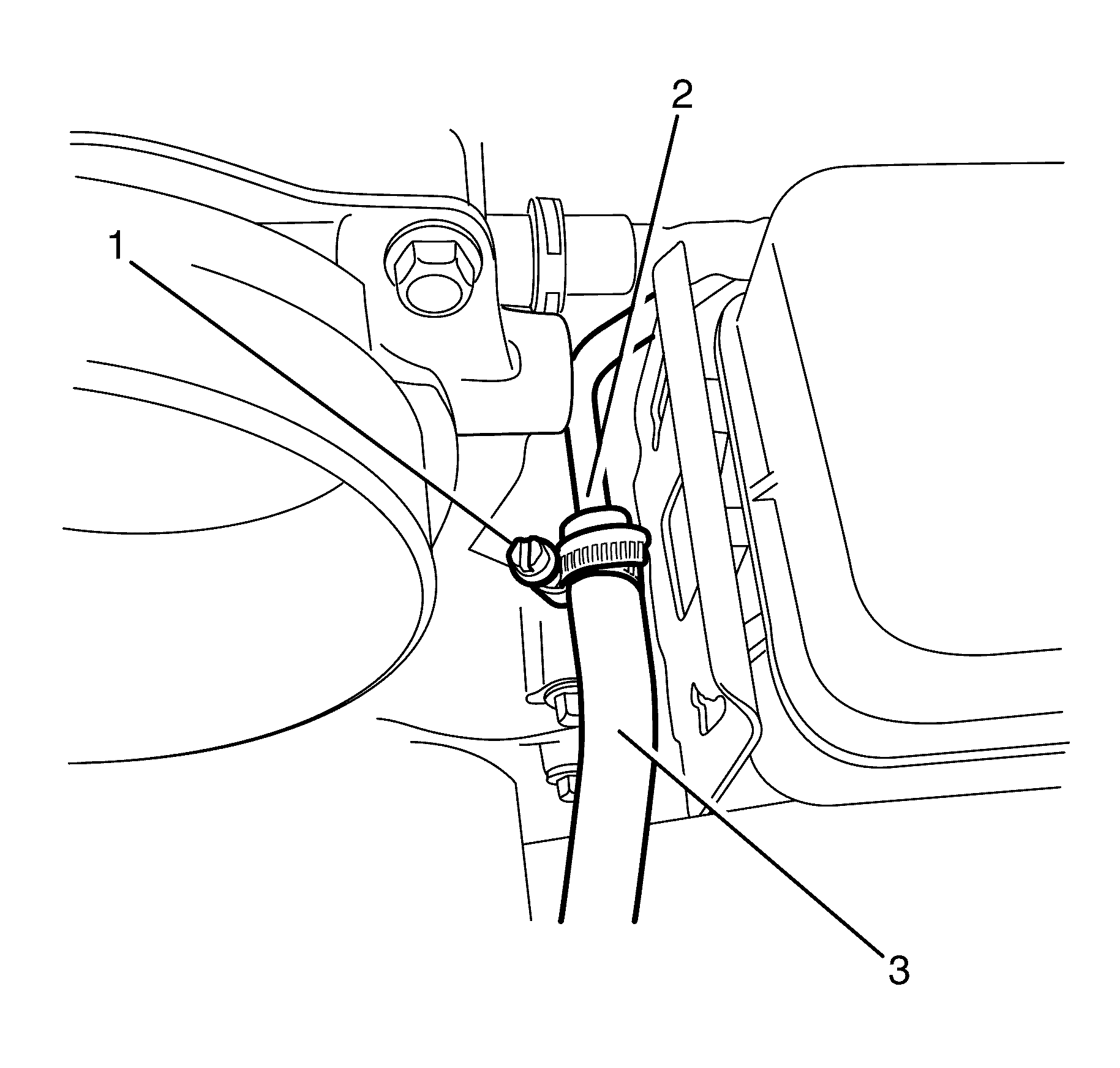
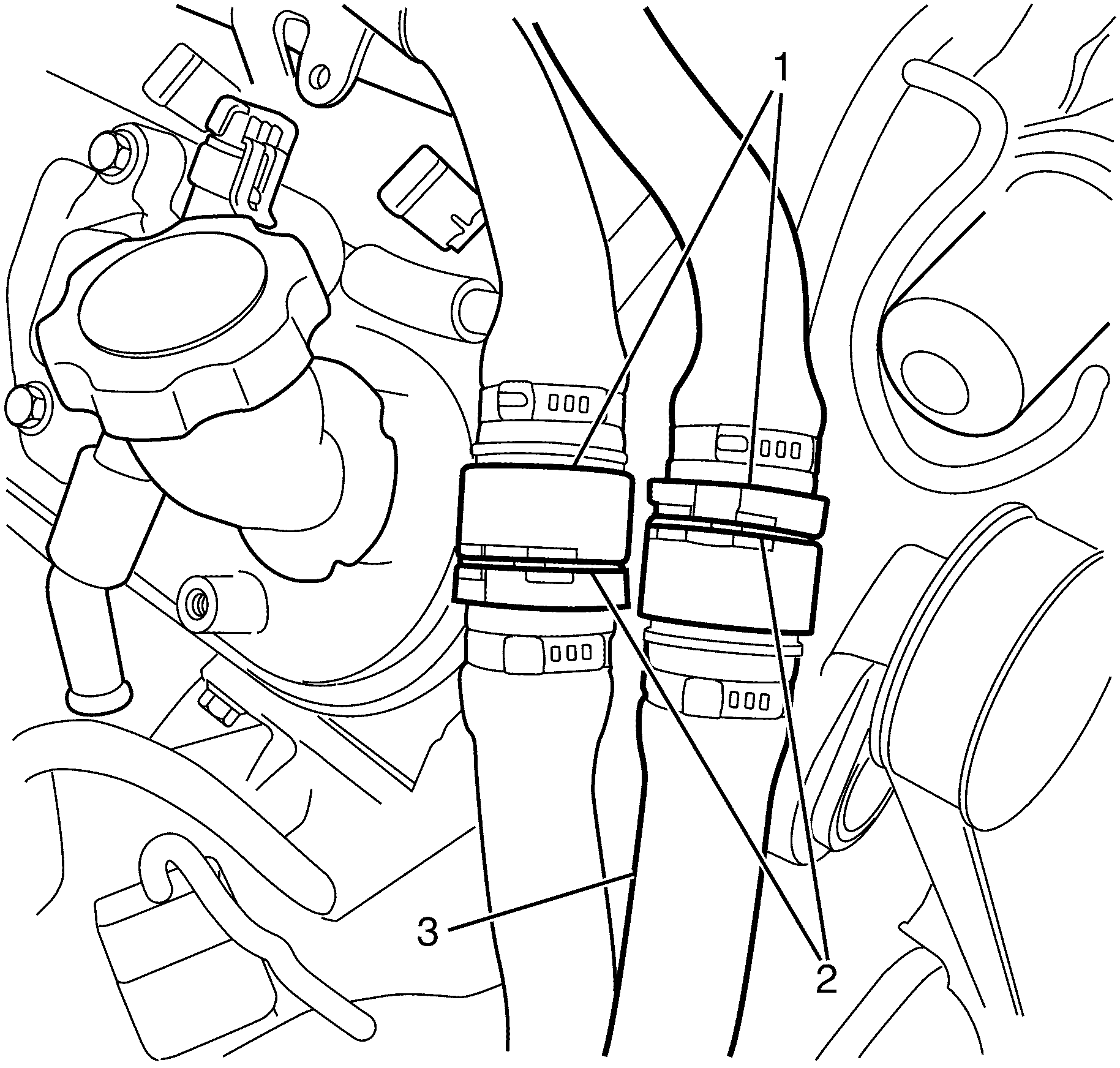
Important: Disconnect the heater hose assembly quick connect fittings (1) by releasing the retaining clips (2) using a suitable tool.
Notice: Refer to General Repair Instructions in the Preface section.
Notice: Do not touch the connector pins or soldered components on the circuit board in order to prevent possible electrostatic discharge (ESD) damage to the PCM.
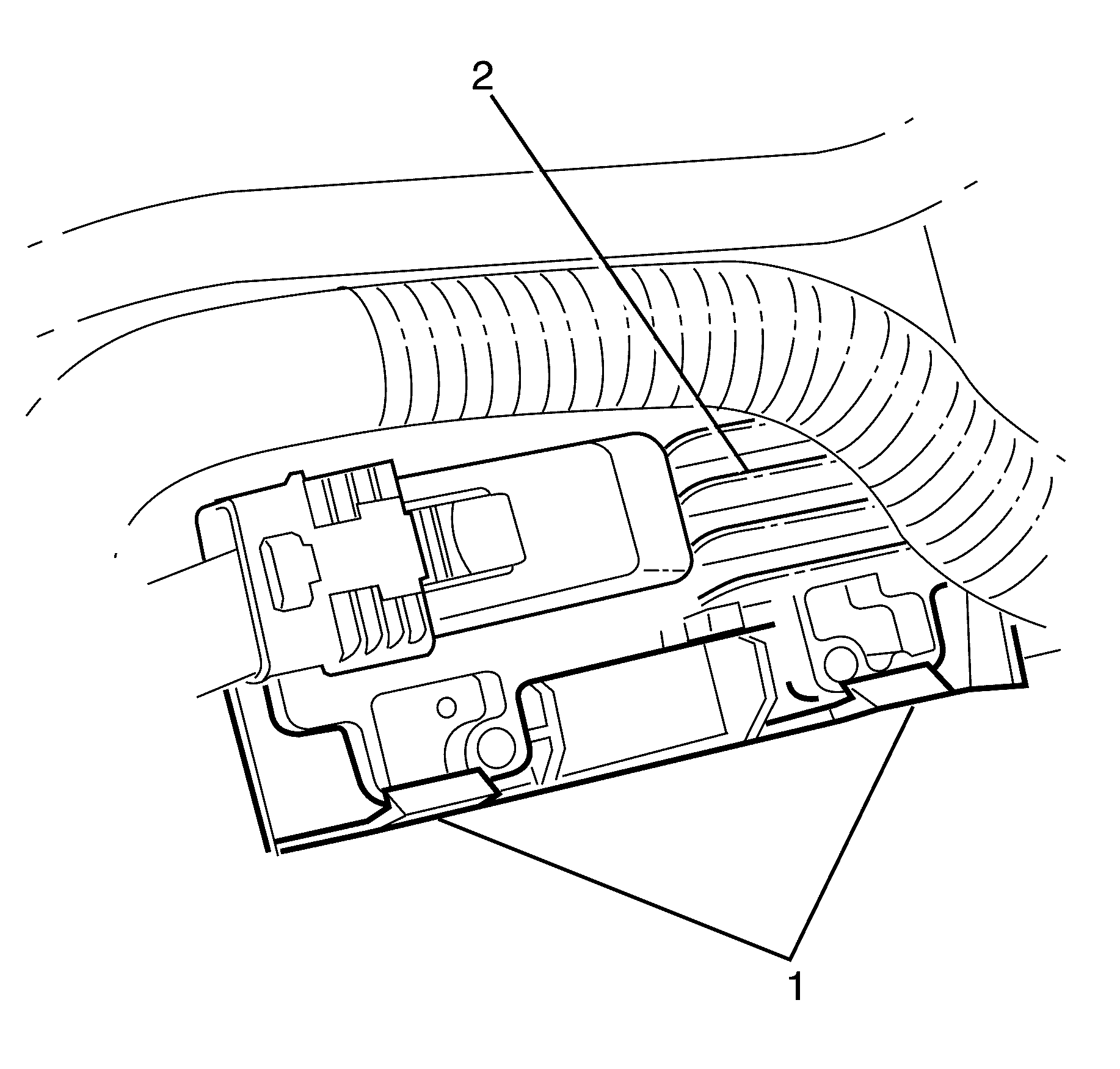
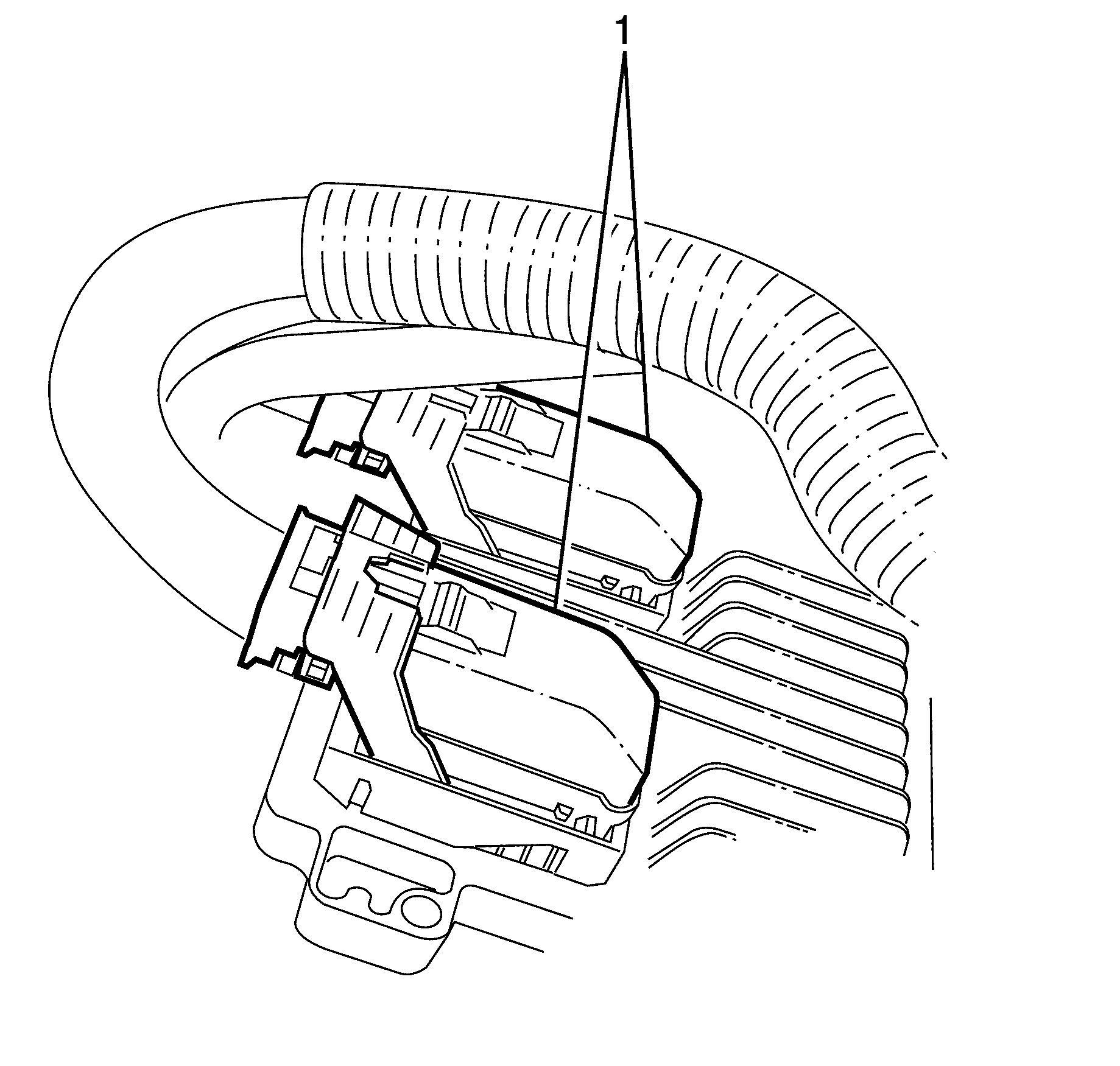
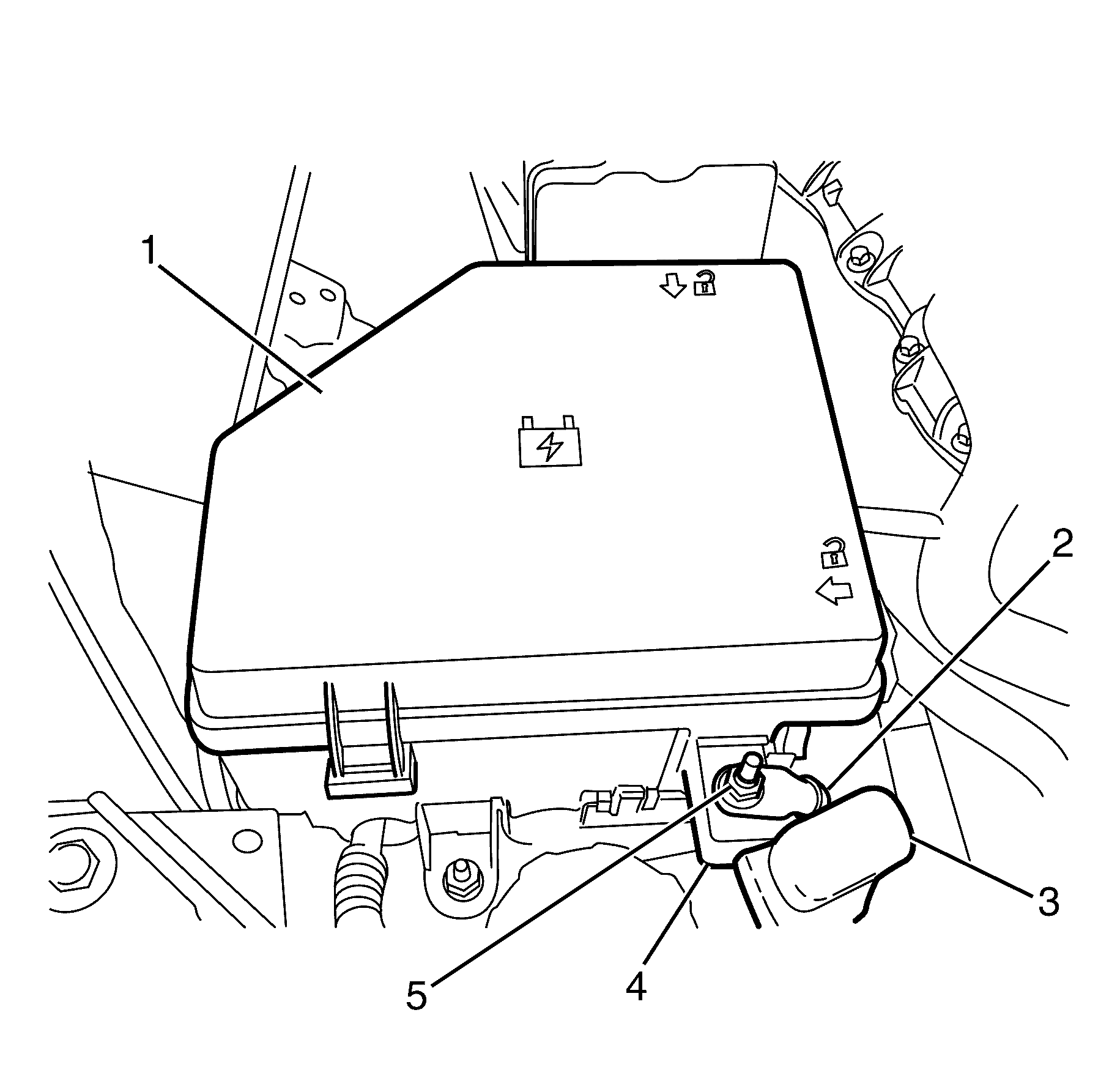
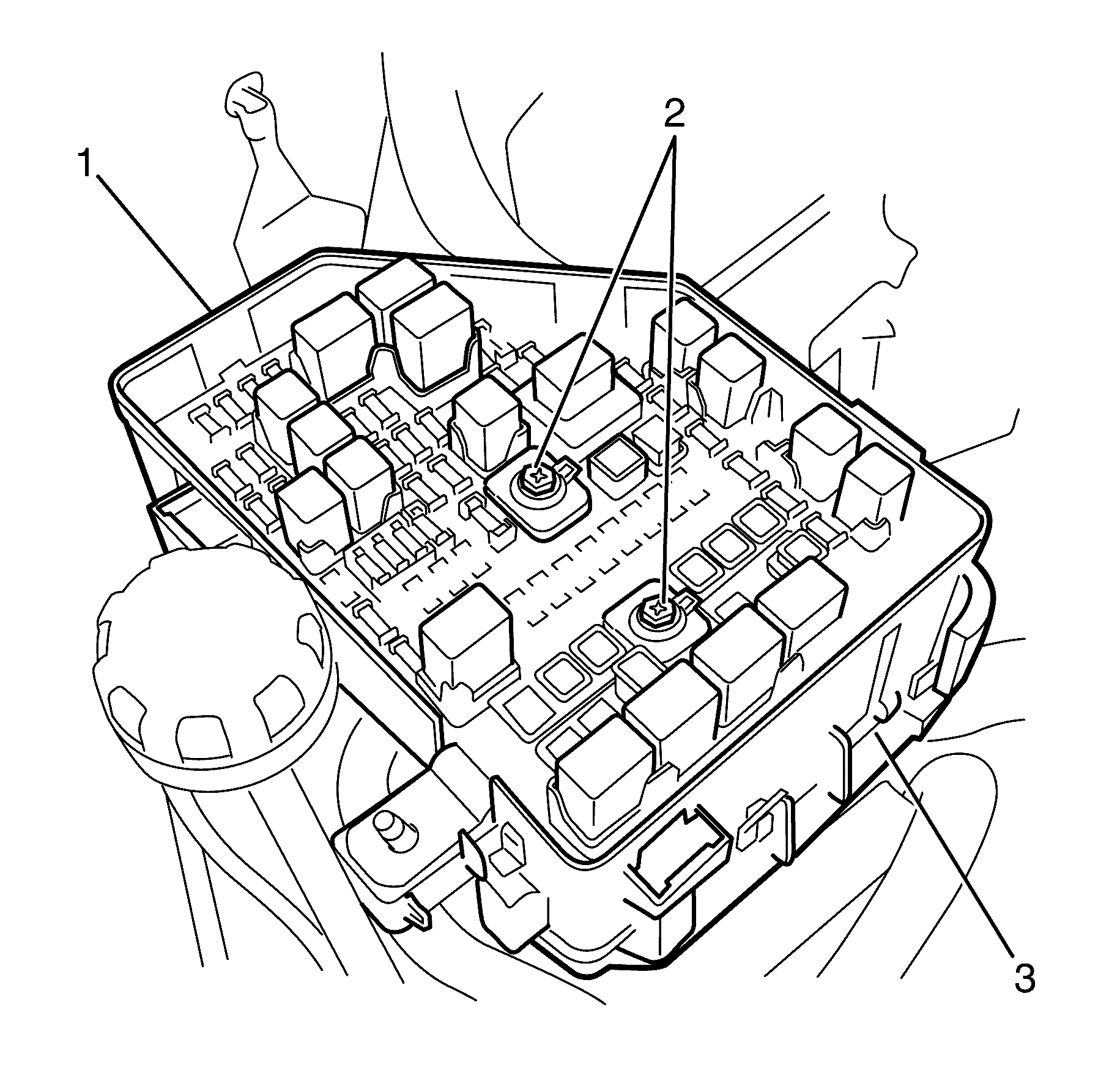
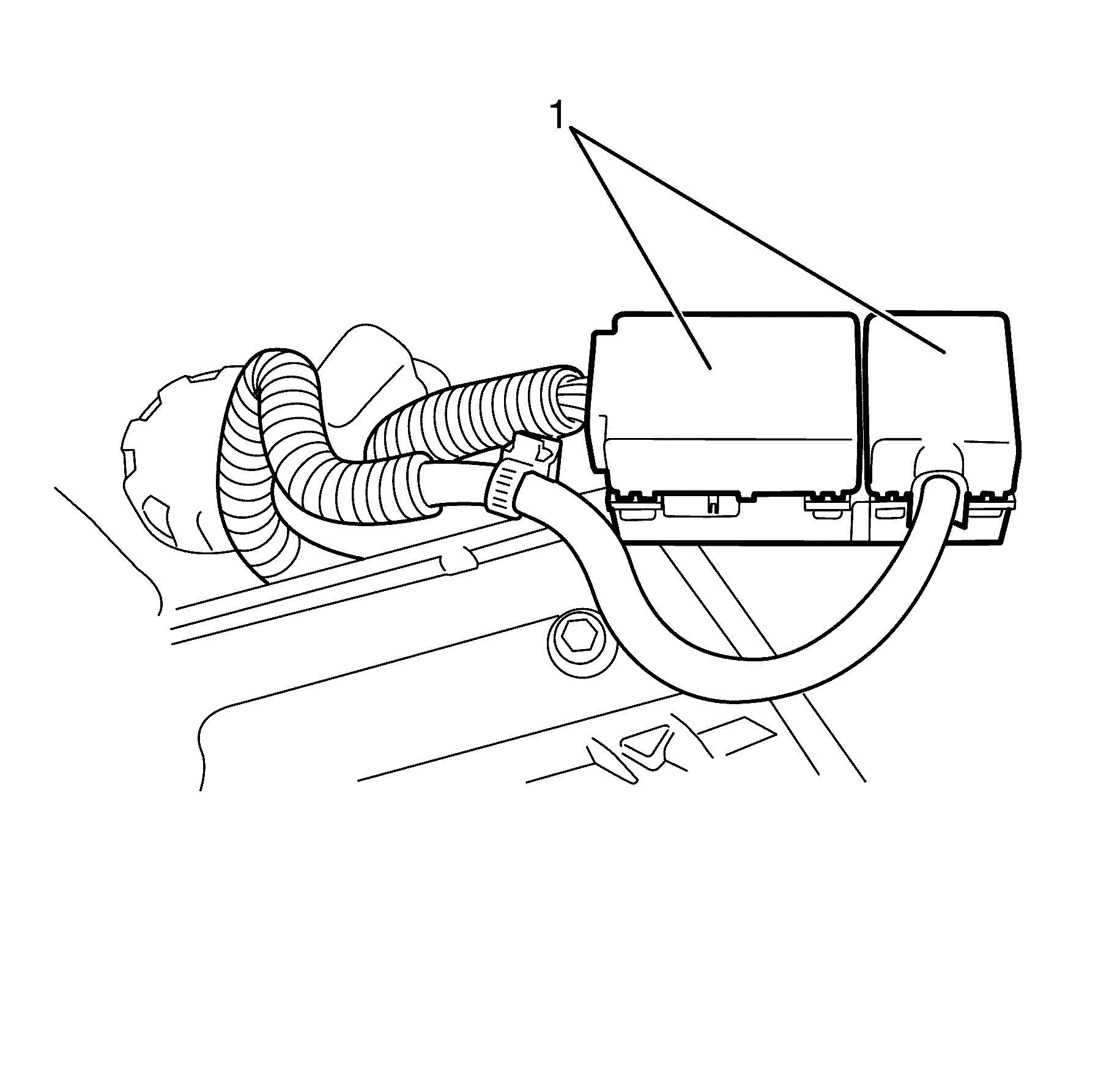
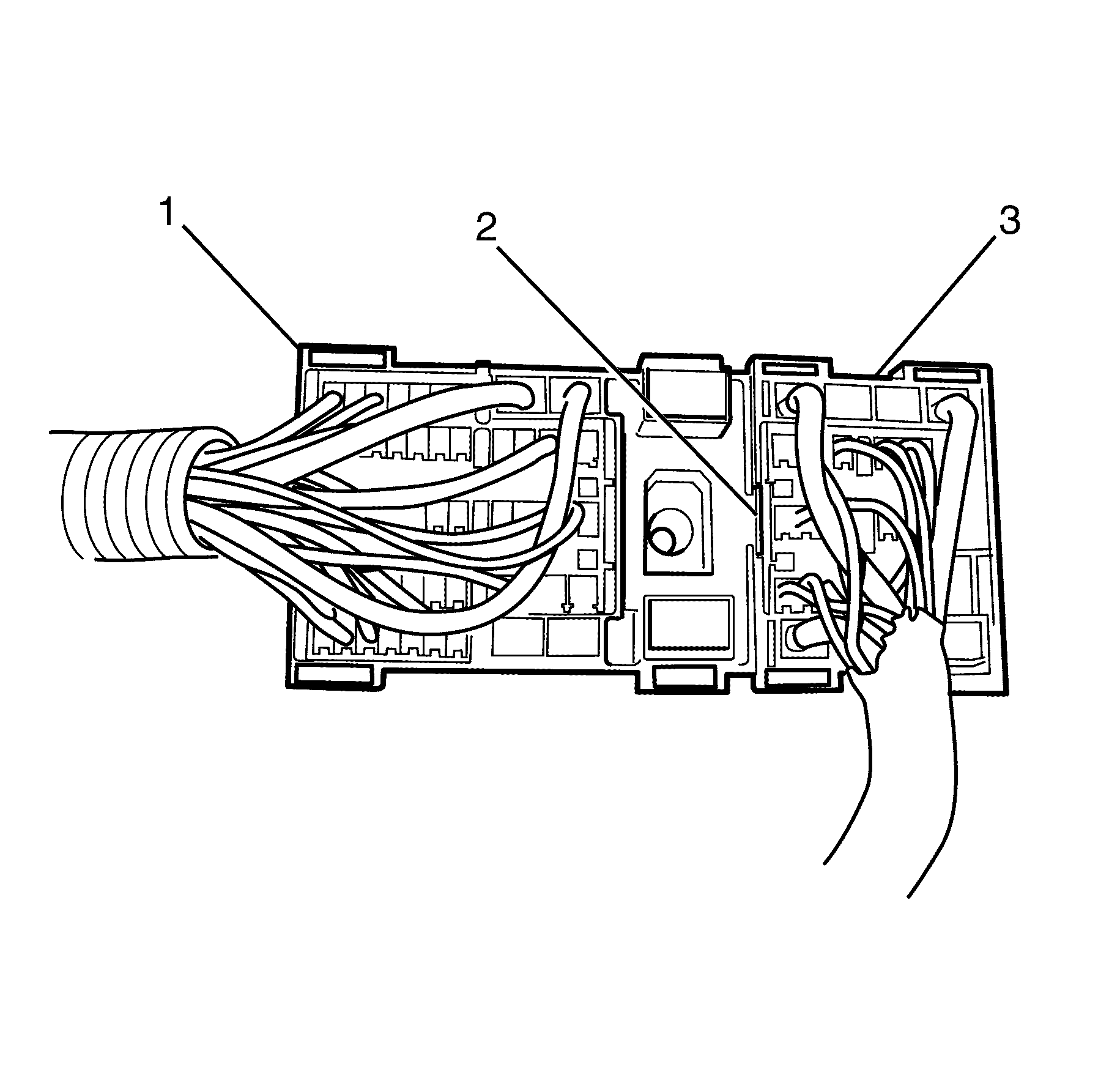
Important: Use a suitable tool to depress the connector locking tang (2), then pull the body harness connector (1) upward and the engine connector (3) downward to separate the body harness connector (1) from the engine connector (3).
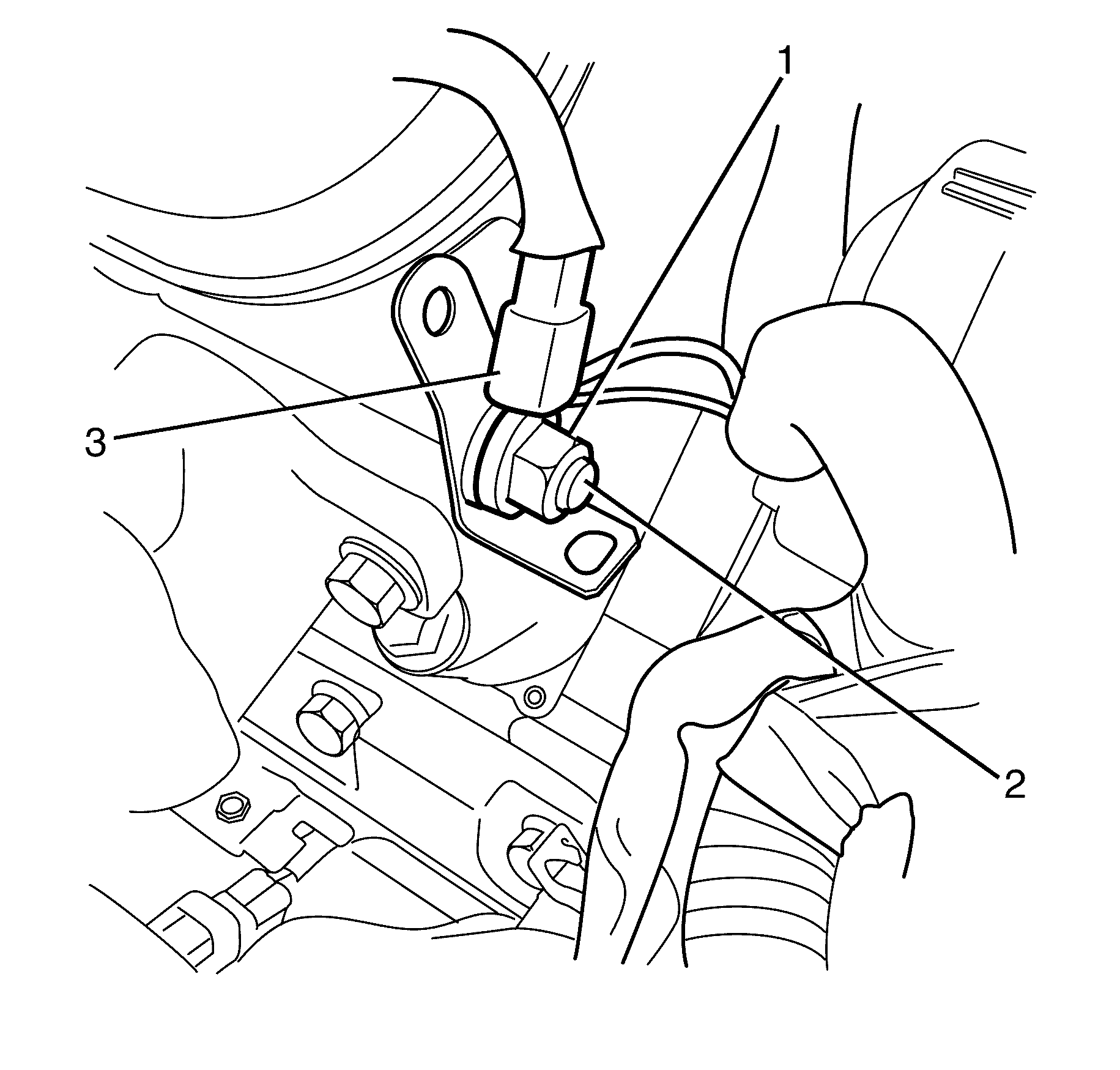
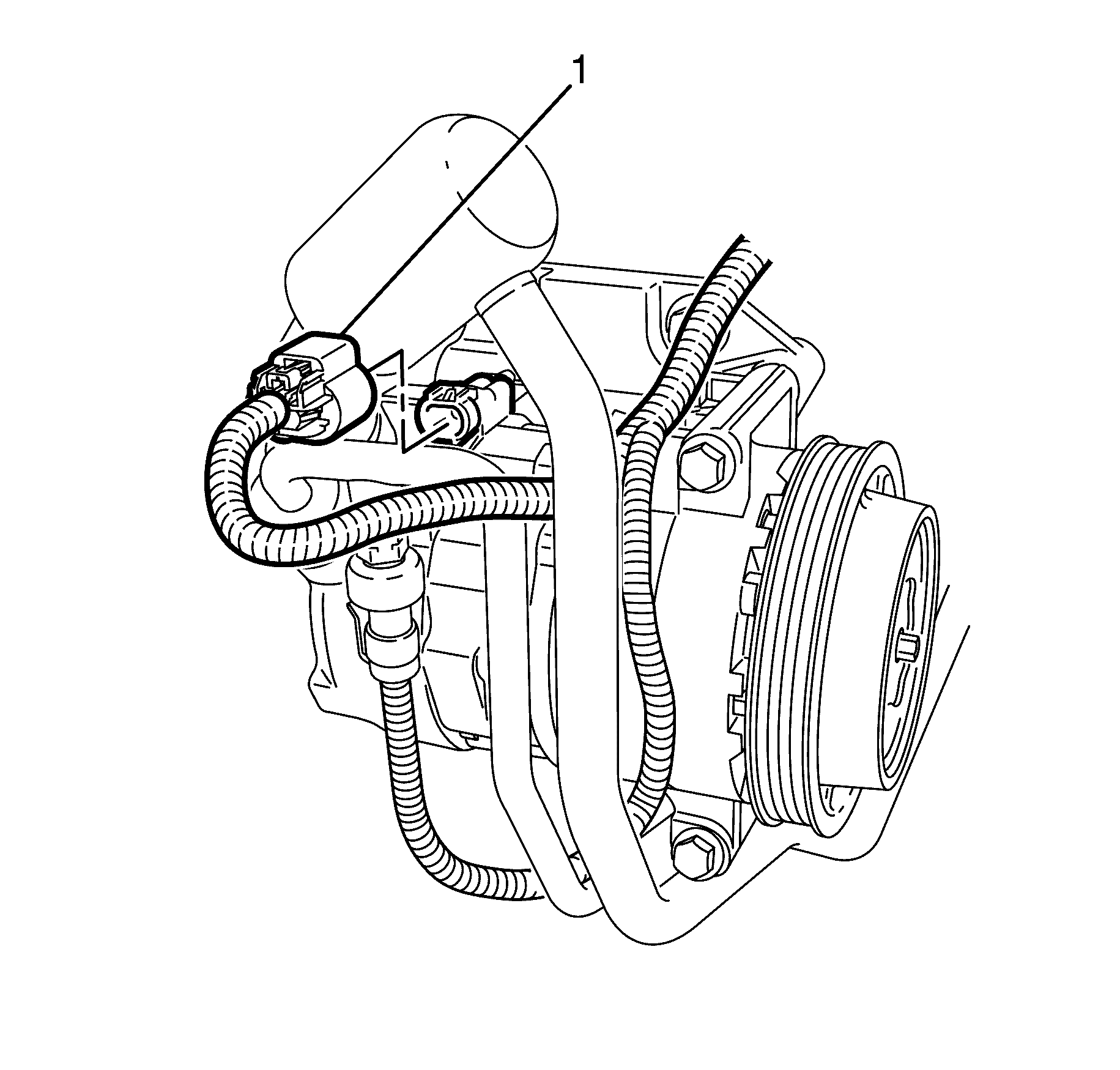
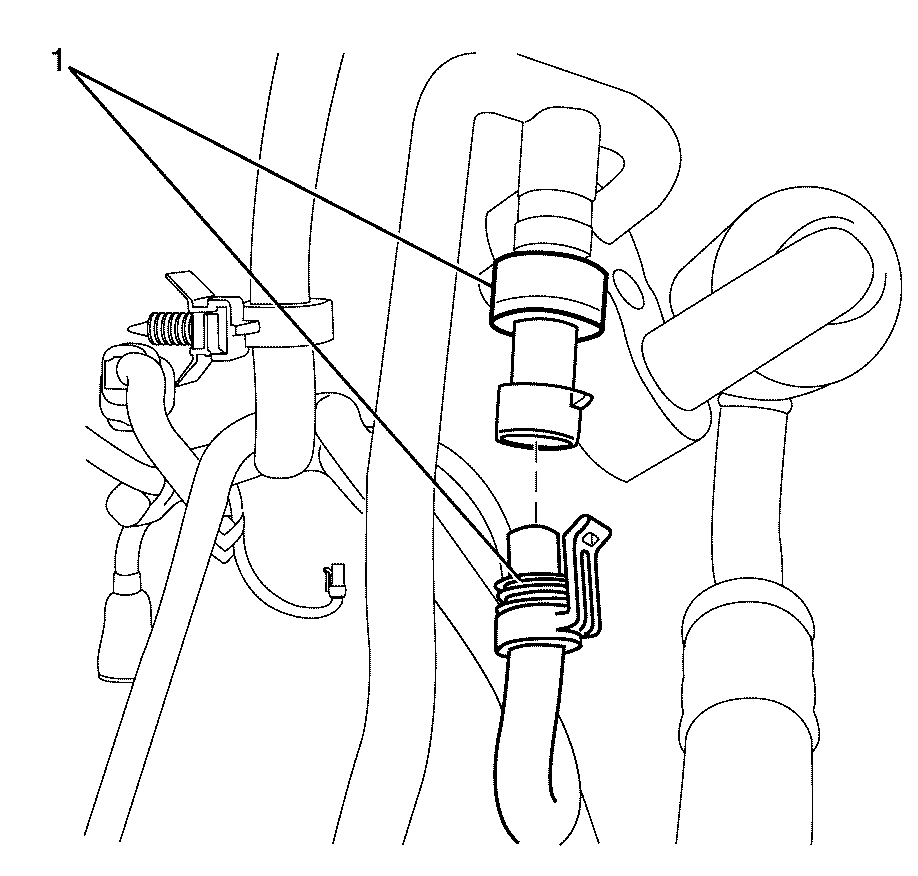
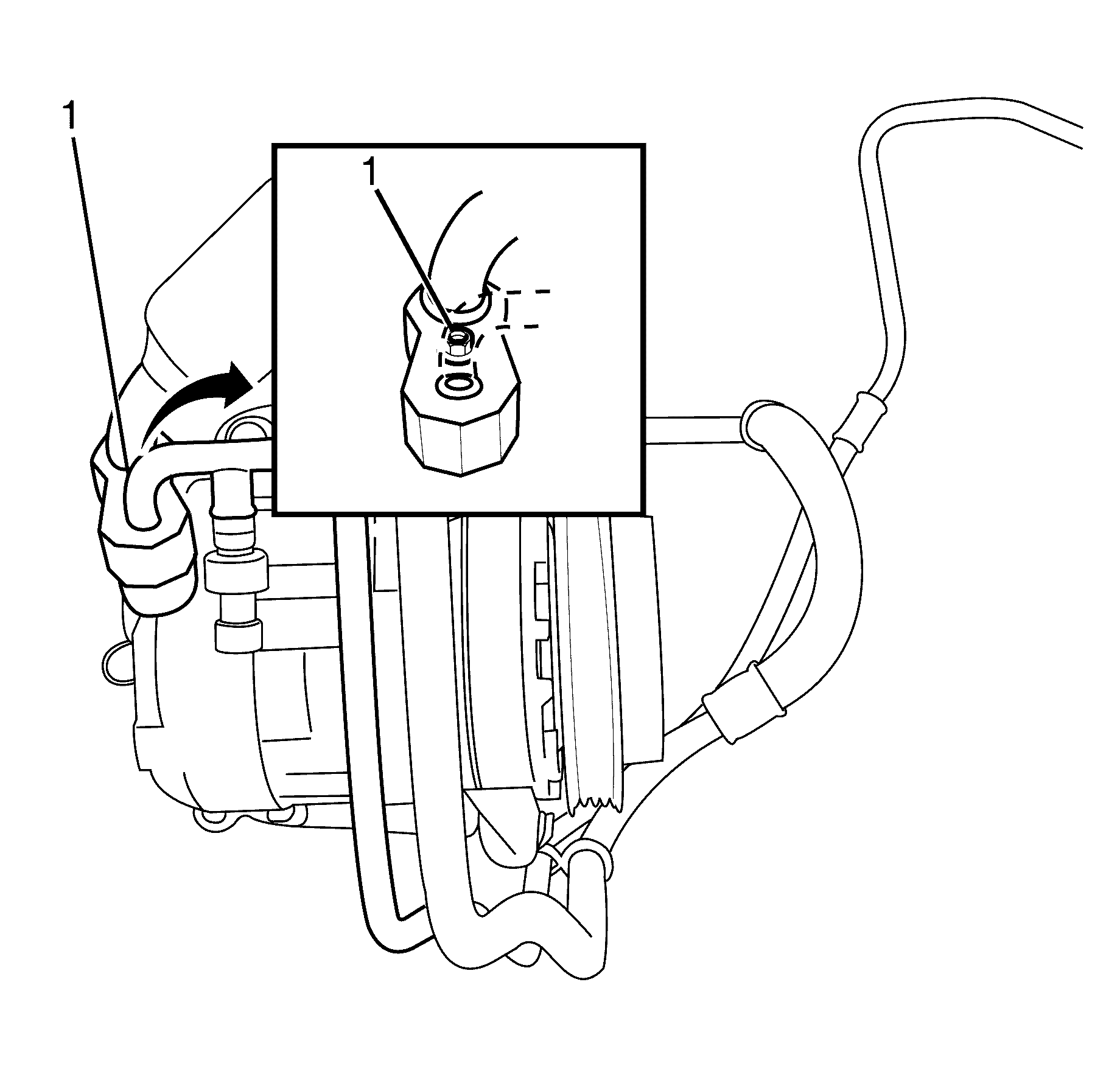
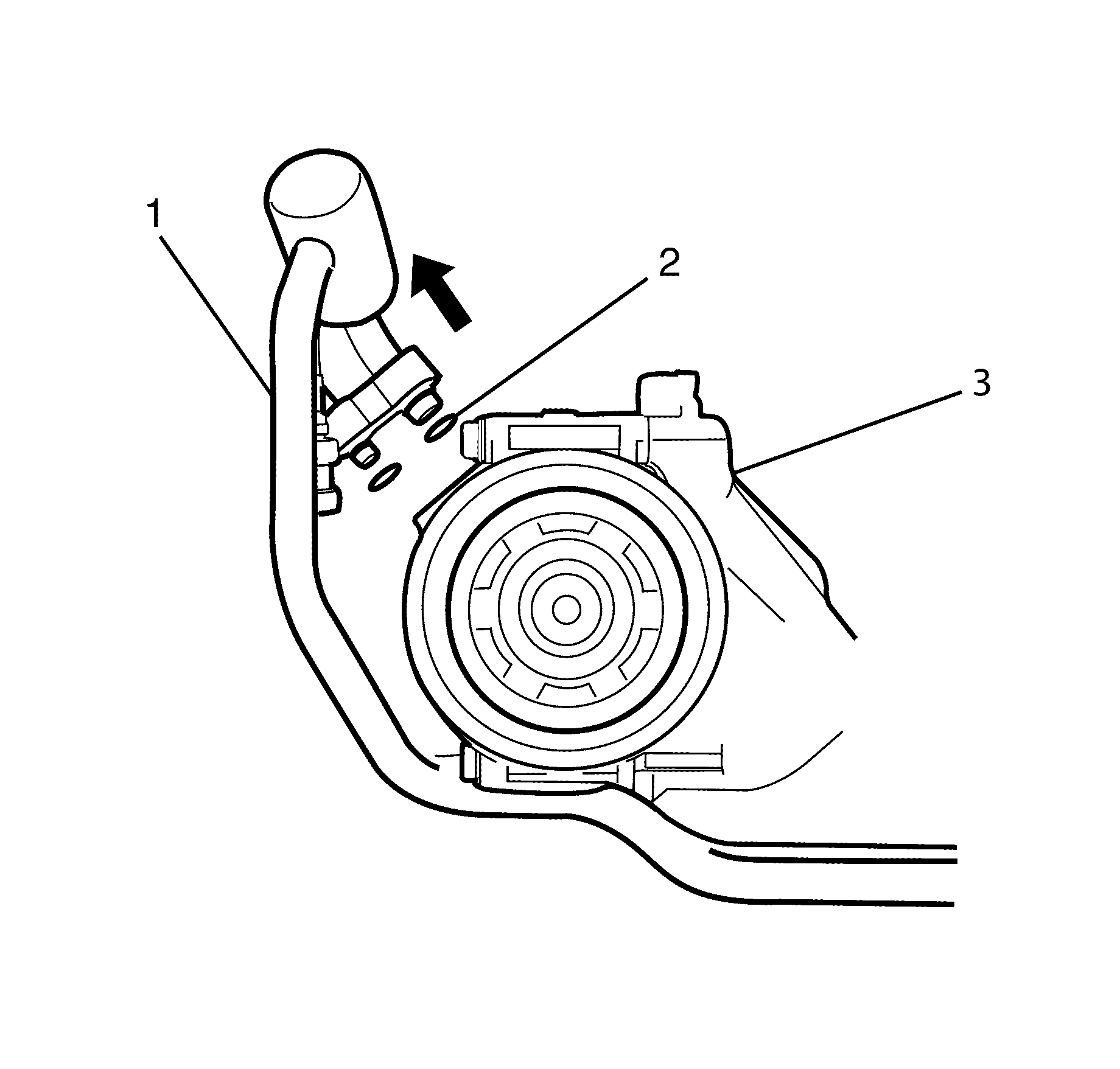
Important: Sealing washers are single use and must be discarded after use.
Important: Seal pipes immediately to prevent absorption of moisture from the atmosphere.
Important: The plugs for A/C compressor ports must be sufficient to stop oil escaping when tilting A/C compressor for removal.
Discard the port sealing washers (2).
Important: Cap or plug the ports immediately to prevent absorption of moisture from the atmosphere.
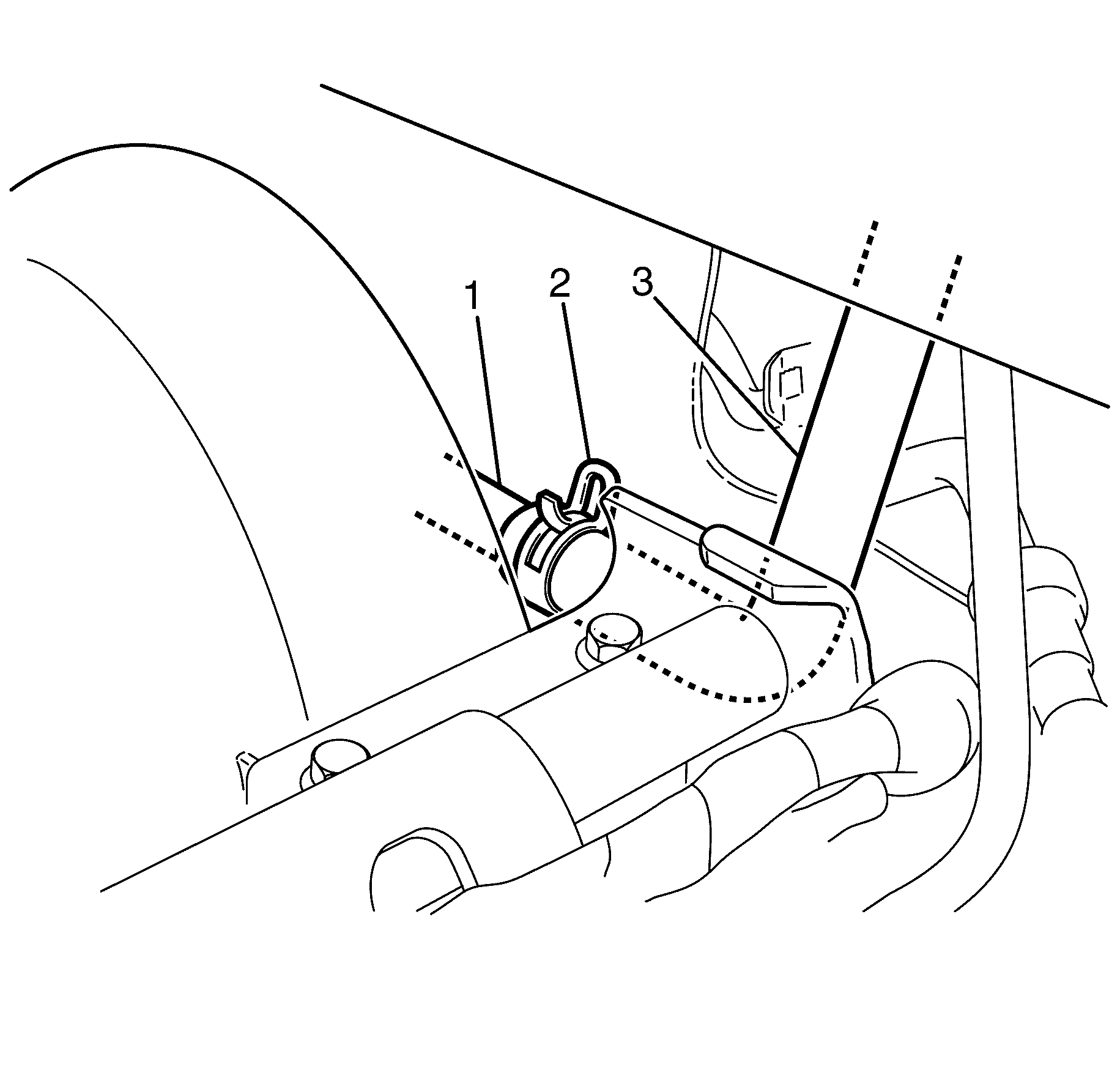
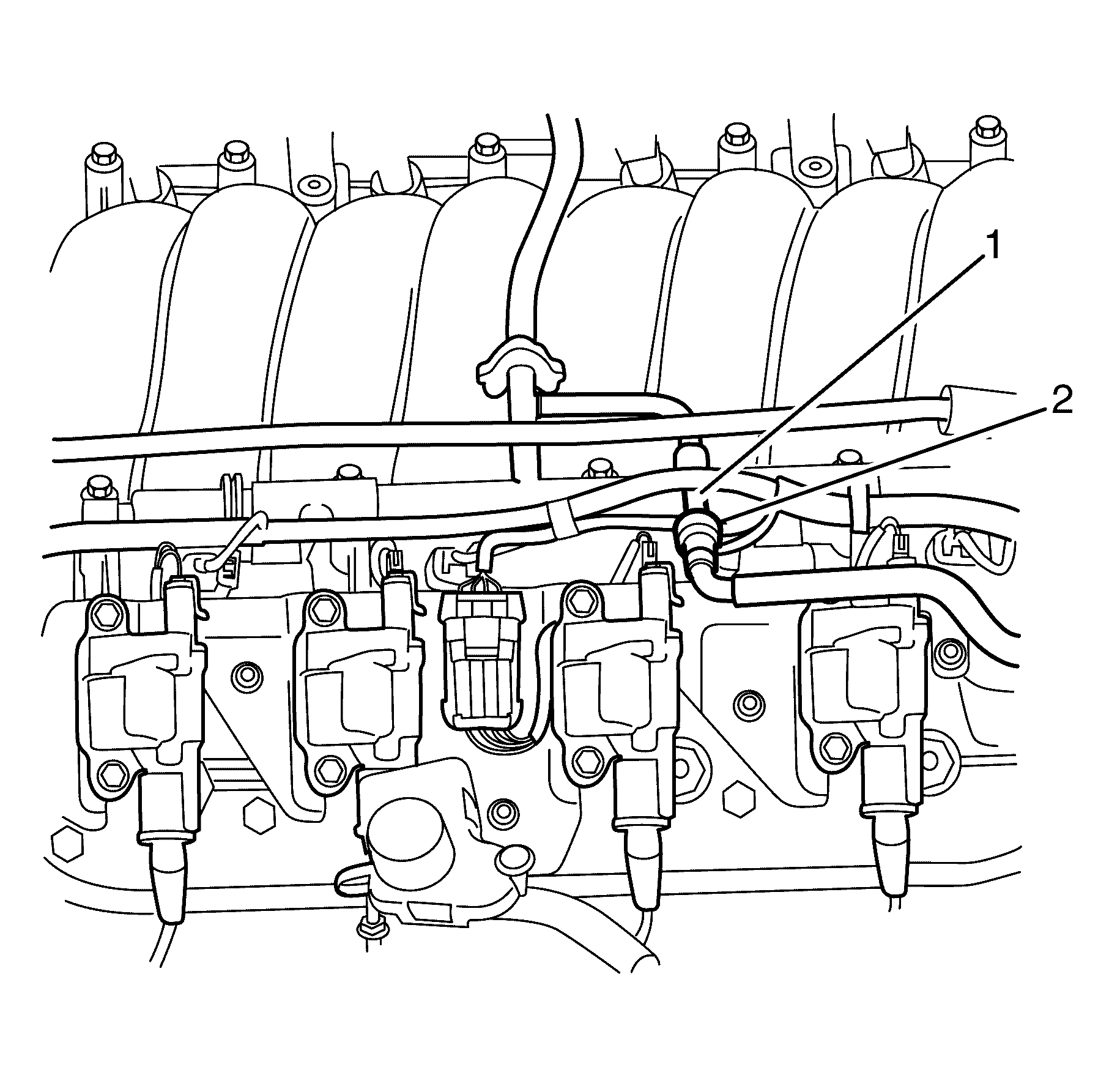
Important: Plug or cap the fuel feed pipe (2) and fuel rail tube (1) ends to prevent fuel leaks and/or contamination.


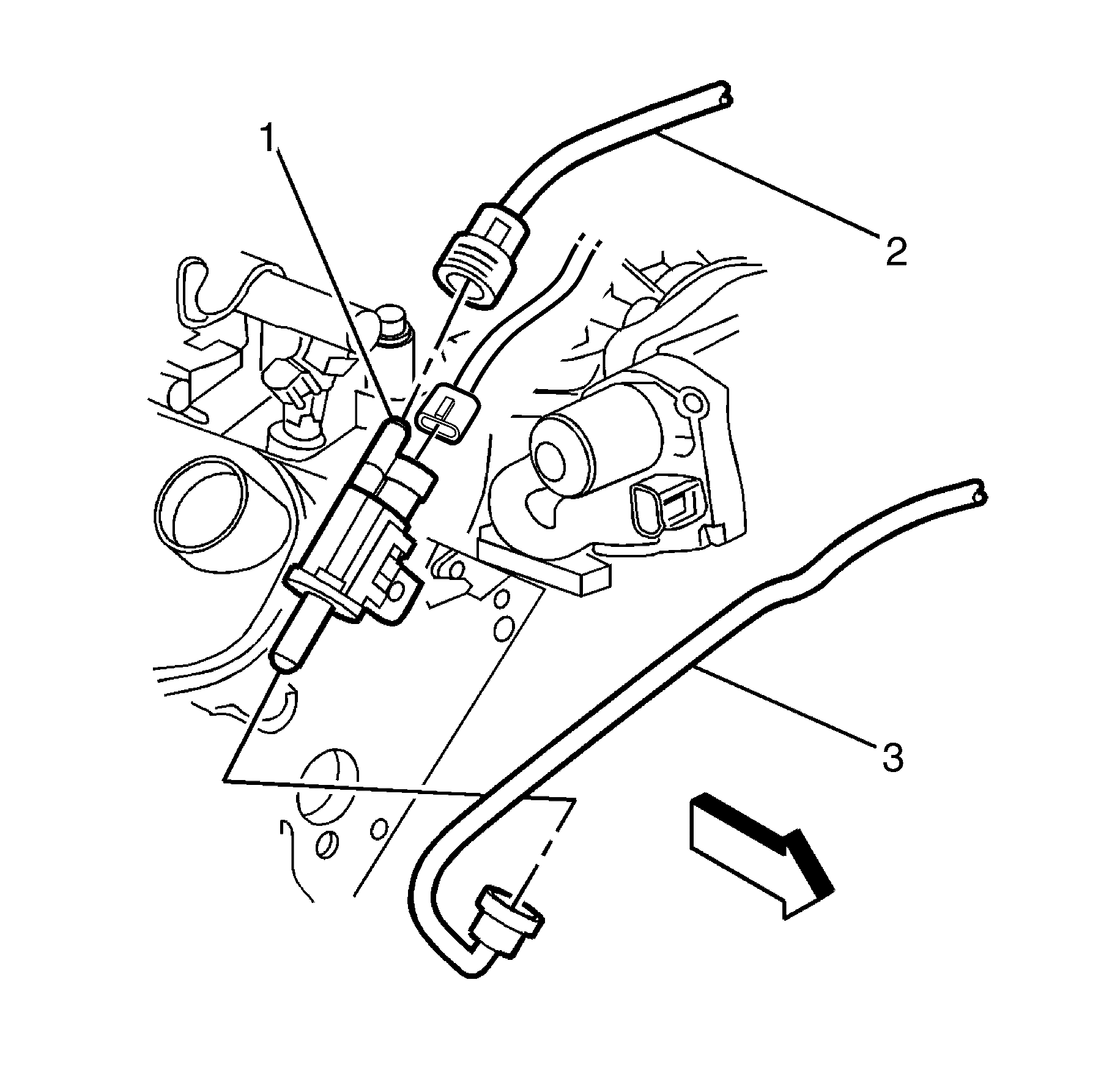
Important: Plug or cap the throttle body to EVAP purge valve hose (3) and EVAP purge valve (1) ends to prevent fuel leaks and/or contamination.
Important: Plug or cap the EVAP purge valve to fuel tank hose (2) and EVAP purge valve (1) ends to prevent fuel leaks and/or contamination.

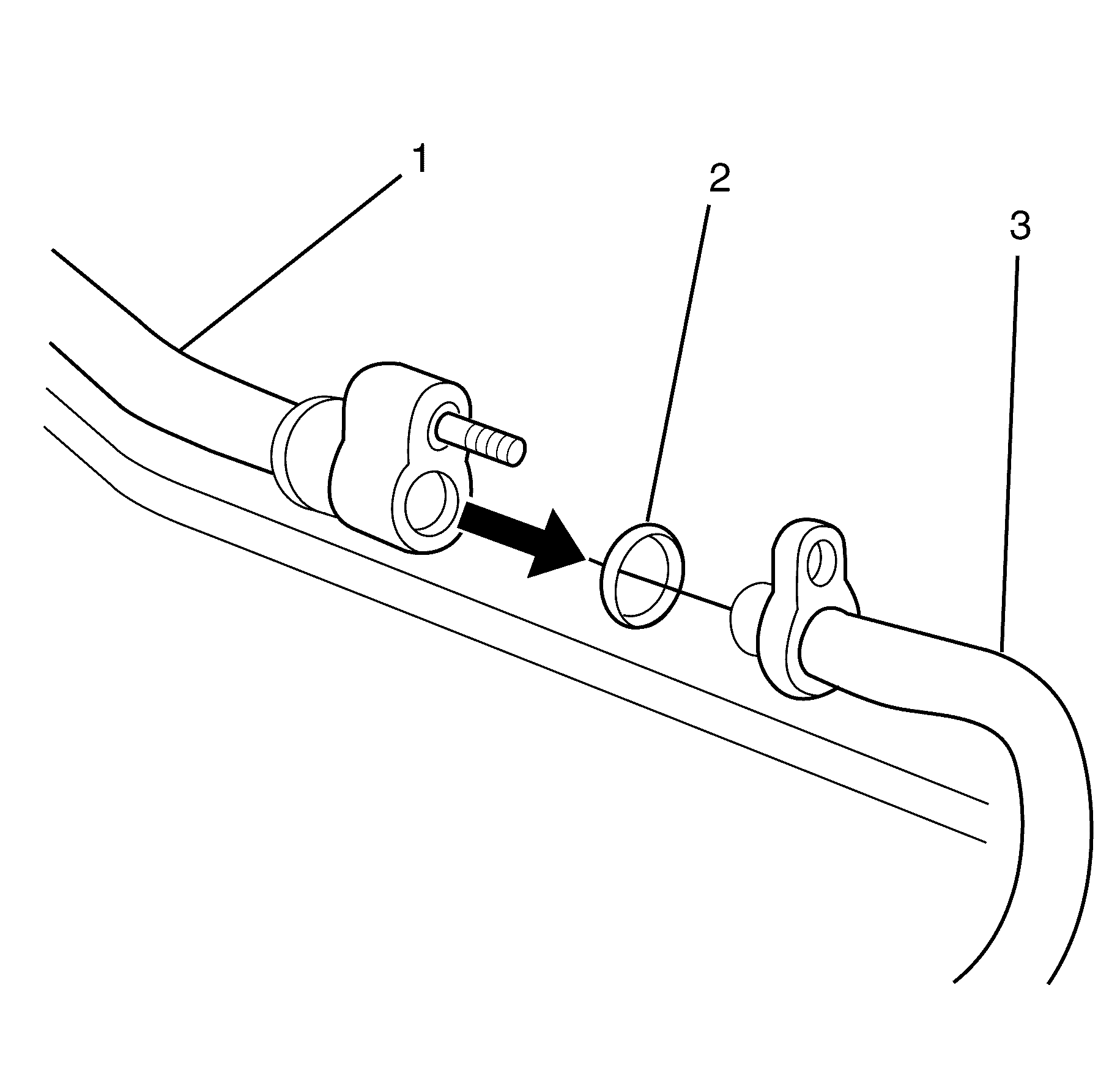
Important: Plug or cap the A/C suction pipe ends (1 and 3) immediately to prevent contamination and absorption of moisture from the atmosphere.
Important: The A/C suction pipe sealing O-ring (2) is a single use component and will not reseal. Install a NEW A/C suction pipe sealing O-ring (2) whenever the upper A/C suction pipe (1) is removed from the lower A/C suction pipe (3).
Discard the A/C suction pipe sealing O-ring (2).
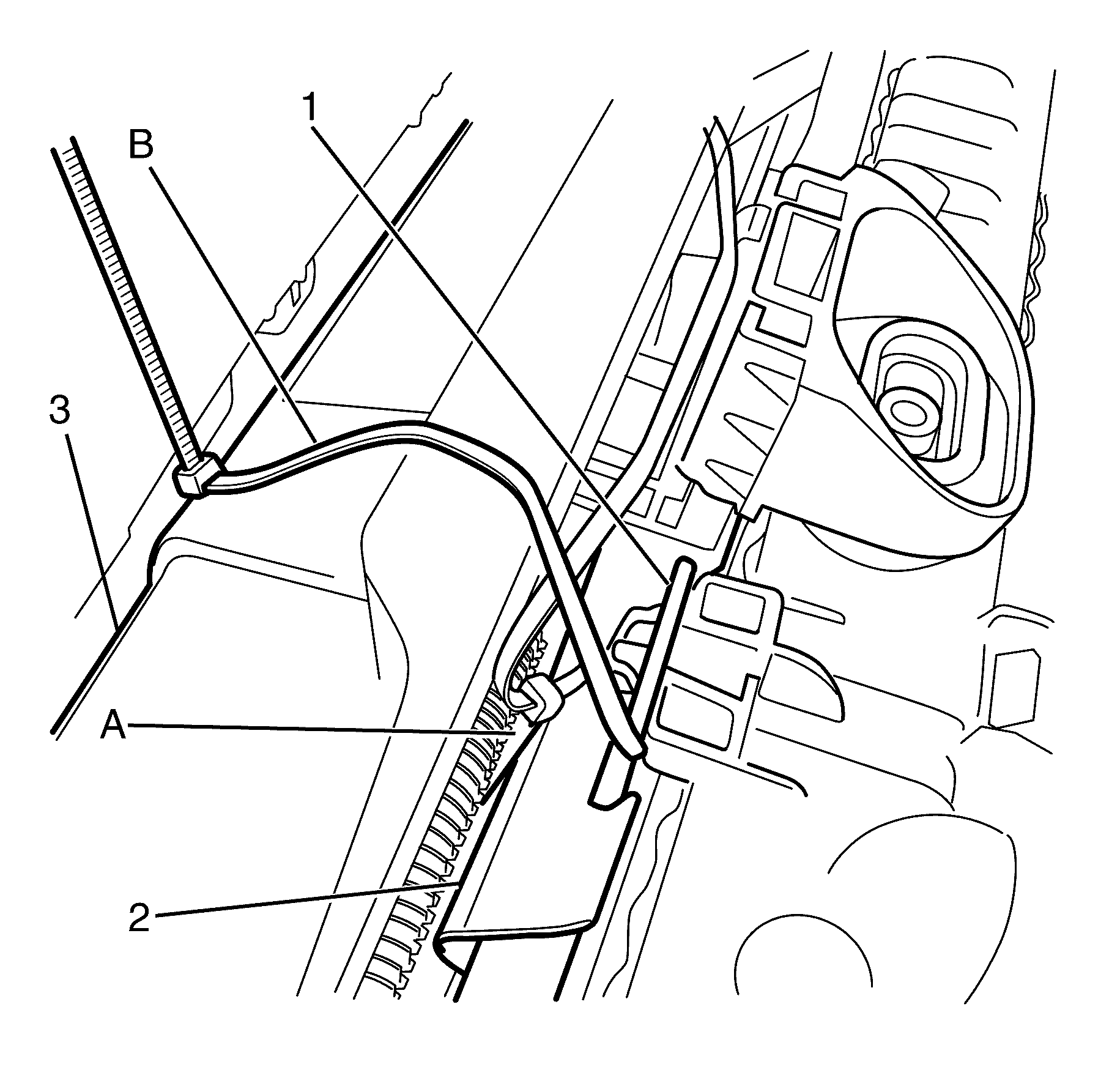
Important: It is necessary to secure the radiator and condenser assembly (2) to the front end assembly (3) as the radiator and condenser assembly is supported to the subframe.
Important: Thread zip tie A around the front end assembly and zip tie B through the radiator and condenser mount (1). Insert zip tie A into the retainer of zip tie B and insert zip tie B into the retainer of zip tie A.
Important: Ignore steps 47 - 49 for vehicles equipped with a manual transmission.
Important: The flexible hoses are not serviced separately. Therefore if the hose's require replacement, then the hose and radiator to hose cooler hose assembly must be fitted.
Important: When removal is complete plug hose openings with a clean lint free cloth to prevent foreign matter entry.
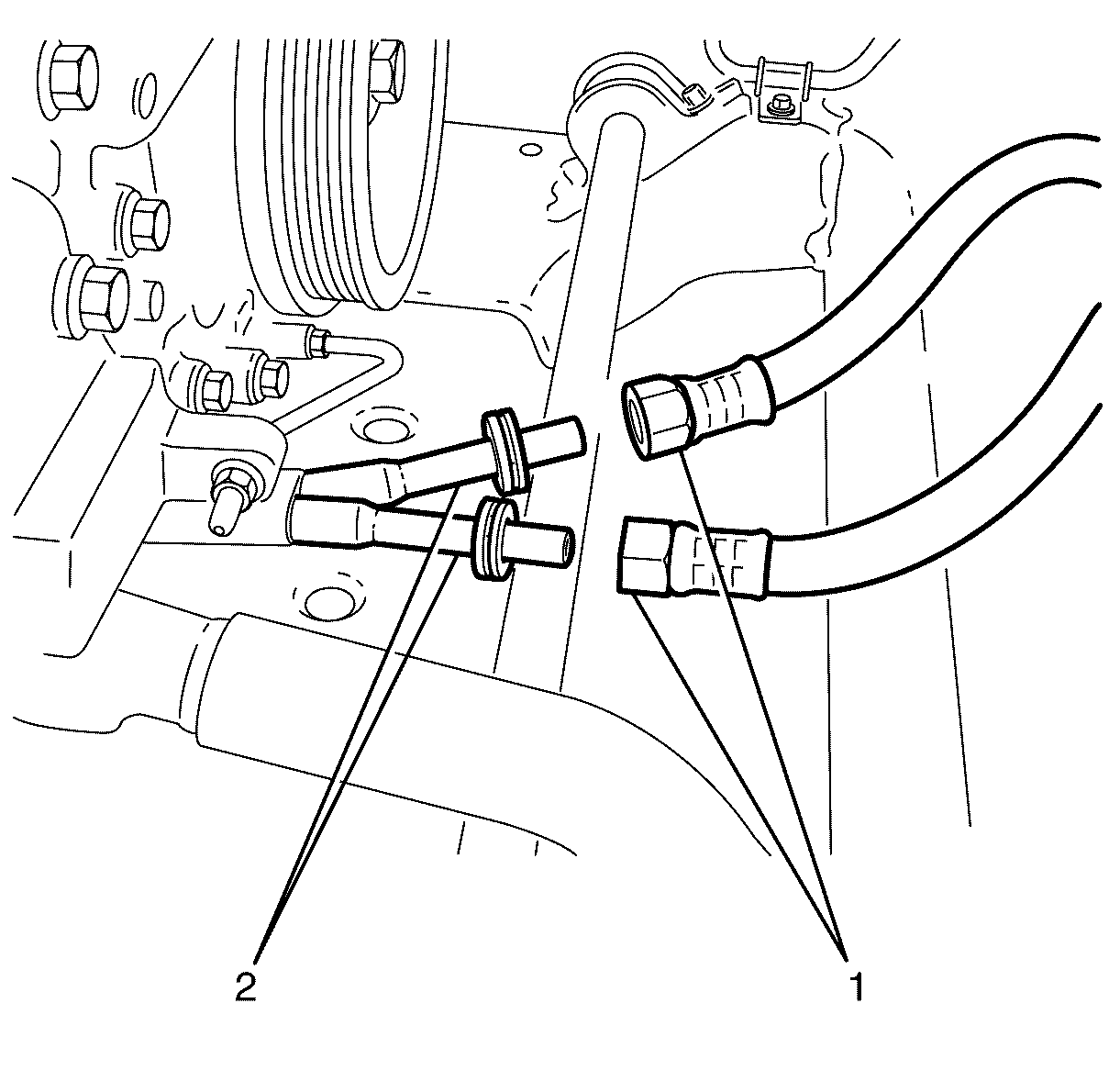
| • | Open release tool AU525 then close and clip around the hose to be disconnected. |
| • | While holding the flexible hose (1) push the hose inwards with one hand, then pull back to separate from the steel hose piping (2). |
| • | Repeat for the second fitting if required. |
Caution: Refer to Safety Glasses Caution in the Preface section.
Caution: Refer to Vehicle Lifting Caution in the Preface section.
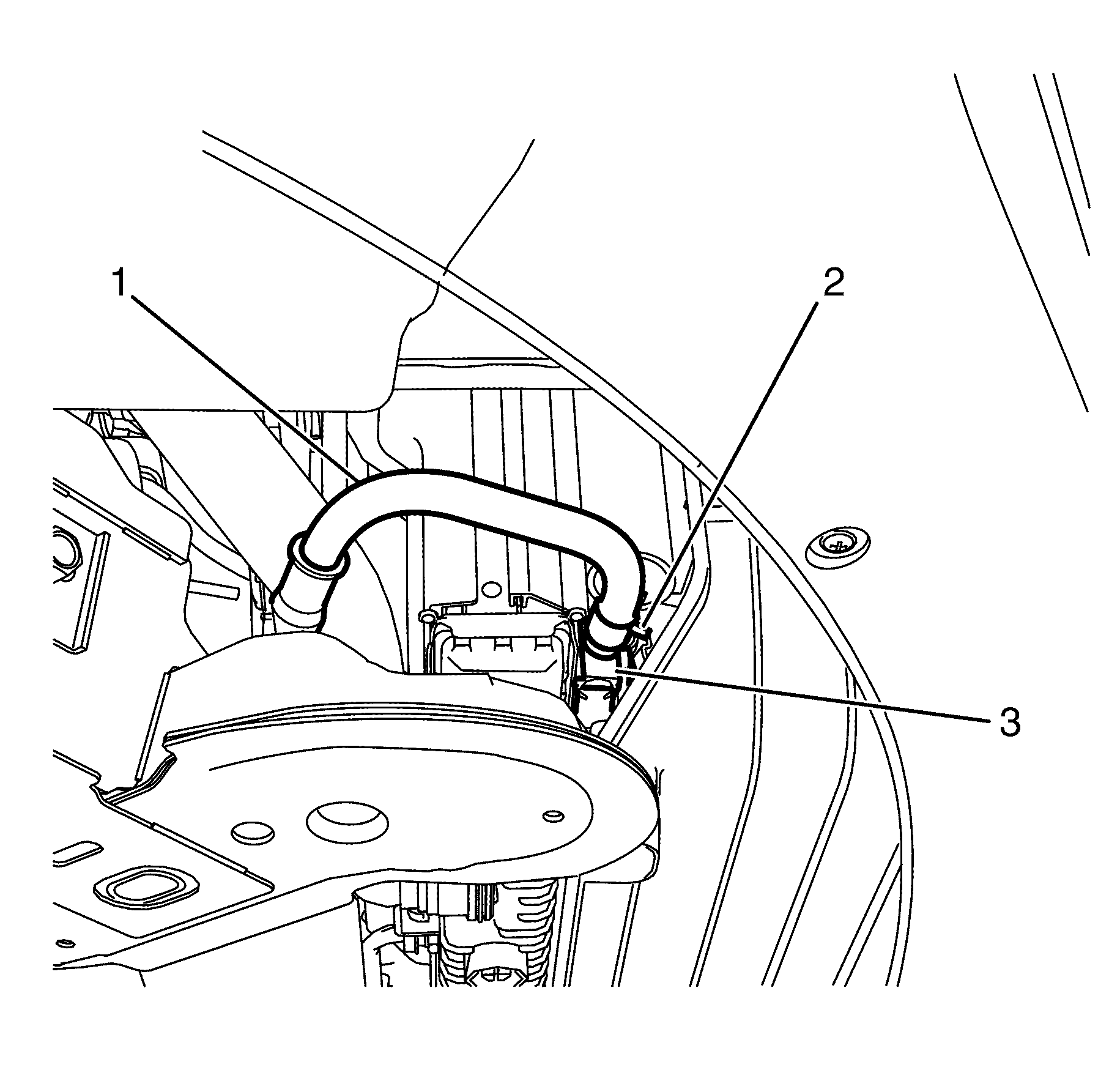
Important: The power steering cooler (3) must be plugged to prevent the entry of foreign particles into the power steering system.
Plug the power steering cooler (3) and power steering gear outlet hose (1).
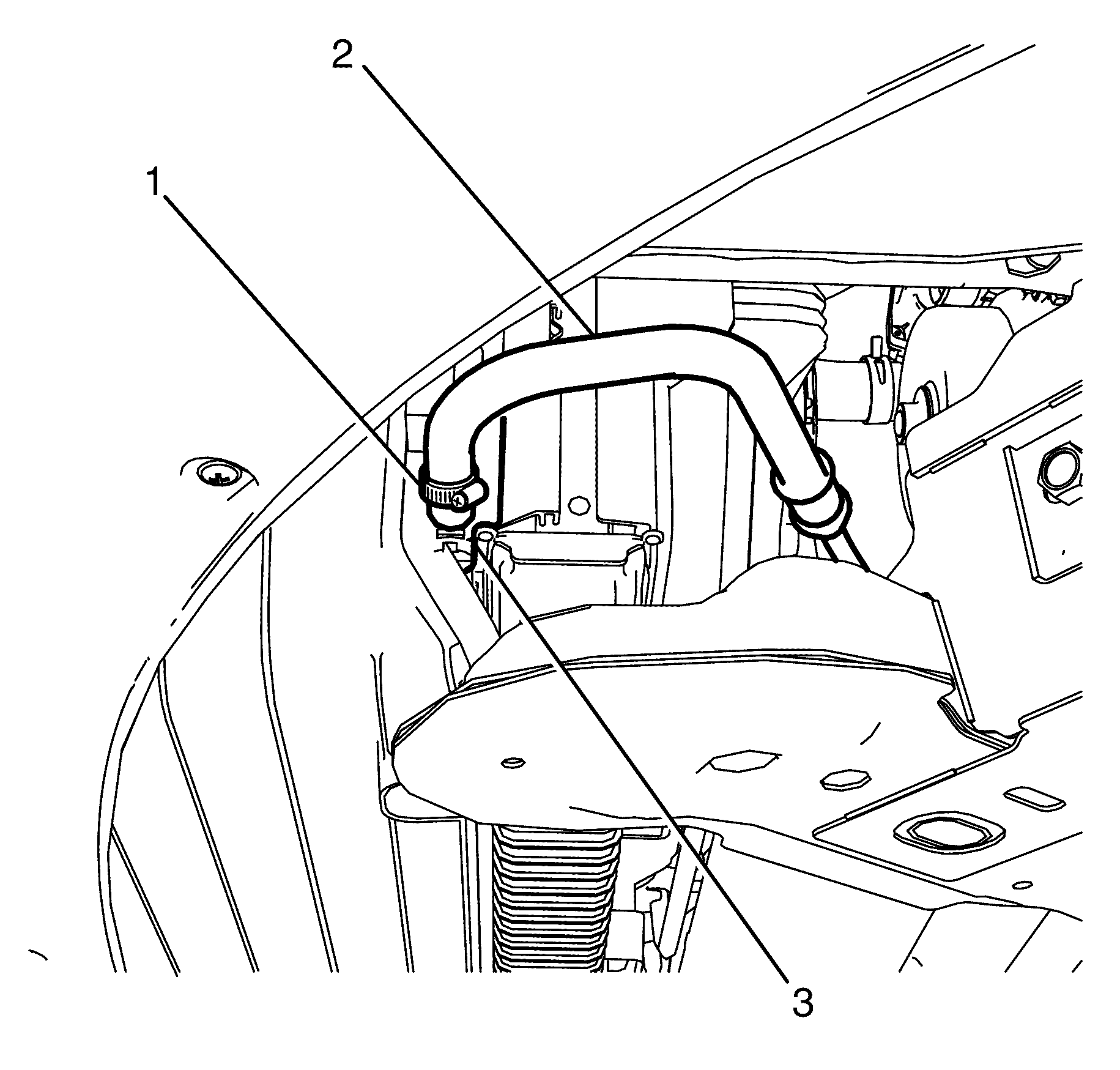
Important: The power steering cooler (3) must be plugged to prevent the entry of foreign particles into the power steering system.
Plug the power steering cooler (3) and power steering reservoir inlet hose (2).

Important: Ignore steps 60 to 62 for vehicles fitted with an manual transmission.
Important: Ignore steps 62 to 65 for vehicles fitted with an automatic transmission .
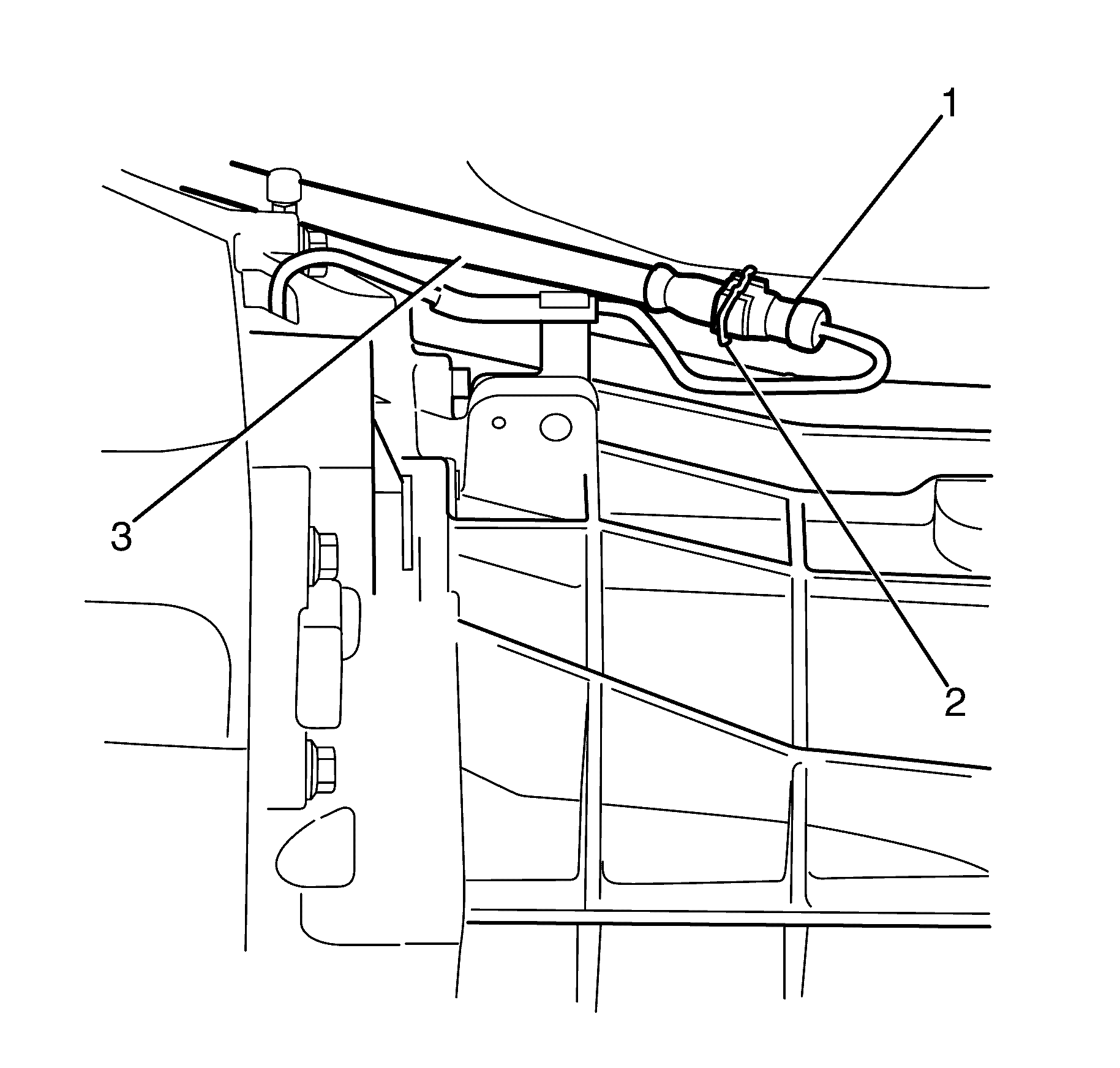
Important: Use a suitable tool to remove the flexible hose securing clip (2), take care not to lose the flexible hose securing clip (2) on removal.
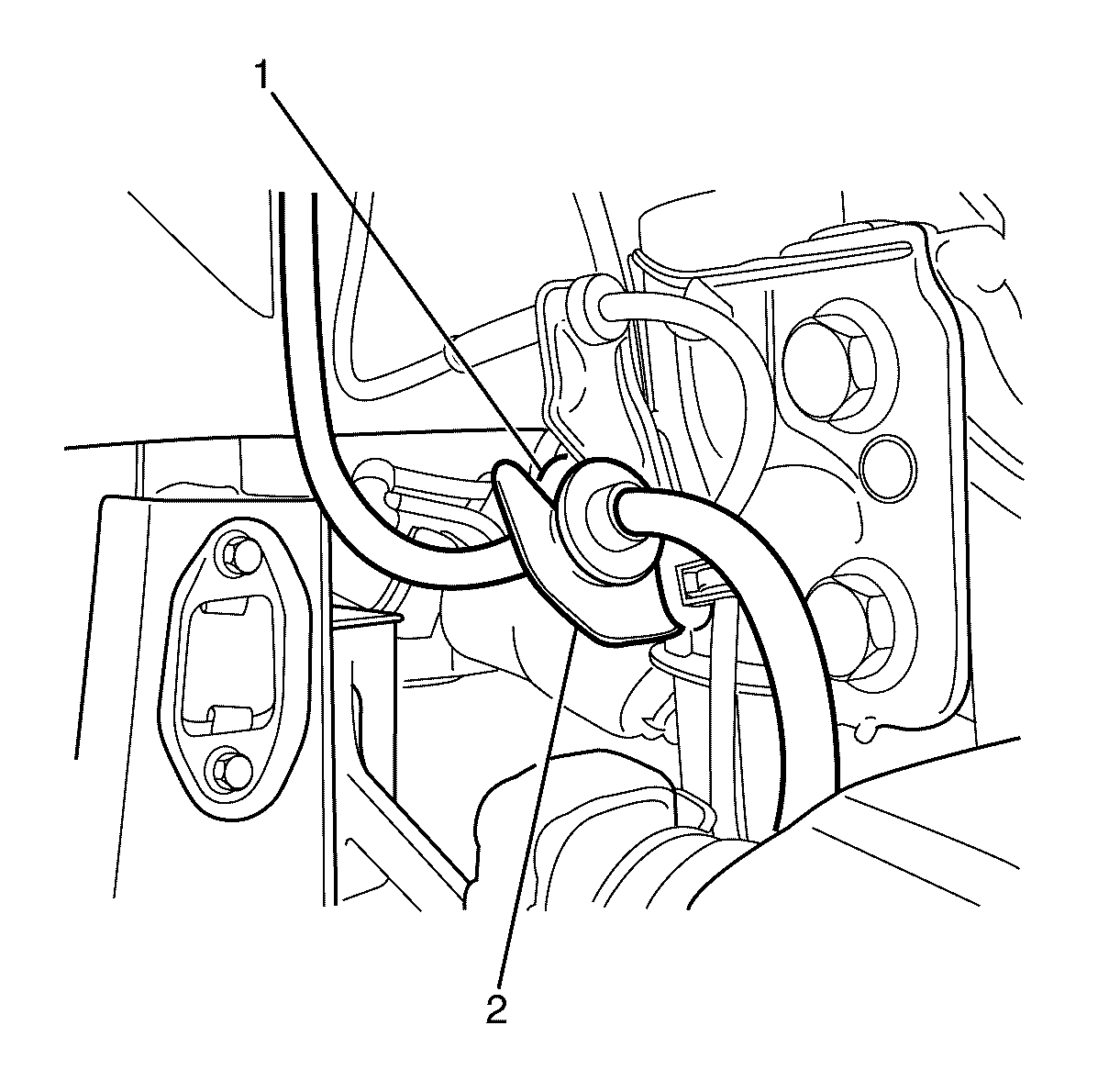
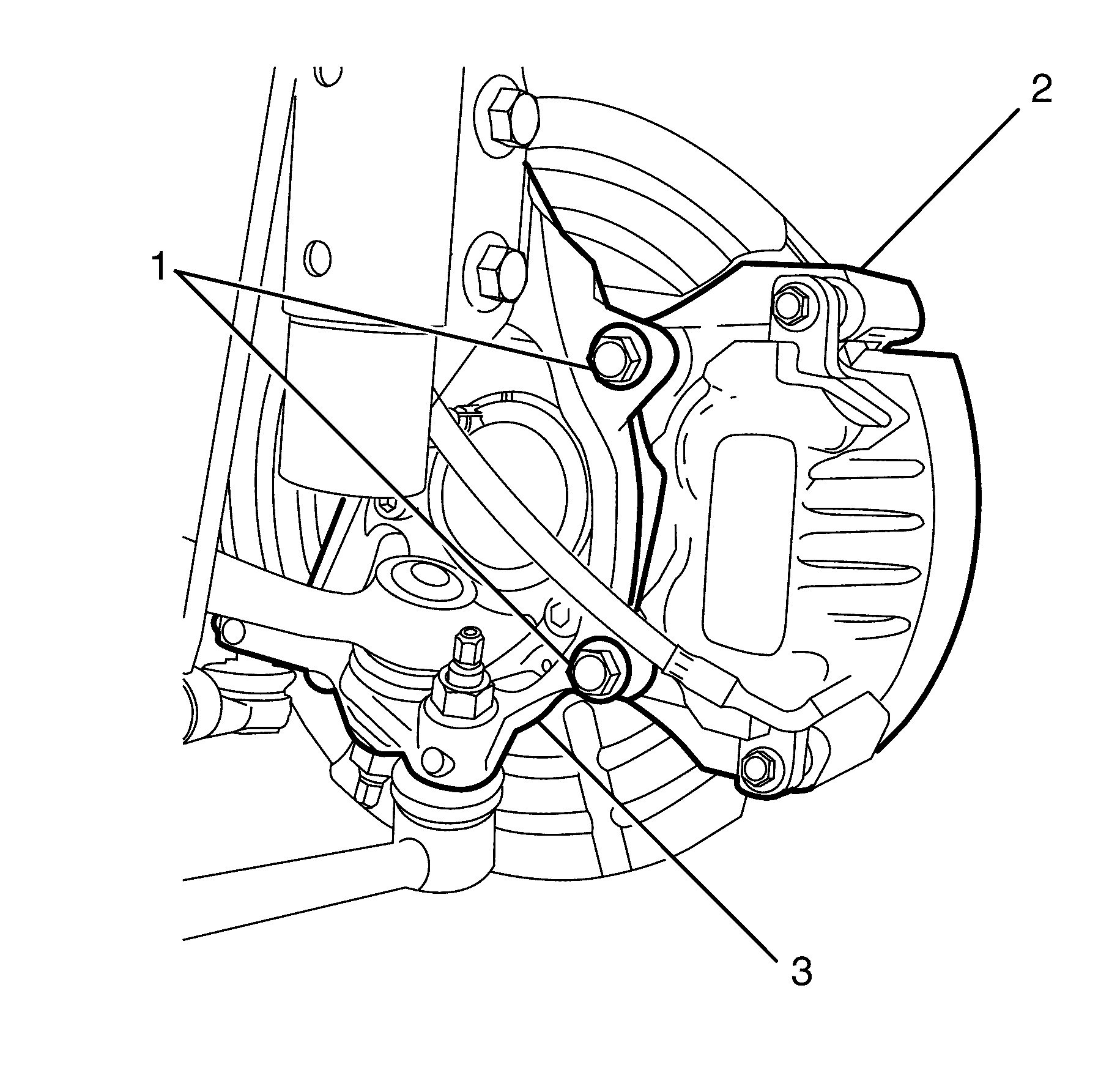
Important: Nuts with micro-encapsulated thread sealant must be discarded after removal.
Discard the bolts.
Important: DO NOT disconnect the hydraulic brake flexible hose from the brake caliper otherwise complete bleeding of the braking system will be necessary.
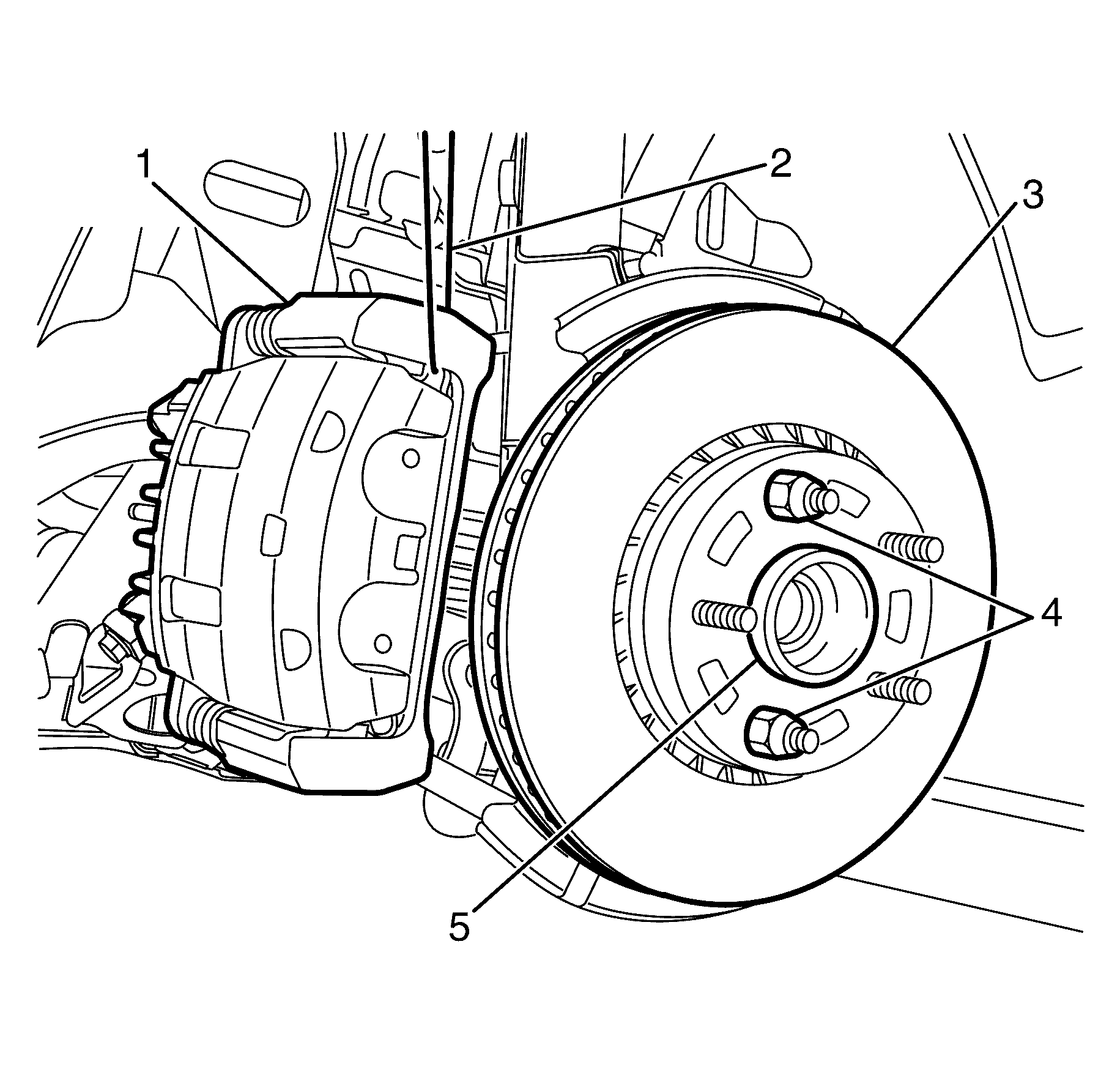
Notice: Support the brake caliper with heavy mechanic wire, or equivalent, whenever it is separated from its mount and the hydraulic flexible brake hose is still connected. Failure to support the caliper in this manner will cause the flexible brake hose to bear the weight of the caliper, which may cause damage to the brake hose and in turn may cause a brake fluid leak.
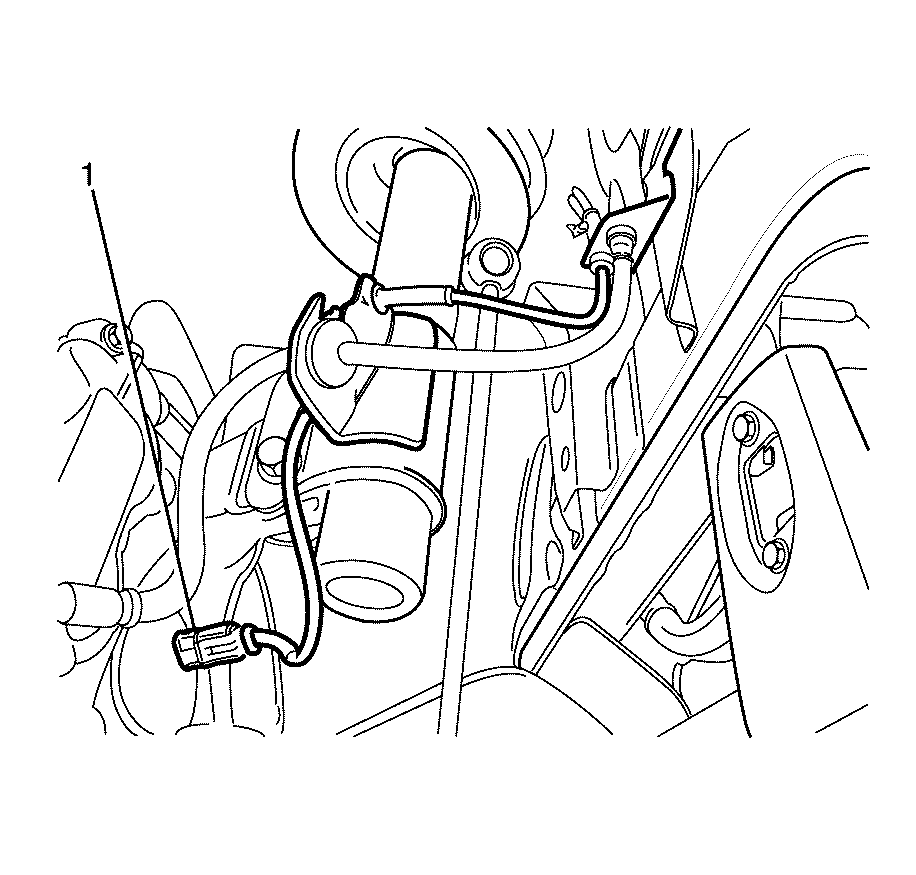
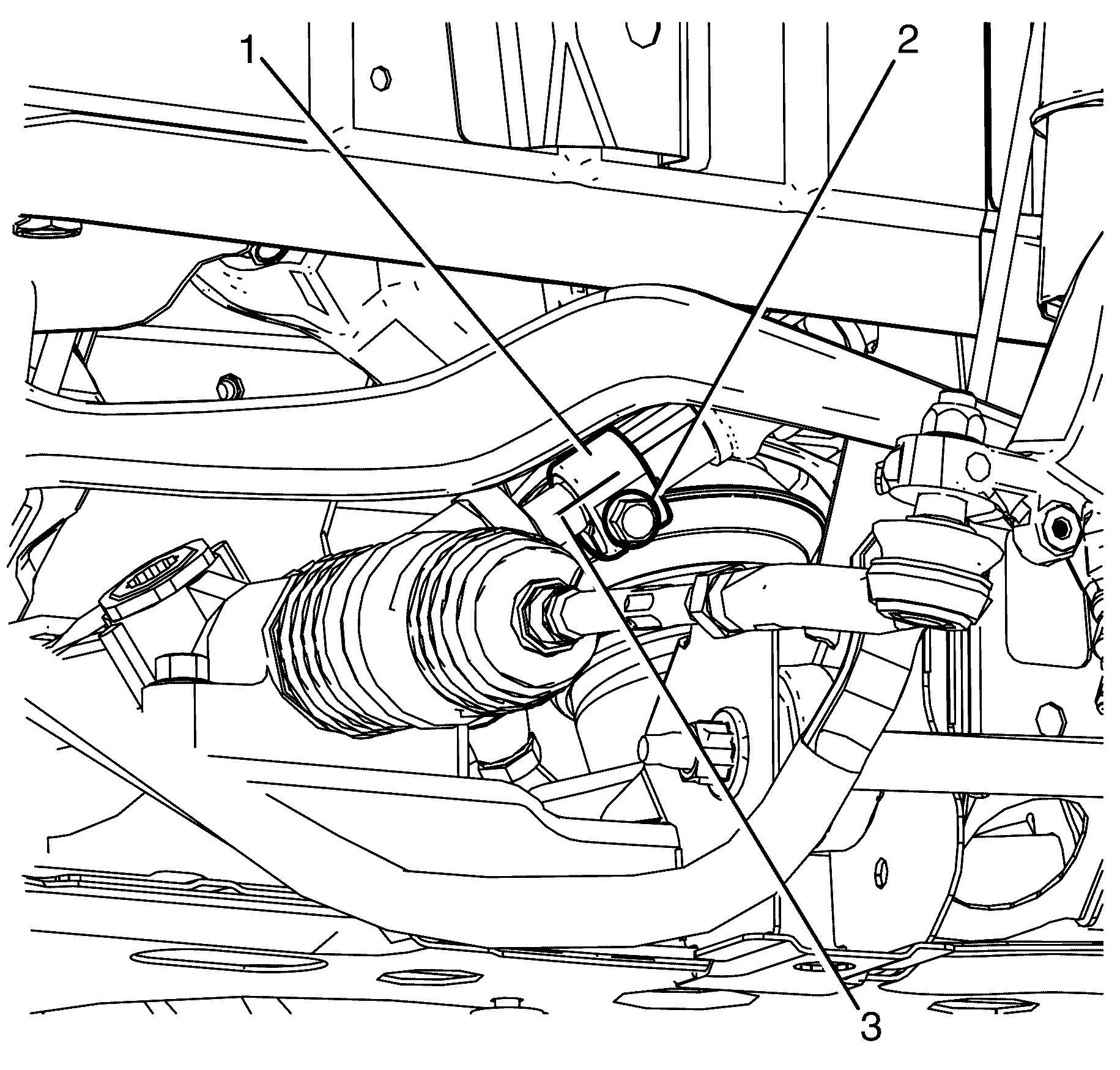
Important: Observing the orientation of the intermediate steering shaft (1) with reference to the pinion shaft (3) will minimise the potential of incorrect steering column assembly alignment.
Important: Bolts with micro-encapsulated thread sealant must be discarded after removal.
Discard the bolt.
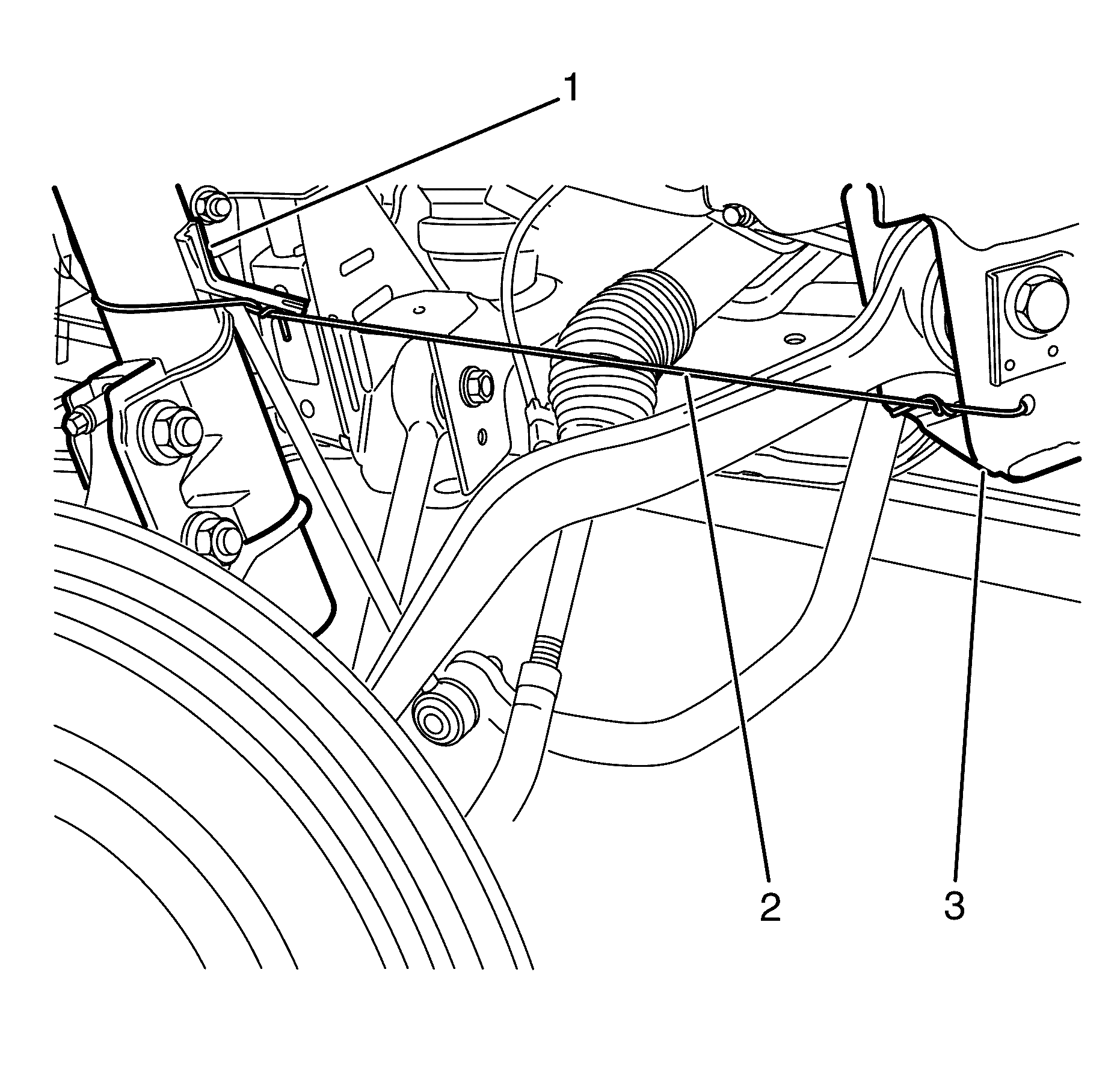
Important: The strut assembly (1) must be secured to the subframe (3) to prevent damage to the front wheelhouse liner, fenders and suspension components.
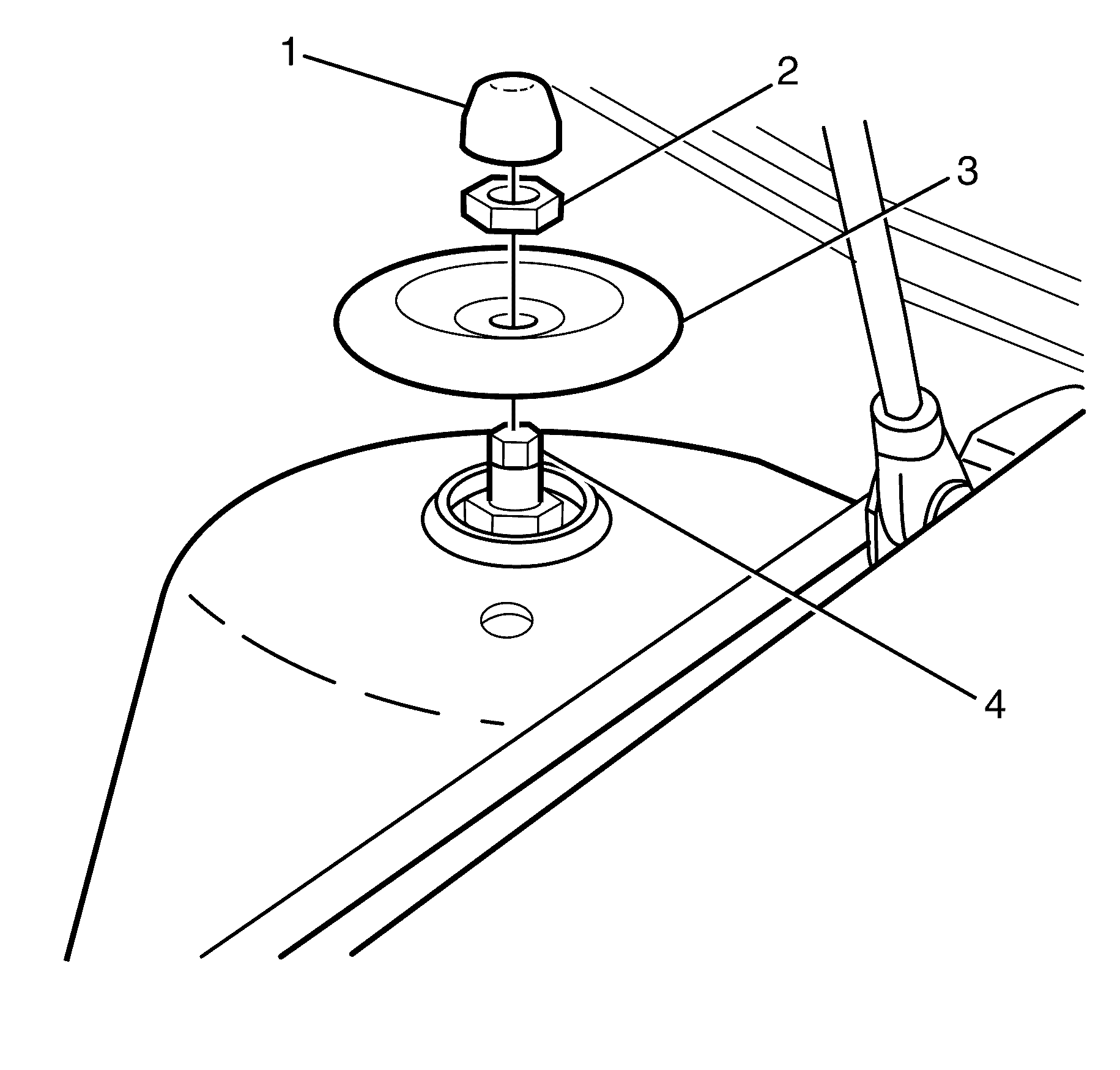
Important: The strut assembly (4) must be supported from underneath before the strut assembly to body retaining nut (2) is removed.
Discard the nut.
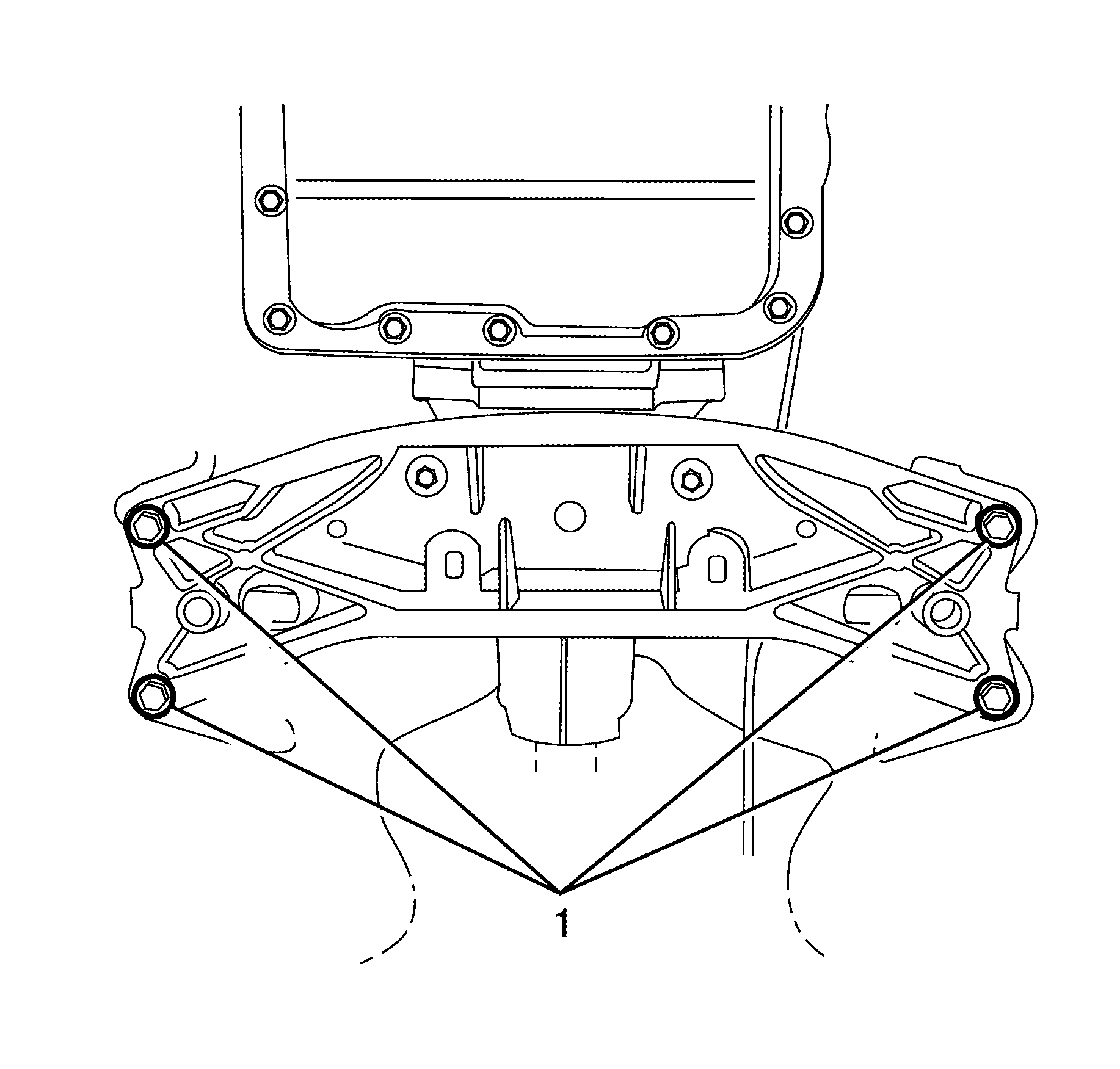
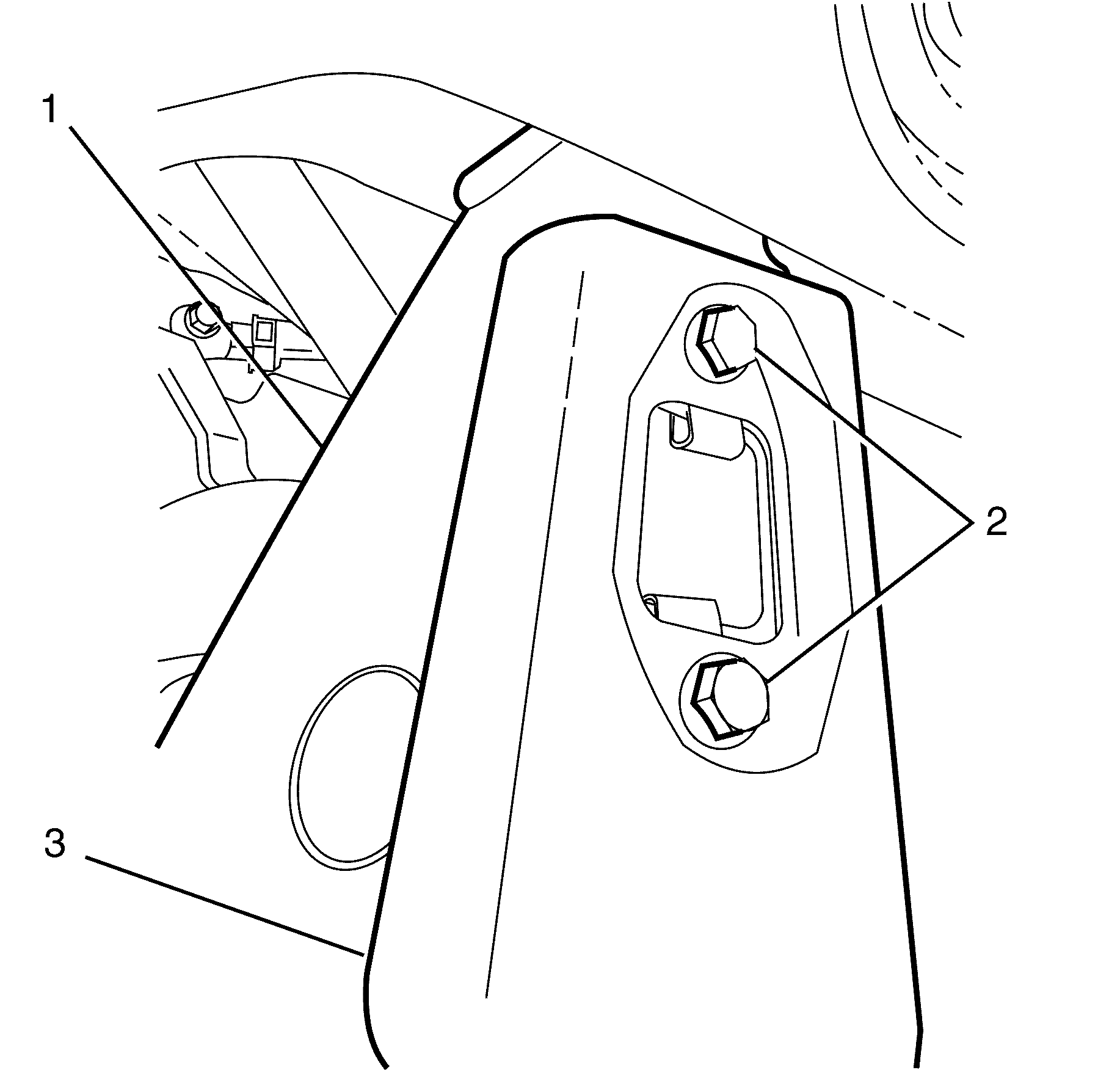
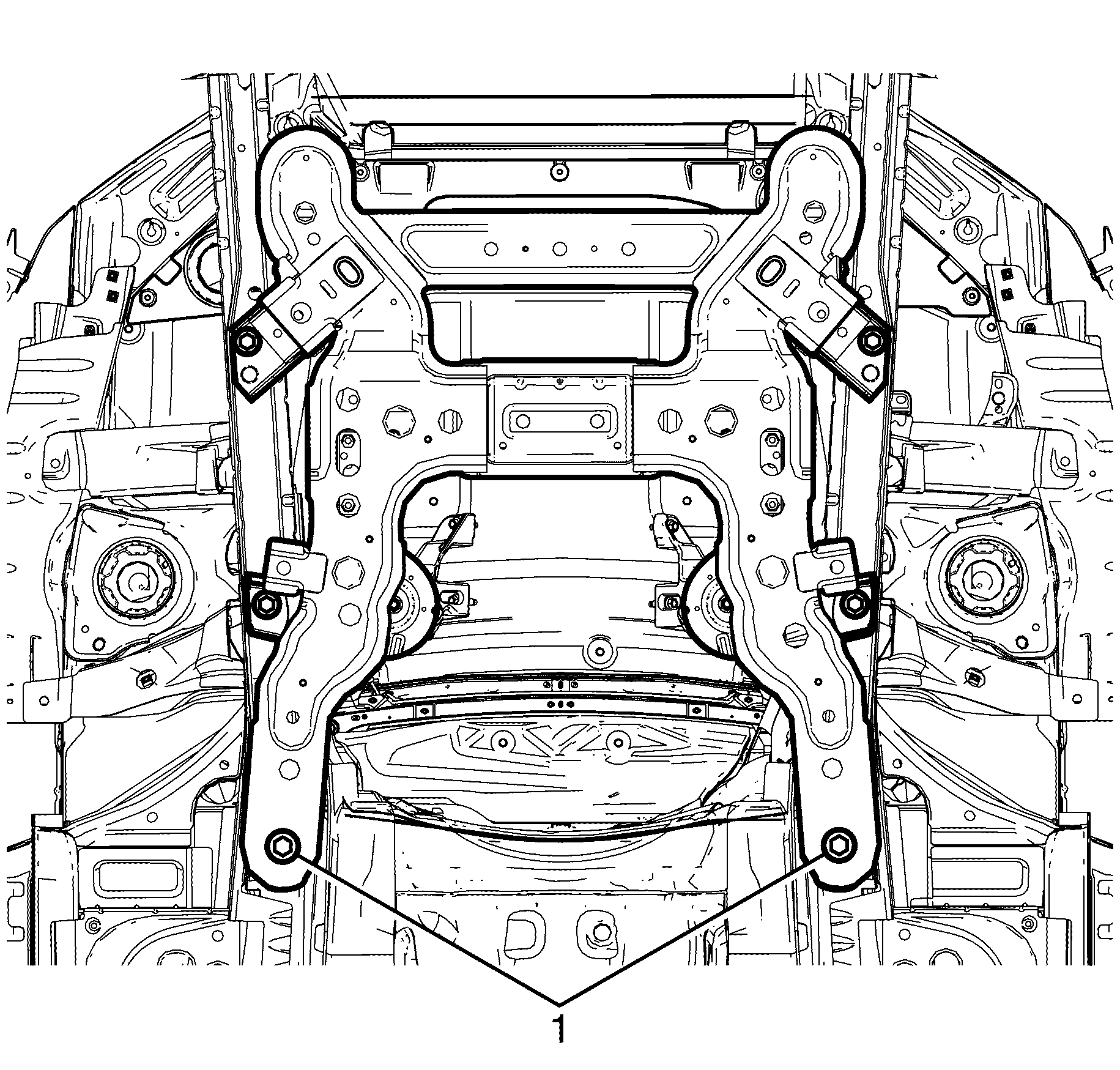
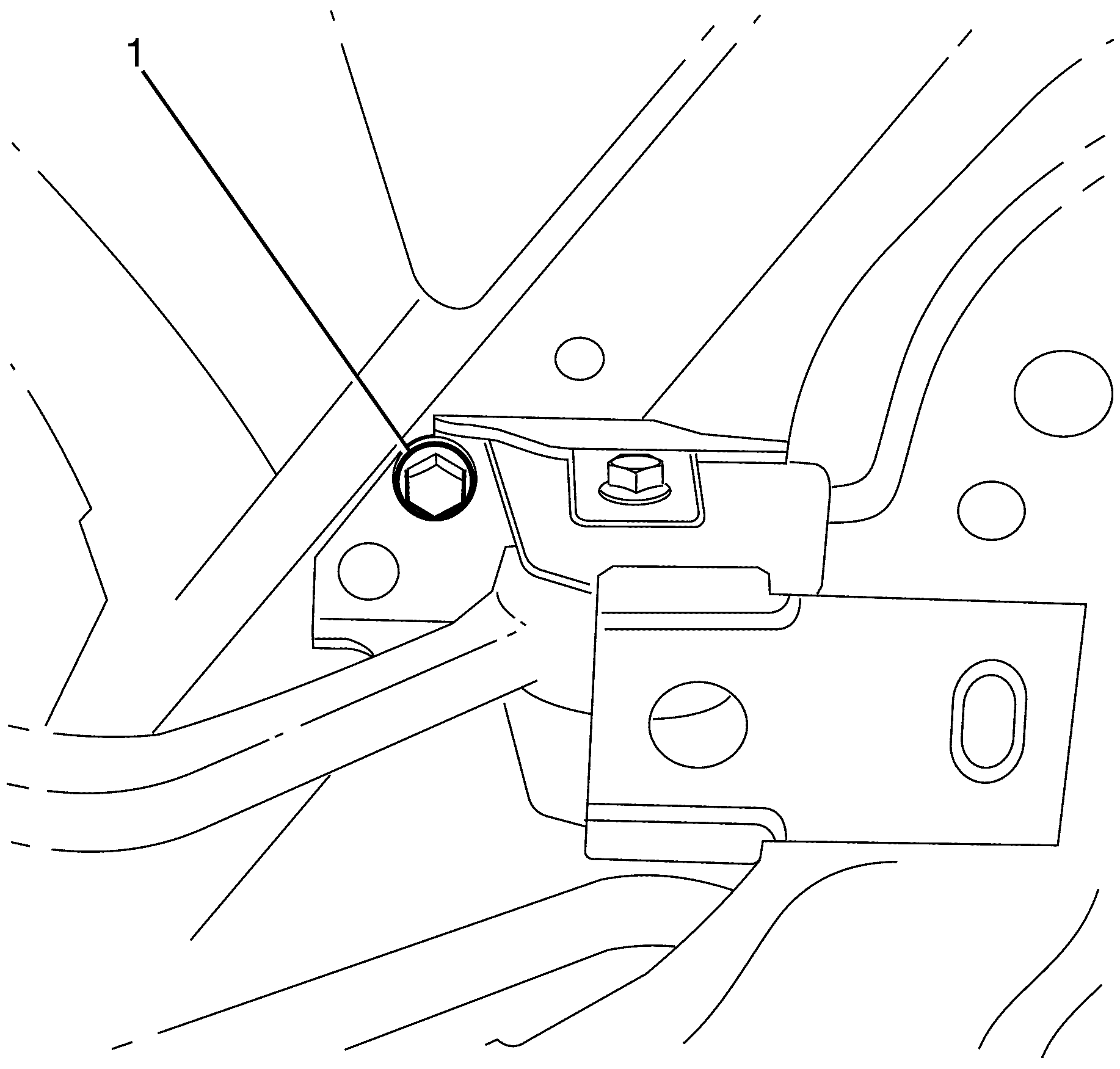
Important: Only right side depicted in graphic, left side similar.
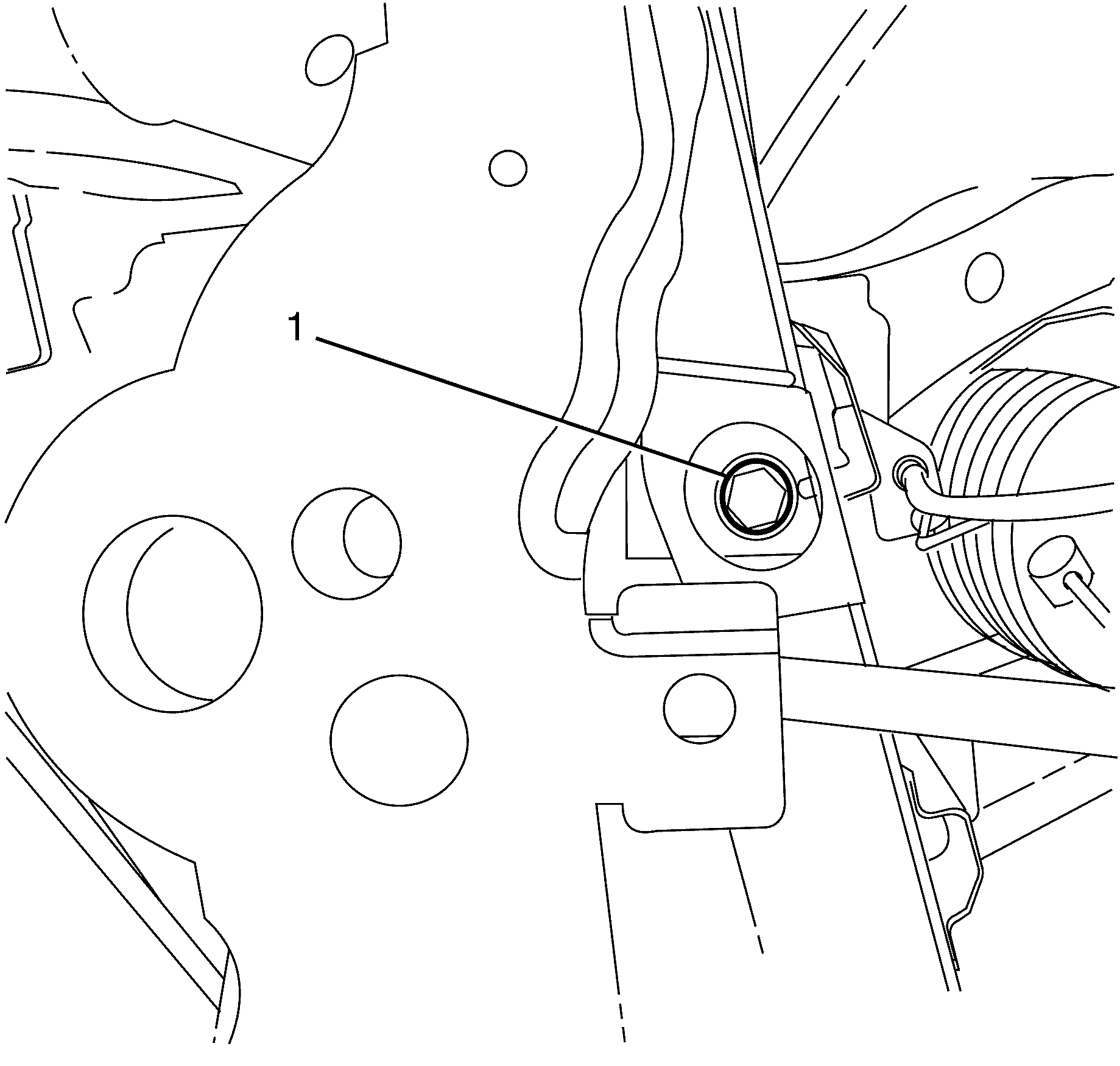
Important: Only right side depicted in graphic, left side similar.
Important: Make sure that all the hoses, wires, pipes and front struts clear the vehicle during the removal process.
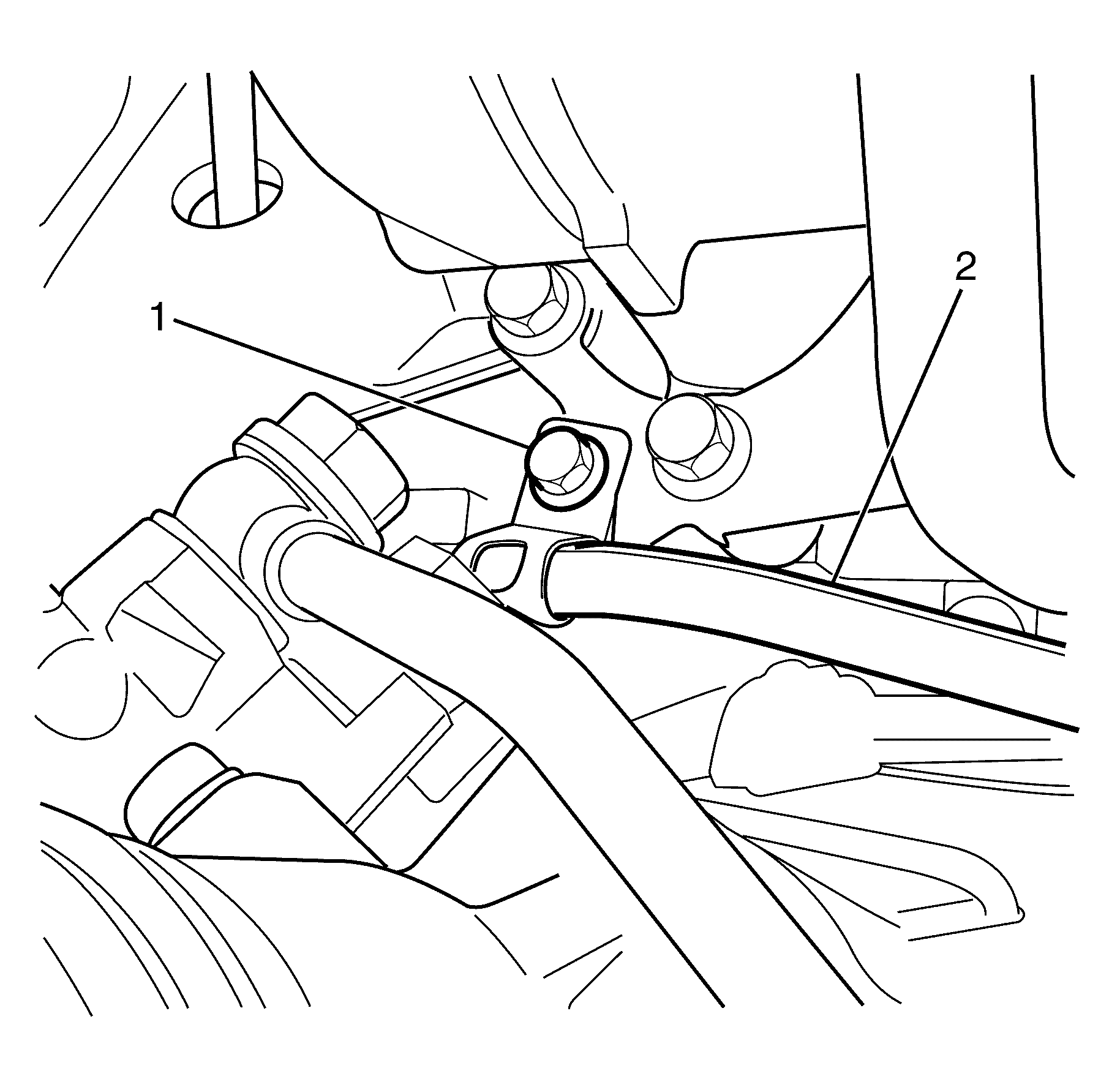
| • | Transmission Replacement in Manual Transmission -- Tremec 6-speed. |
| • | Transmission Replacement in Automatic Transmission -- 4L60-E/4L65-E/4L70-E. |
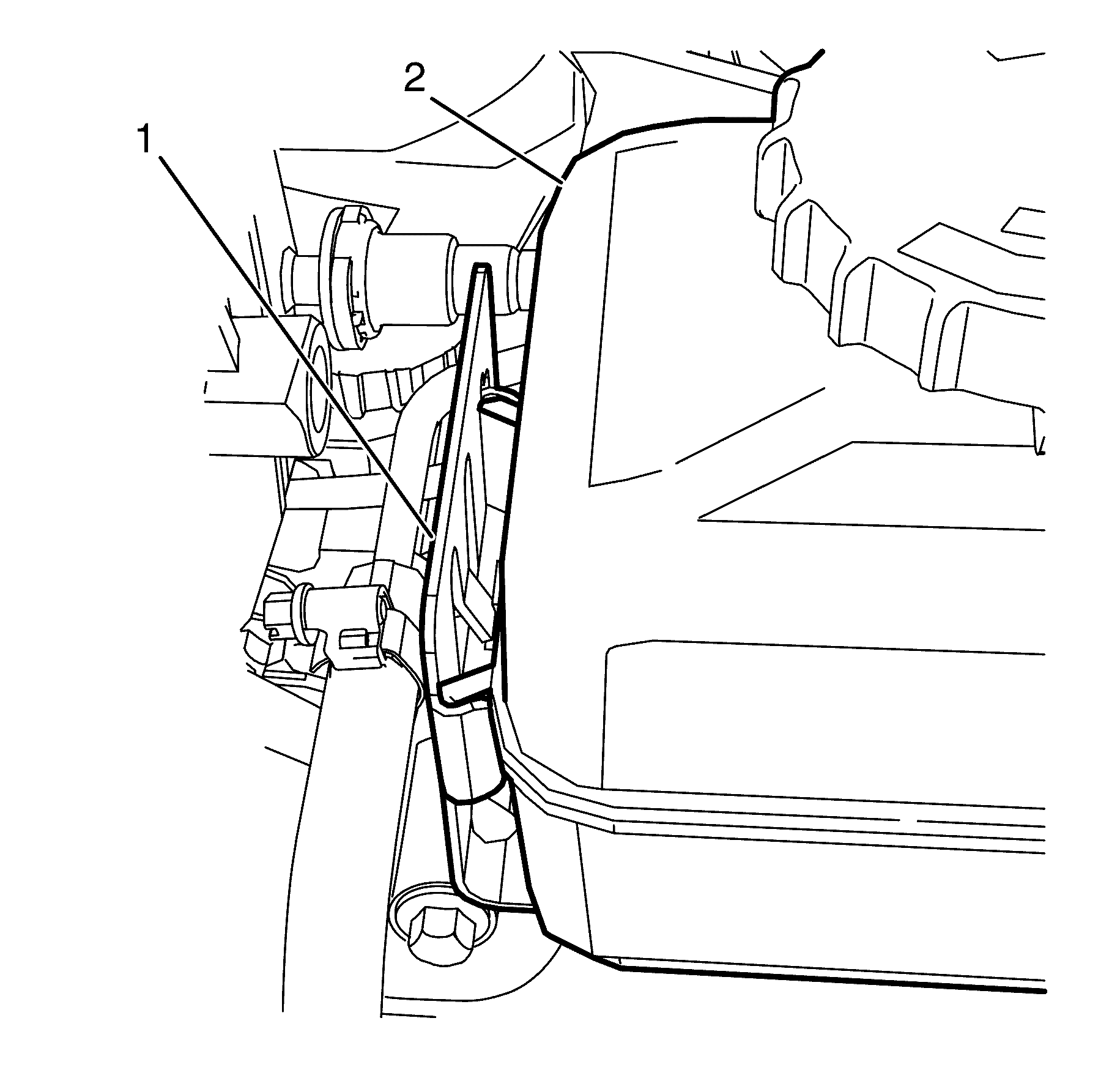
Important: The locking tang on the power steering reservoir bracket (1) must be released before removing the power steering reservoir (2).
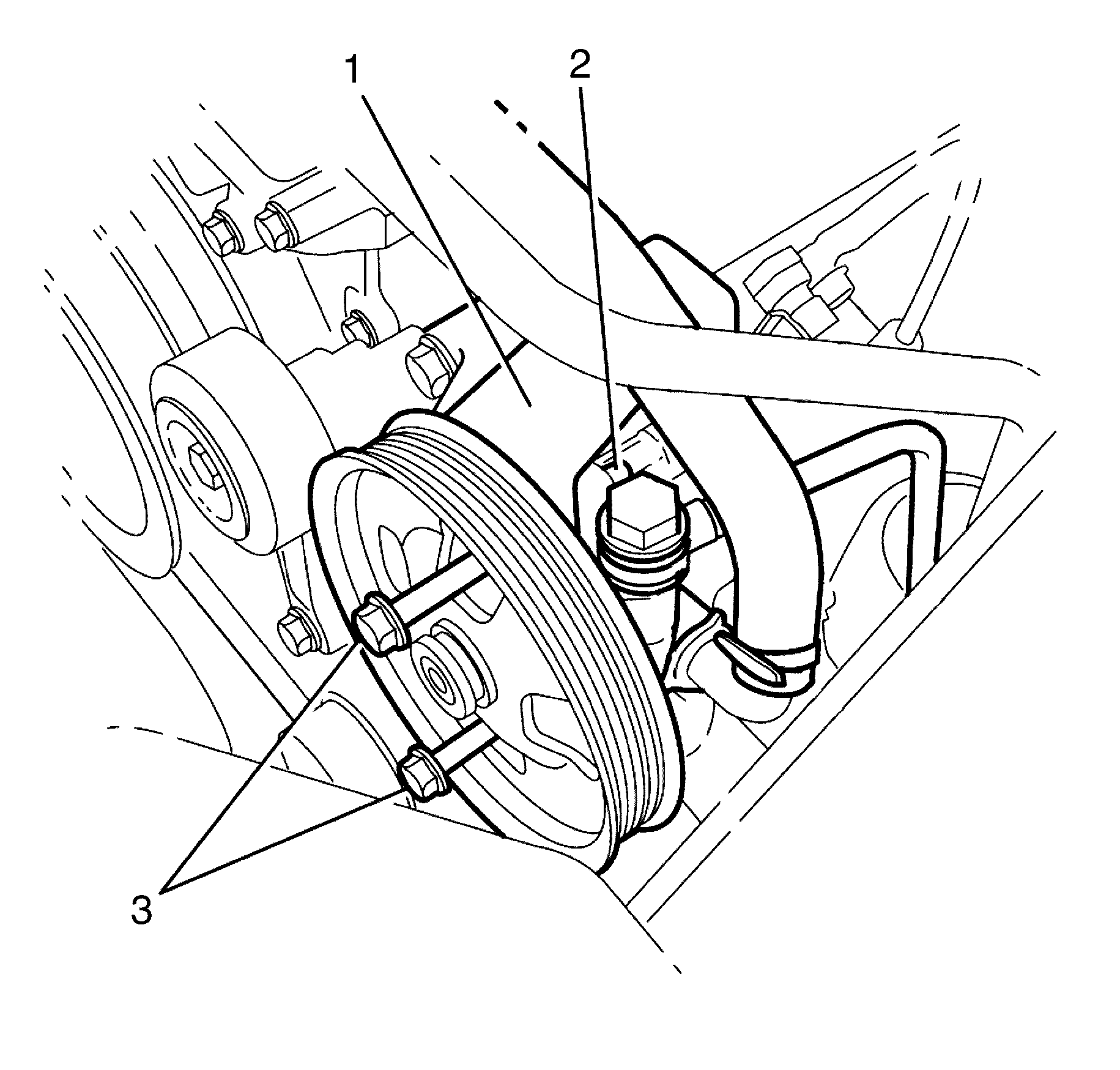
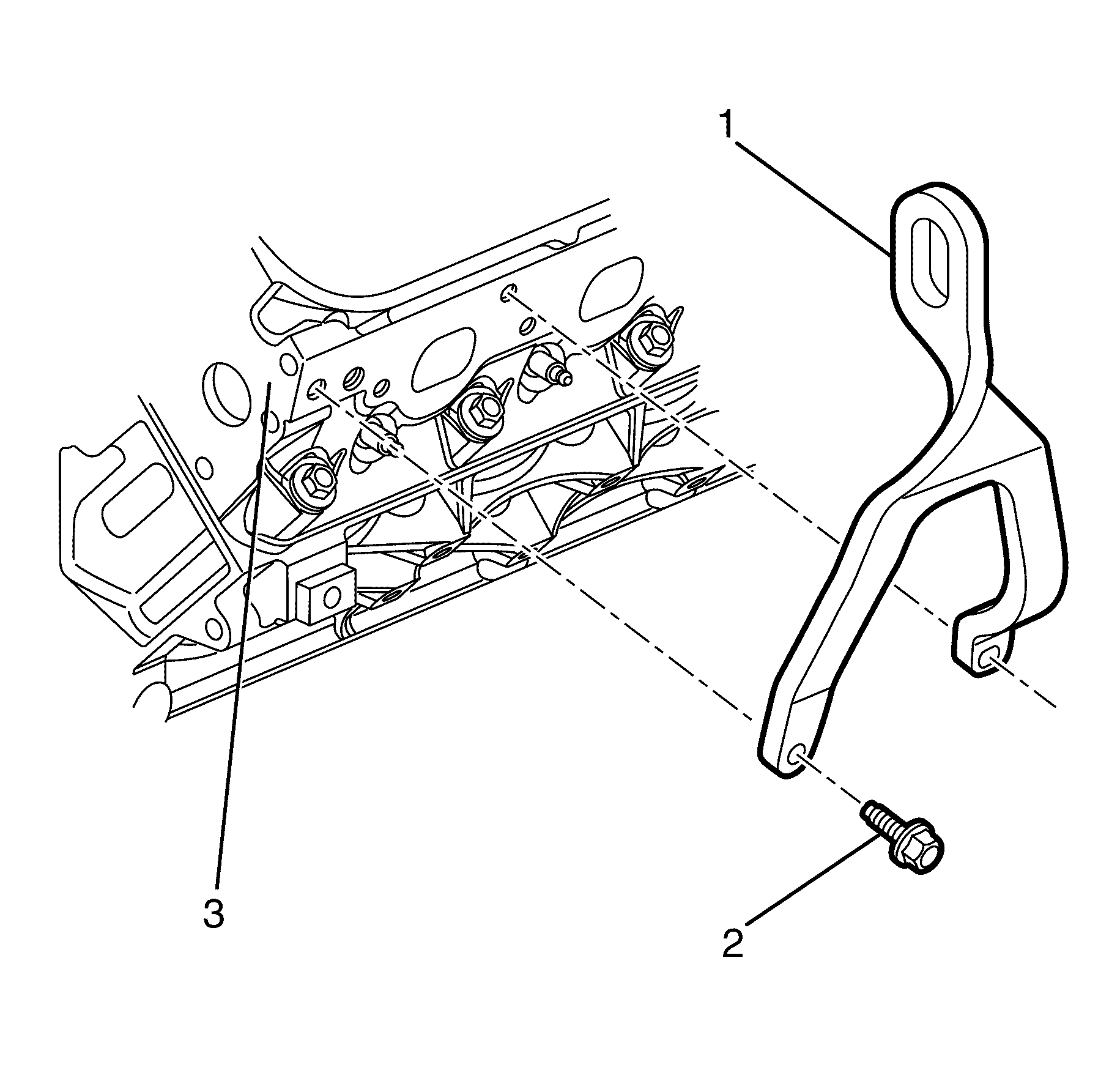
Notice: Refer to Fastener Notice in the Preface section.
Tighten
Tighten the bolts to 50 N·m (36 lb ft).
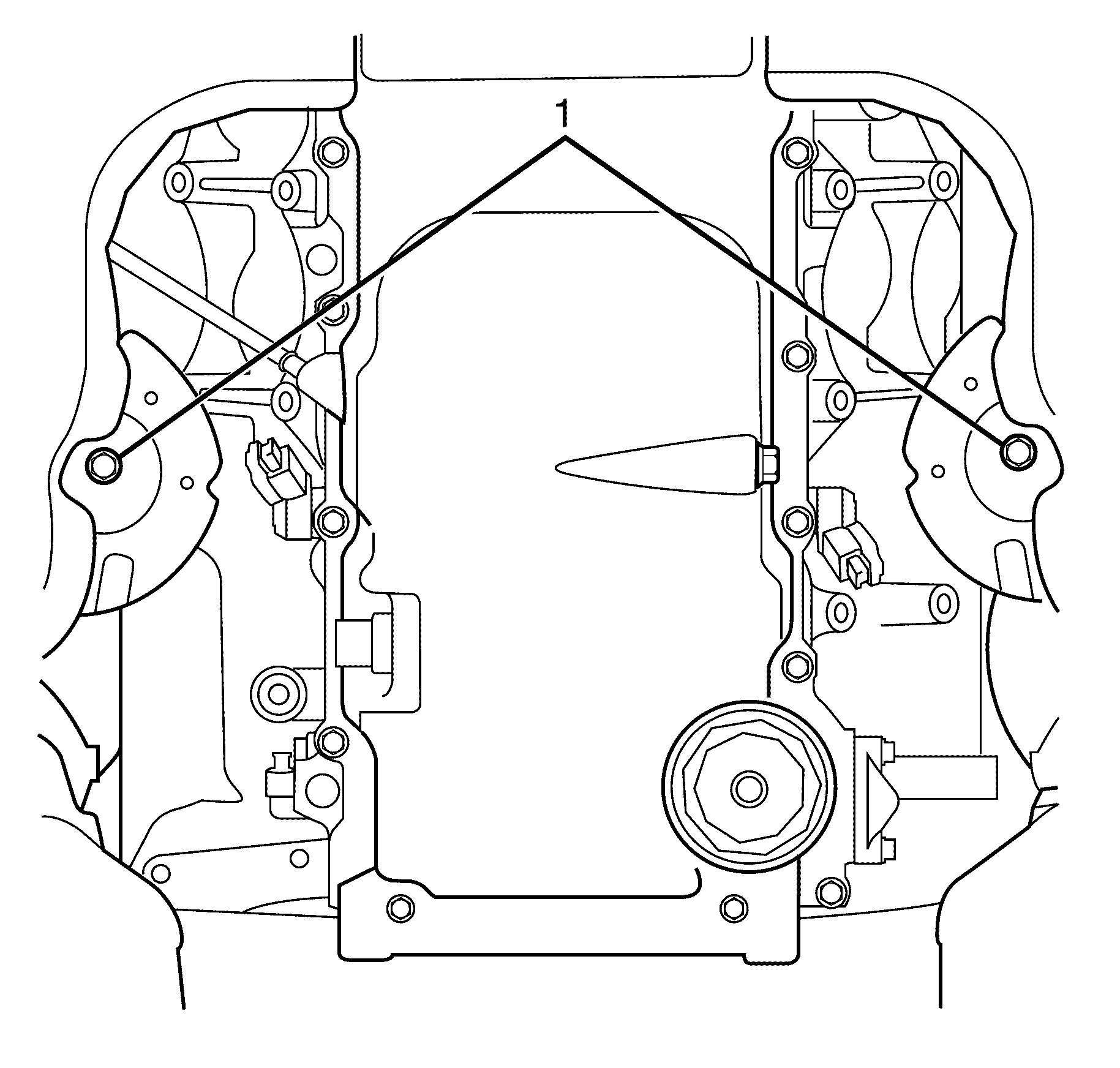
If required mount the engine on a suitable engine stand.
Caution: Refer to Exhaust Service Caution in the Preface section.
Caution: Refer to Protective Goggles and Glove Caution in the Preface section.
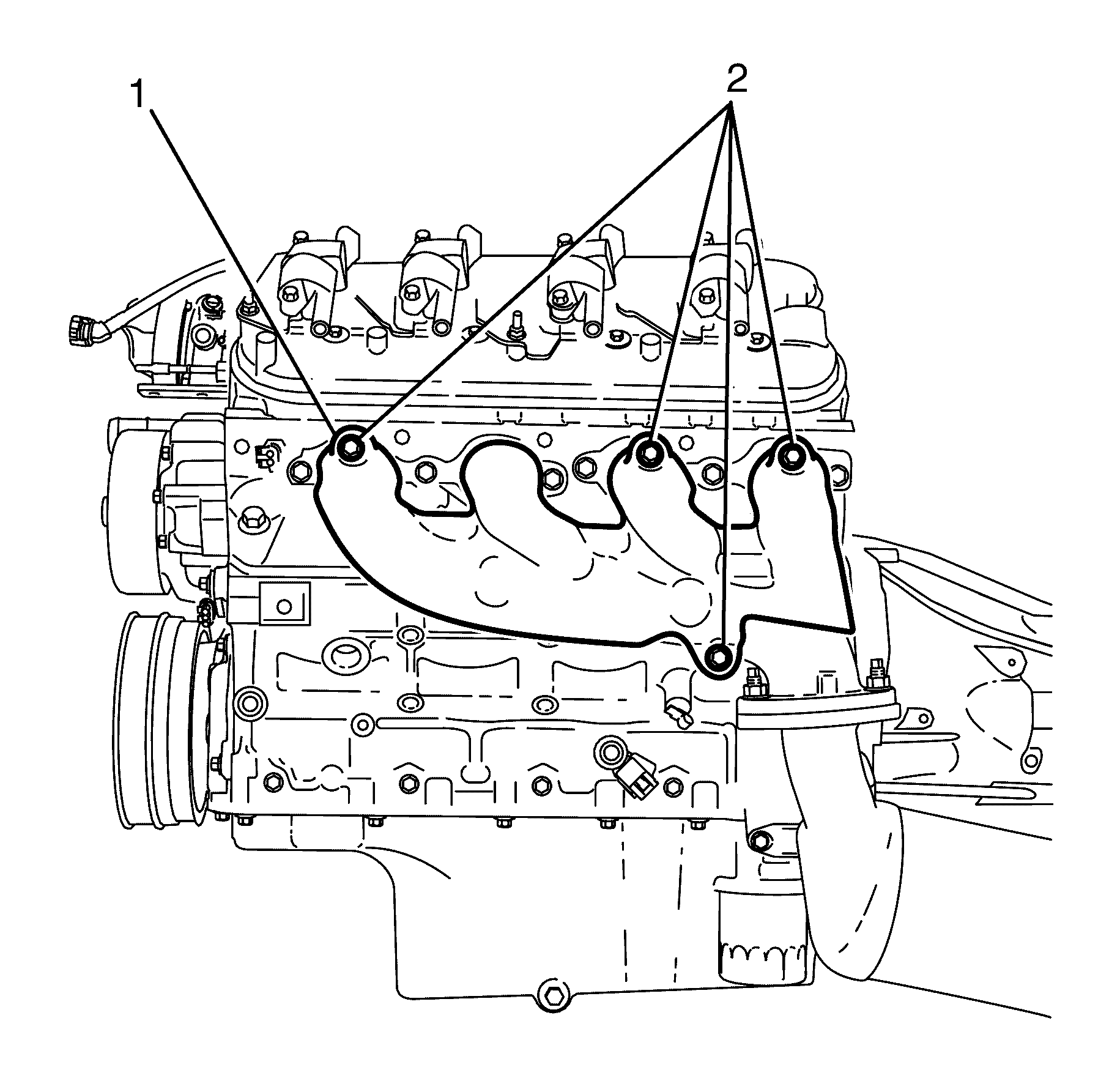
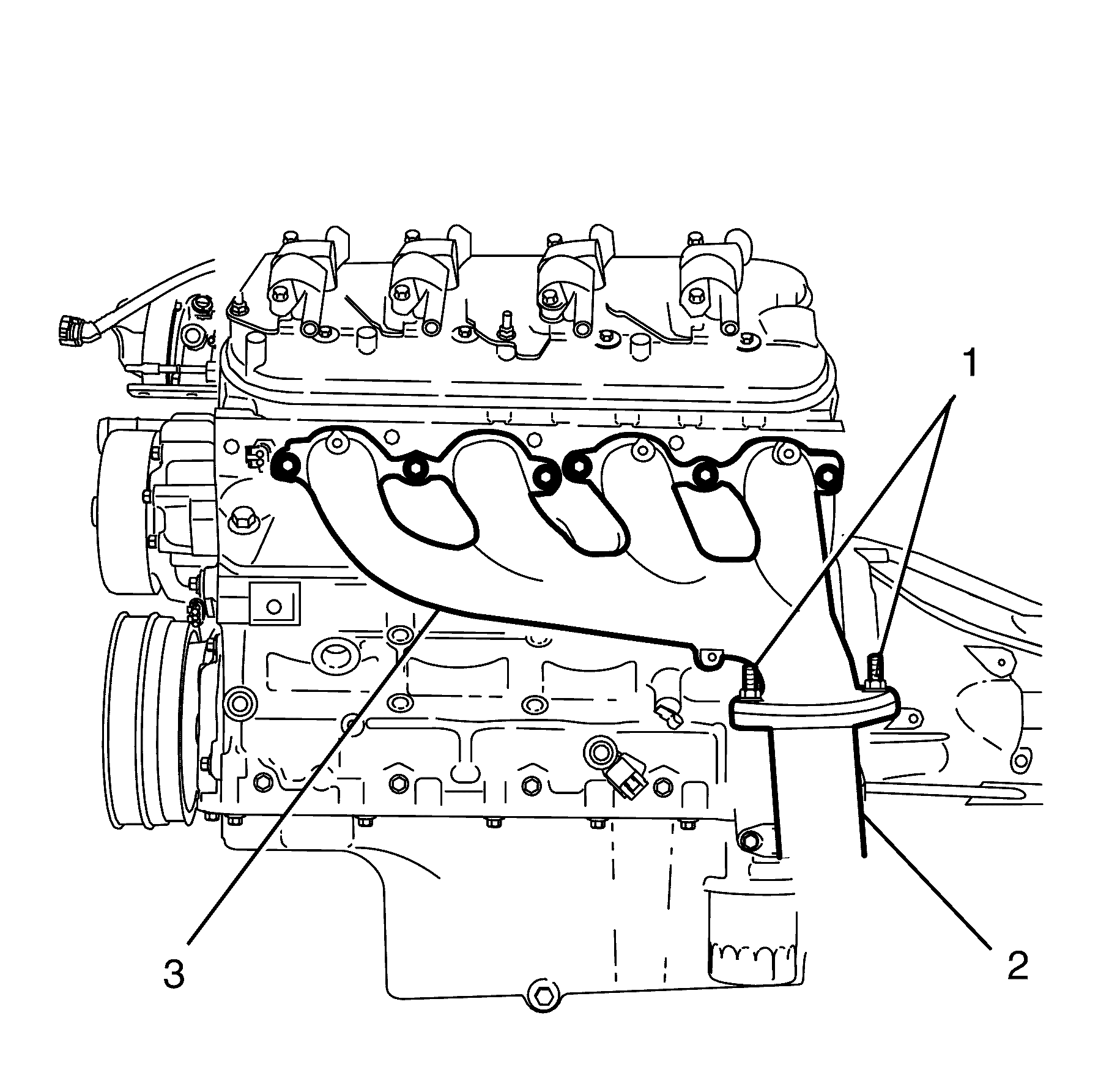
Important: The left side catalytic converter to exhaust manifold retaining nuts (1) are single use parts. They must be discarded after removal.
Discard the nuts.
Discard the gasket.
Caution: Refer to Exhaust Service Caution in the Preface section.
Caution: Refer to Protective Goggles and Glove Caution in the Preface section.
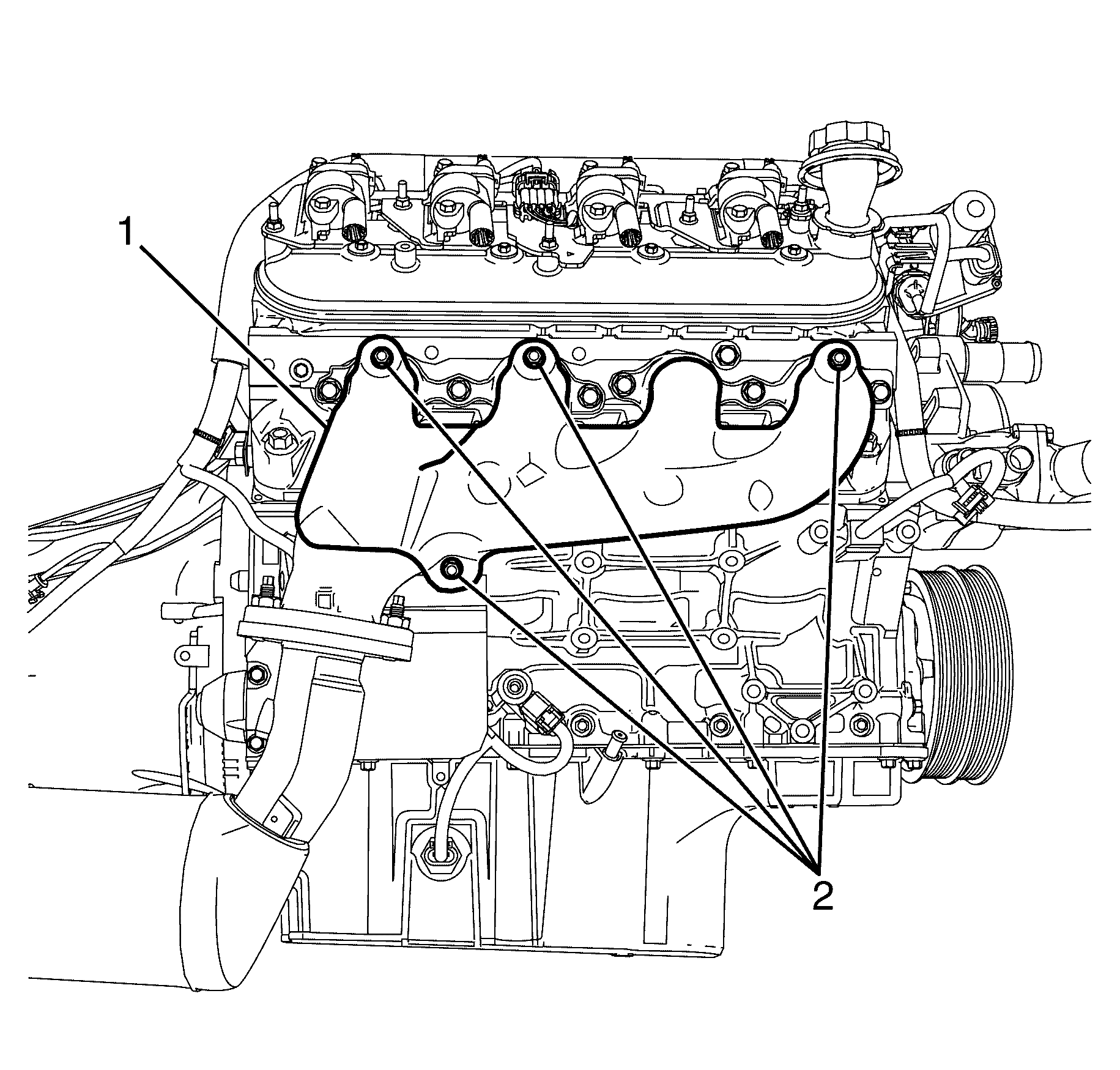
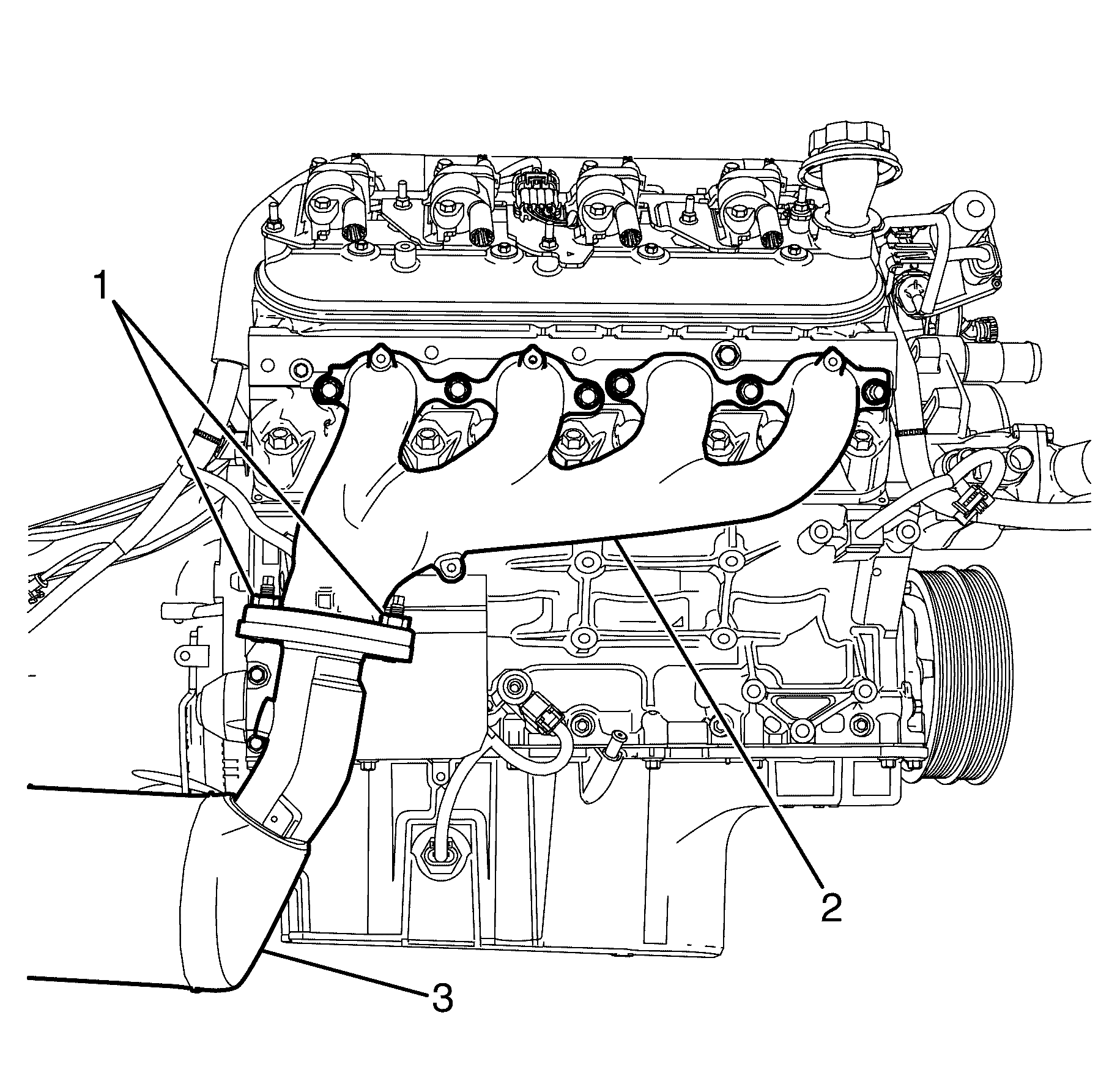
Important: The right side catalytic converter to exhaust manifold retaining nuts (1) are single use parts. They must be discarded after removal.
Discard the nuts.
Discard the gasket.
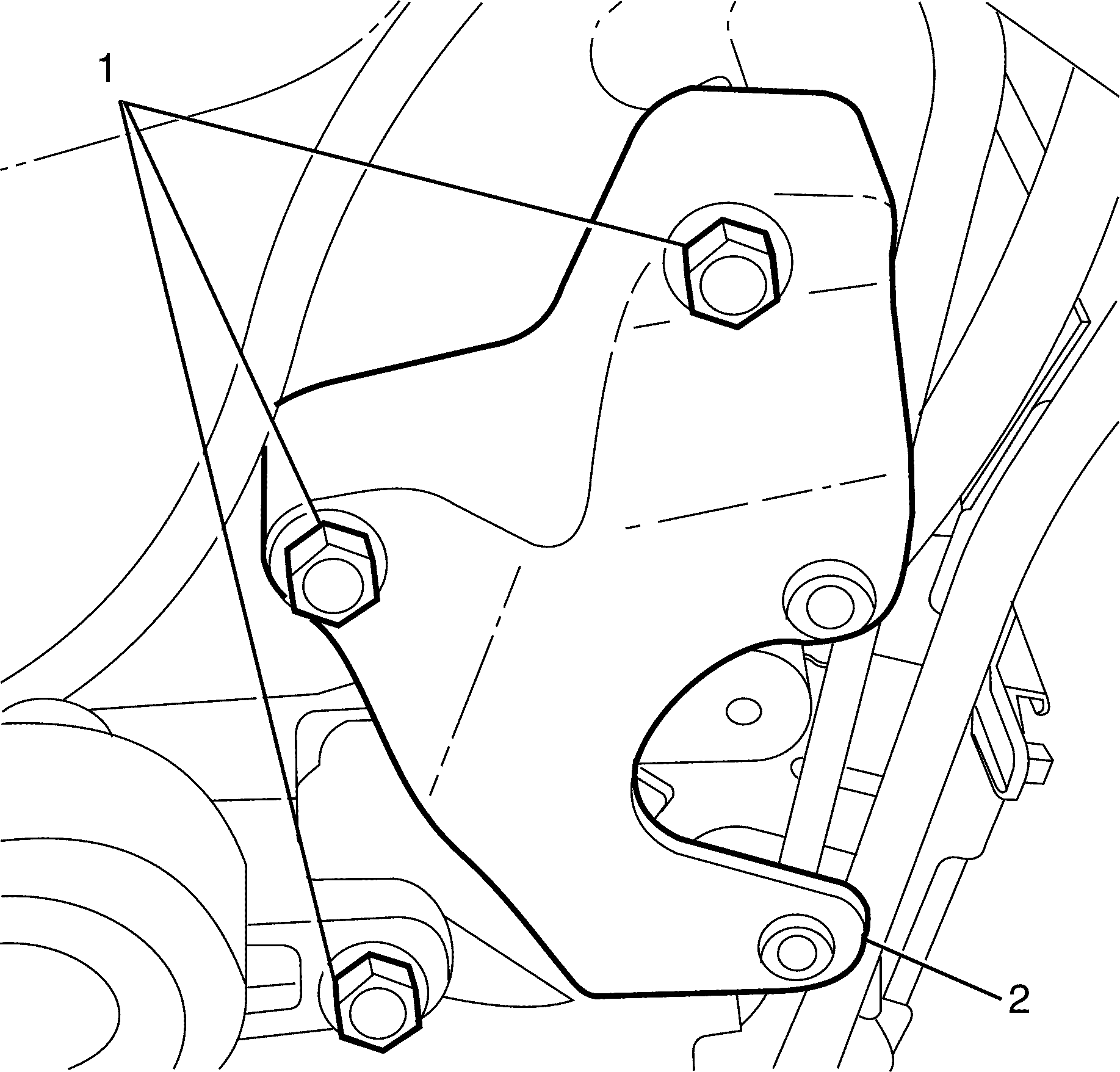
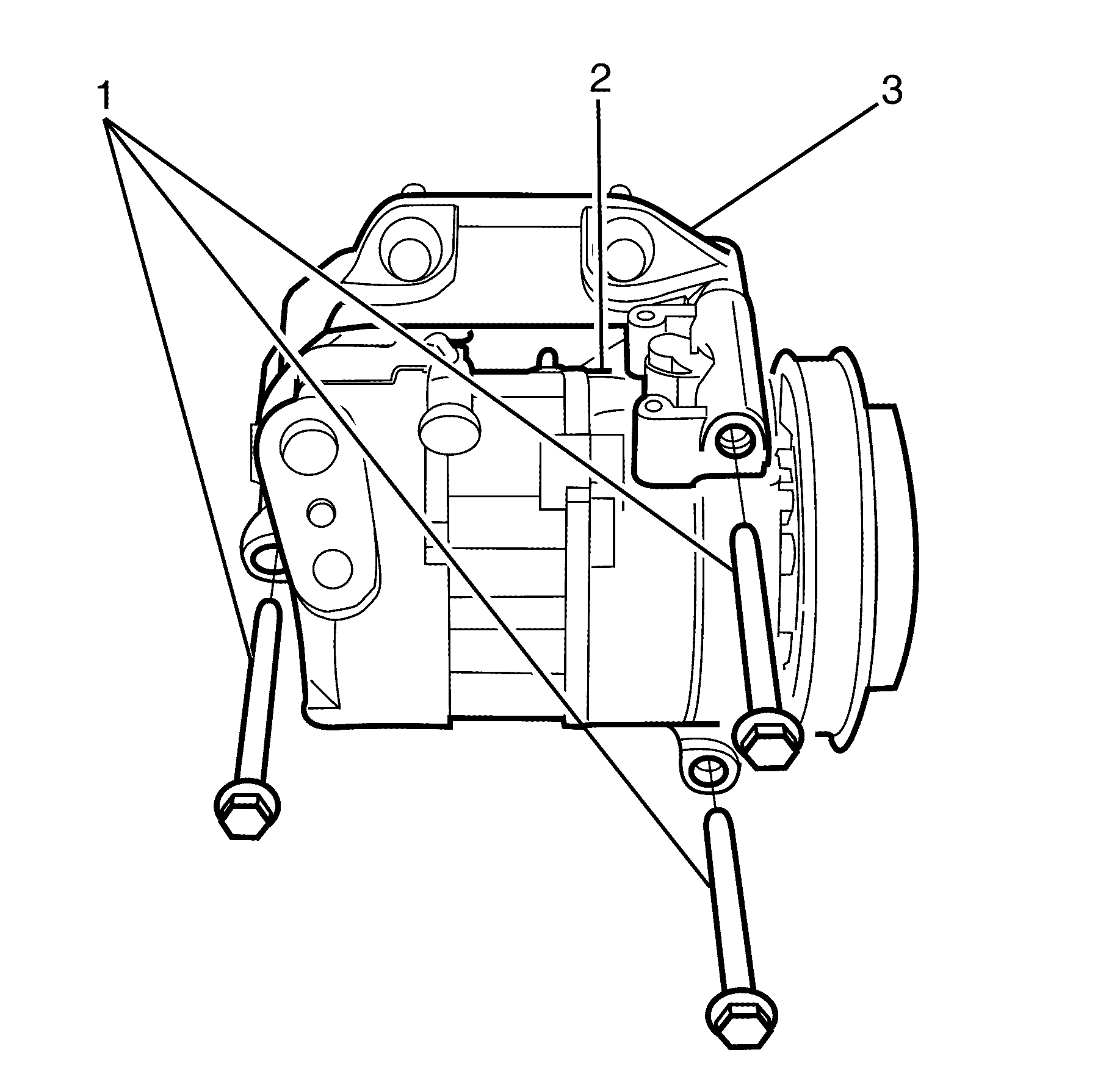
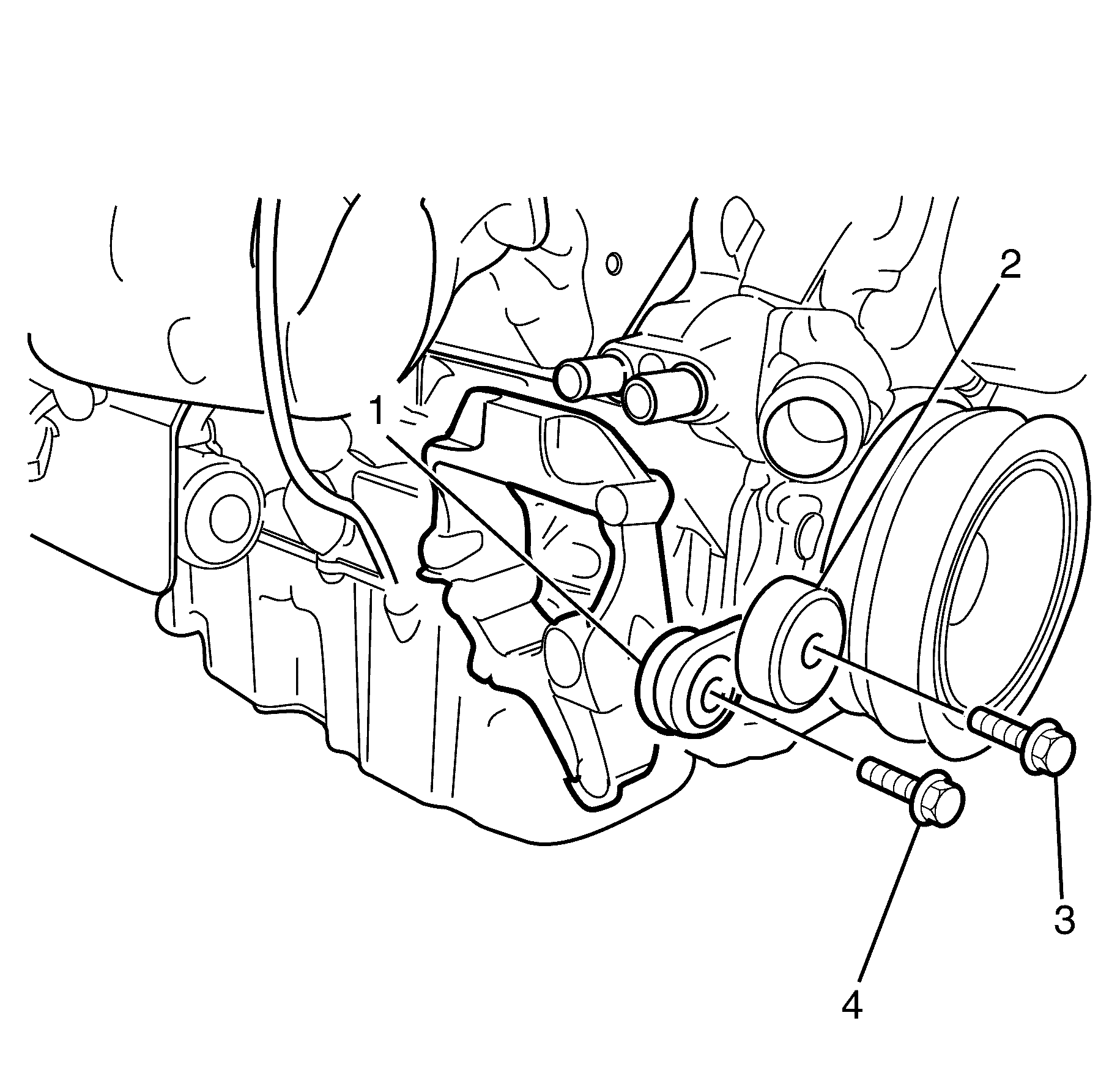

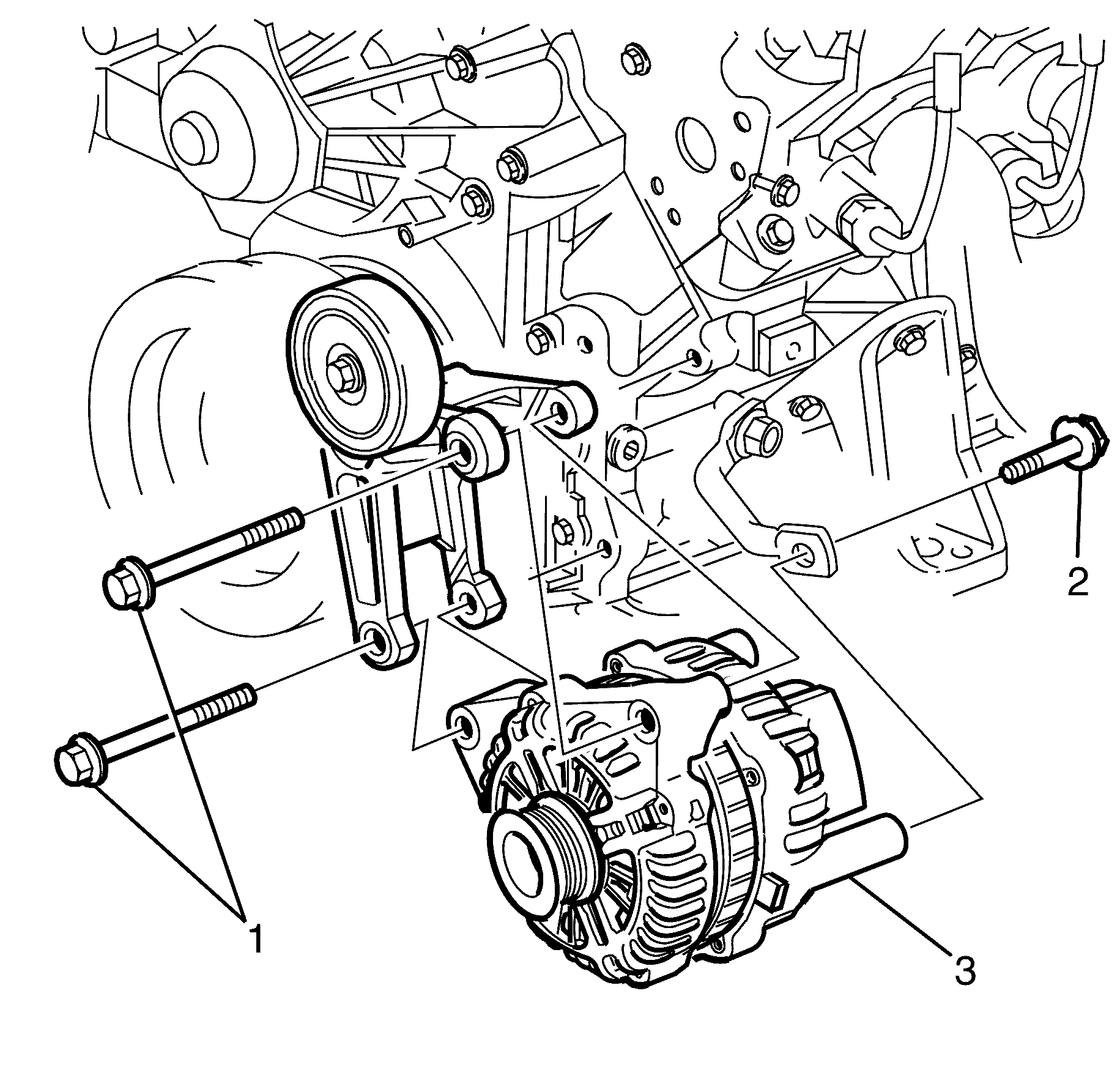
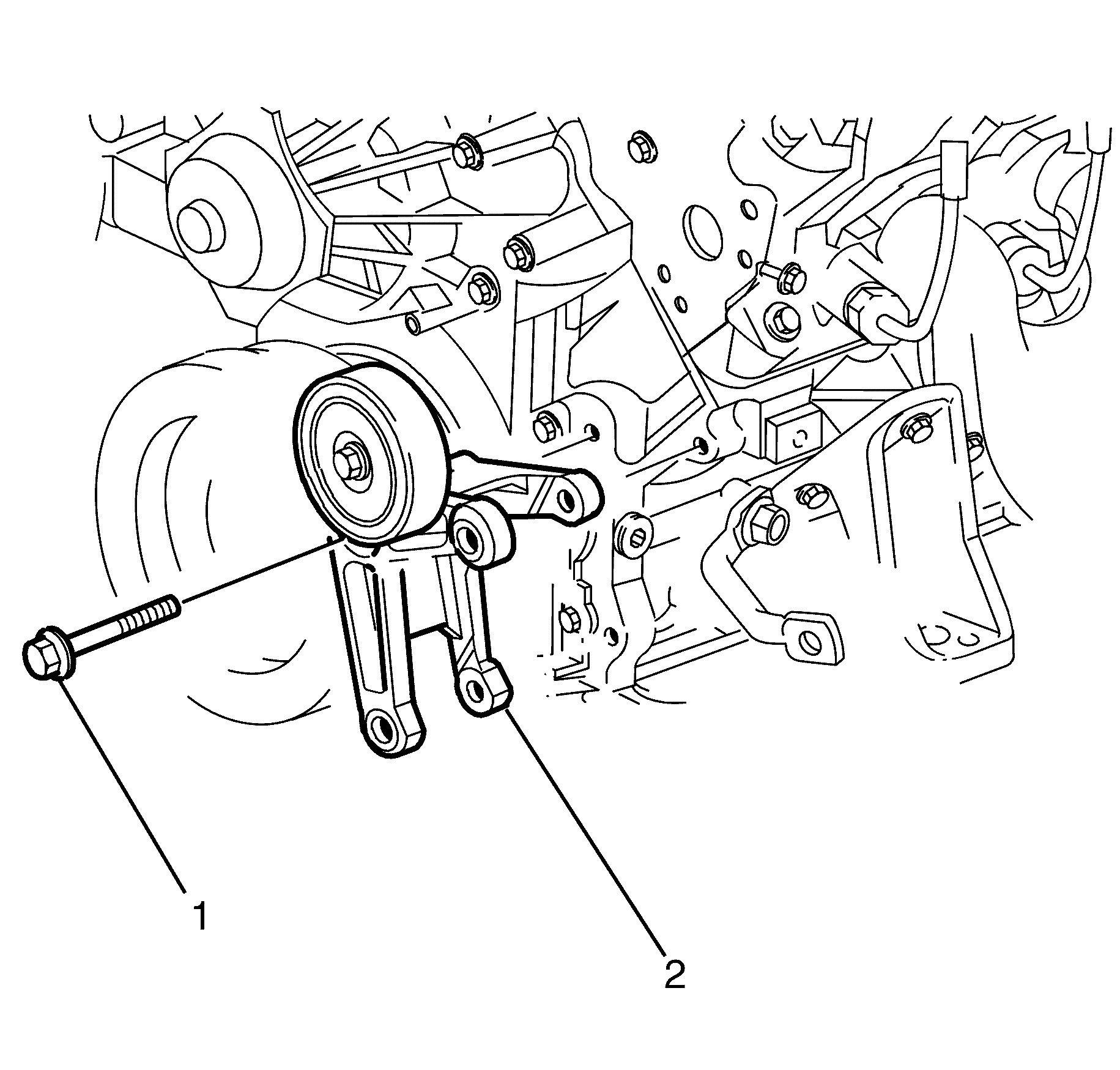
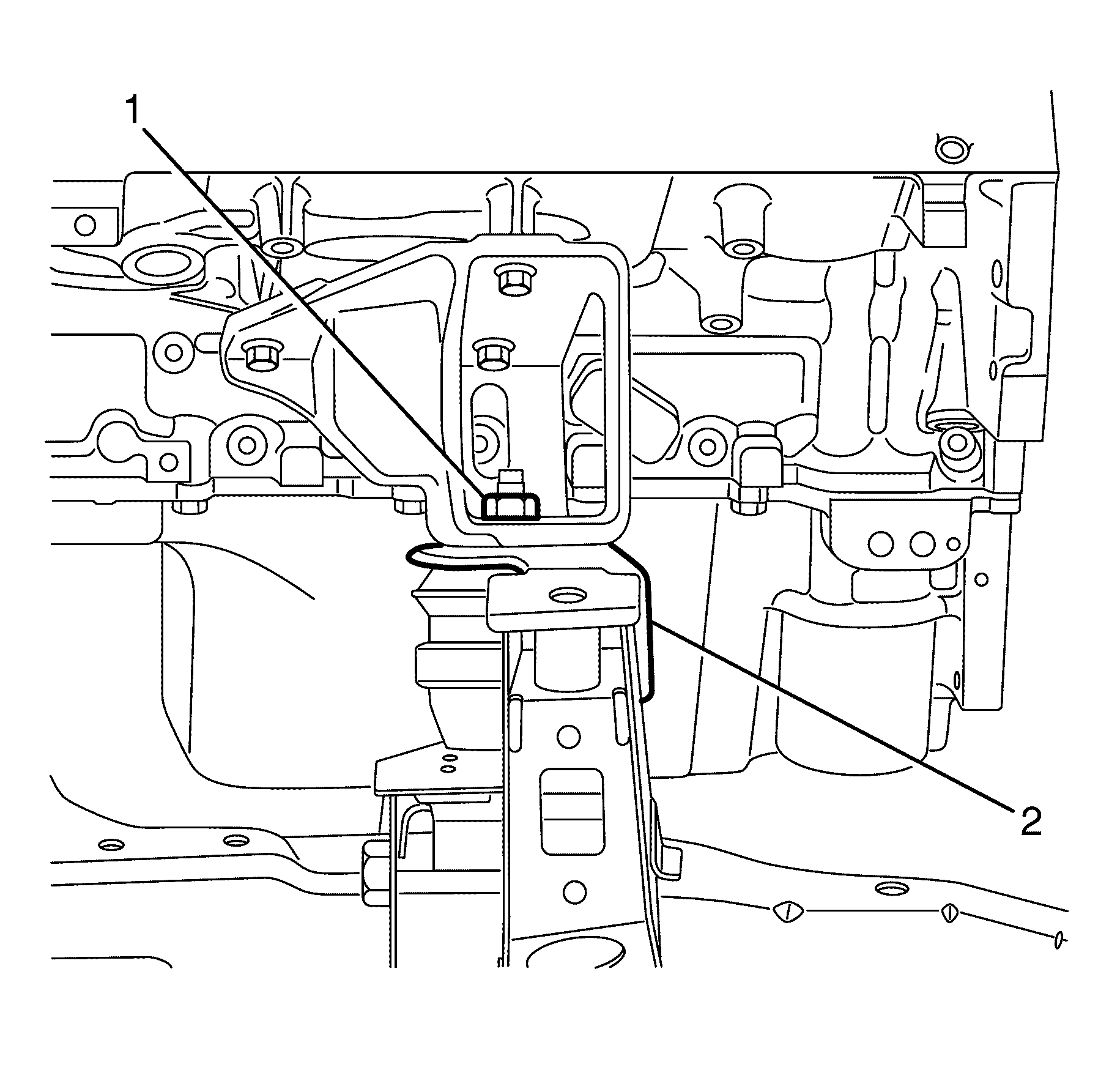
Important: DO NOT bend or distort the left side engine mount heat shield (2).
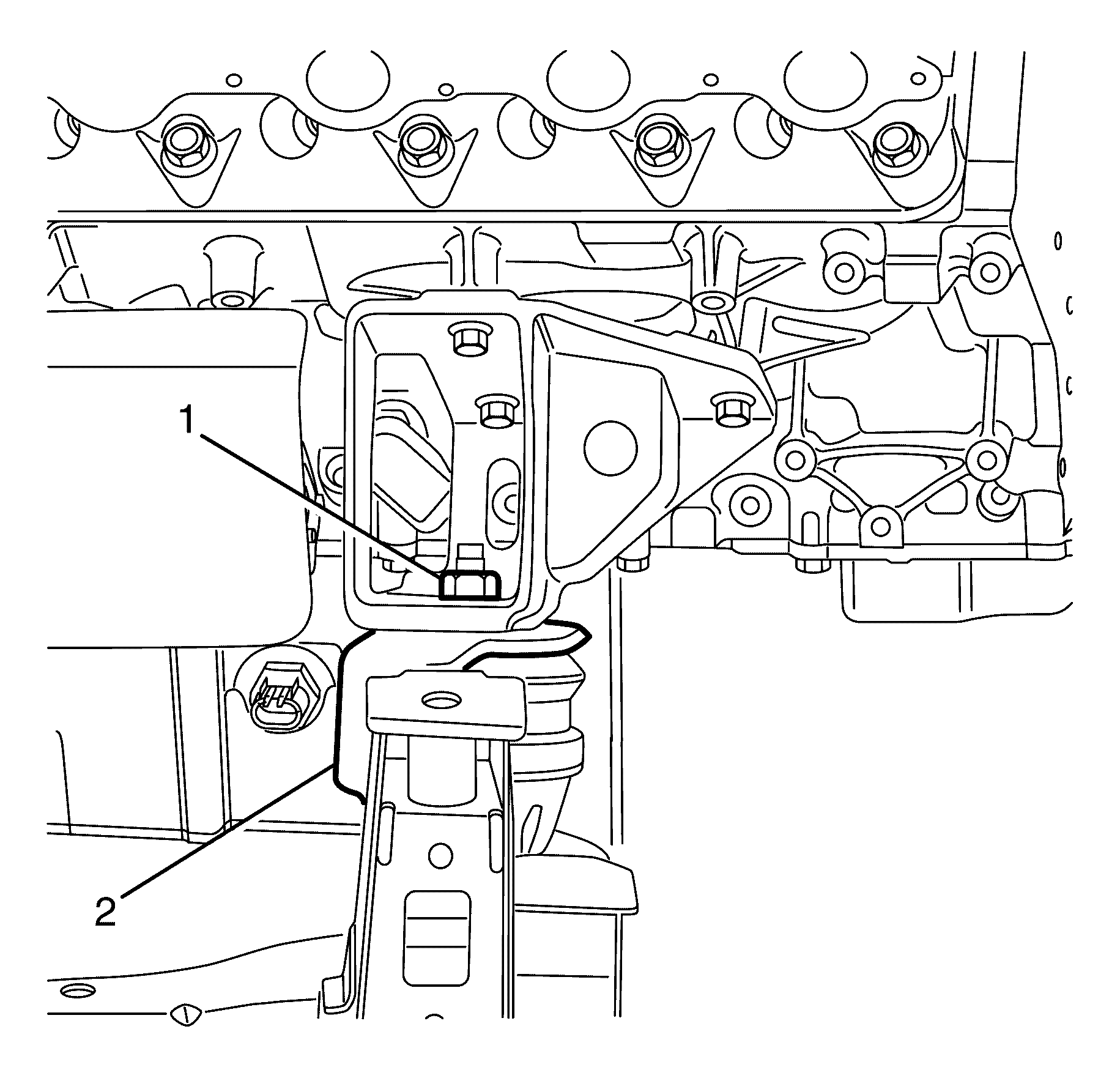
Important: DO NOT bend or distort the right side engine mount heat shield (2).
If required, mount engine to a suitable engine stand.
Installation Procedure
- Install the left side engine mount to engine mount bracket retaining nut (1)
- Install the right side engine mount to engine mount bracket retaining nut (1).
- Remove the lifting equipment as required and the J 41798 from the cylinder heads.
- Install the alternator bracket (2) to the engine.
- Install the alternator bracket to engine block retaining bolt (1).
- Install the alternator (3) to the alternator bracket.
- Install alternator to alternator bracket retaining bolts (1 and 2).
- Install the A/C compressor bracket (2) to the engine.
- Install the A/C compressor bracket to the cylinder block retaining bolts (1).
- Install the A/C drive belt tensioner (1) to the engine.
- Install the A/C drive belt tensioner to A/C compressor bracket retaining bolt (4).
- Install the A/C tensioner pulley (2) to the A/C tensioner.
- Install the A/C tensioner pulley to A/C tensioner retaining bolt (3).
- If you are replacing the compressor, balance the compressor oil. Refer to Air Conditioning Compressor Oil Balancing .
- Install the A/C compressor (2) to the A/C compressor bracket (3).
- Install the A/C compressor to A/C compressor bracket retaining bolts (1).
- Install the power steering pump bracket (2) to the engine.
- Install the power steering pump bracket to engine retaining bolts (1).
- Install a NEW sealing ring to the right side catalytic converter.
- Connect the right side catalytic converter (3) to the right side exhaust manifold (2).
- Install the right side catalytic converter to right side exhaust manifold retaining nuts (1).
- Install the right side exhaust manifold heat shield (1) to the right side exhaust manifold.
- Install the right side exhaust manifold heat shield to right side exhaust manifold retaining bolts (2).
- Install the right side spark plugs to the cylinder head. Refer to Spark Plug Replacement .
- Install the right side spark plug leads. Refer to Spark Plug Wire Replacement
- Install a NEW sealing ring to the left side catalytic converter.
- Connect the left side catalytic converter (2) to the left side exhaust manifold (3).
- Install the left side catalytic converter to left side exhaust manifold retaining nuts (1).
- Install the left side exhaust manifold heat shield (1) to the left side exhaust manifold.
- Install the left side exhaust manifold heat shield to left side exhaust manifold retaining bolts (2).
- Install the left side spark plugs to the cylinder head. Refer to Spark Plug Replacement .
- Install the left side spark plug leads. Refer to Spark Plug Wire Replacement
- Position the J 41798 (1) on the cylinder heads (3).
- Install the J 41798 to cylinder head retaining bolts (2).
- Using a suitable lifting crane and the J 41798 raise the engine slightly.
- Remove the engine from the engine stand.
- Lower the engine onto the front subframe.
- Position the engine mounts to the front subframe.
- Install the lower engine mount to front subframe retaining nuts (1) on both engine mounts.
- Position the power steering pump (2) to the power steering pump bracket (1).
- Install NEW power steering pump to power steering pump bracket retaining bolts (3).
- Install the power steering reservoir (2) to the power steering pump power steering reservoir bracket (1).
- Install the A/C drive belt. Refer to Air Conditioning Compressor Belt Replacement .
- Install the accessory drive belt. Refer to Drive Belt Replacement - Accessory .
- Install the engine flywheel. Refer to Engine Flywheel Installation .
- Connect a suitable lifting crane to the engine lift brackets and raise the suitable lifting crane to support the engine.
- Install the transmission. Refer to one of the following procedures:
- Position the automatic transmission cooler pipes (2) to the engine.
- Install the automatic transmission cooler pipe clamp to A/C bracket retaining bolt (1).
- Install the engine and transmission wiring harness and related components. Refer to Engine Wiring Harness Assembly Removal .
- With the aid of an assistant, raise the table and/or lower the vehicle to install the engine, transmission, front suspension and subframe assembly to the vehicle.
- Install the transmission support to body retaining bolts (1).
- Install the front subframe to body centre retaining bolt (1). Repeat for opposite side.
- Install the front subframe to body front retaining bolt (1). Repeat for opposite side.
- Install the front subframe to body rear retaining bolts (1).
- Install the front subframe reinforcement plate (3) to the subframe (1).
- Install the front subframe reinforcement plate to front subframe retaining bolts (2).
- Lower the lift table and/or raise the vehicle to remove the support from the frame, engine and transmission.
- Remove the powertrain and/or engine lift table from the frame, engine and transmission.
- Lower the vehicle.
- Check the torque of the strut assembly retaining nut (1), correct if necessary. Repeat for opposite side.
- Install the front strut assembly (3) to the front wheelhouse (4). Repeat for opposite side.
- Install front strut assembly to front wheelhouse retaining plate (1). Repeat for opposite side.
- Tighten the NEW front strut assembly to front wheelhouse retaining nut (2). Repeat for opposite side.
- Install the dust cover (1) to the front strut assembly to front wheelhouse retaining nut (2).
- Raise the vehicle.
- Remove the heavy mechanics wire or equivalent (2) retaining the front strut assembly (1) to the front subframe (3).
- Connect the intermediate steering shaft (1) to the pinion shaft (3).
- Install NEW the intermediate steering shaft to pinion shaft retaining bolt (2).
- Connect the front wheel speed sensor jumper harness electrical connector (1) to the front wheel speed sensor. Repeat for opposite side.
- Remove the heavy mechanic's wire, or equivalent support (2) from the brake caliper (1). Repeat for opposite side.
- Install the front brake caliper assembly (2) to the front steering knuckle (3). Repeat for opposite side.
- Install the NEW front brake caliper anchor plate to front steering knuckle retaining bolts (1).
- Attach the front brake hose (1) to the strut mounted brake hose retaining bracket (2). Repeat for opposite side.
- Install the front wheels. Refer to Tire and Wheel Removal and Installation .
- Install the shift selector linkage rod (1) to the shift selector shaft (2).
- Install the shift selector linkage rod to shift selector shaft retaining nut (3).
- Install the shift control assembly. Shift Control Assembly Replacement .
- Connect the to concentric actuator cylinder feed hose (3) to the concentric actuator cylinder feed pipe (1).
- Install the flexible hose securing clip (2).
- Install the starter motor. Refer to Starter Motor Replacement .
- Install the propeller shaft. Refer to Propeller Shaft Replacement .
- Install the centre exhaust heat shield. Refer to Exhaust Heat Shield Replacement - Center .
- Install the Exhaust system. Refer to Exhaust System Replacement .
- Remove the plug from the power steering cooler (3) and power steering reservoir inlet hose (2).
- Connect the power steering reservoir inlet hose (2) to the power steering cooler (3).
- Install the power steering reservoir inlet hose spring clamp (1) to its original location
- Remove the plug from the power steering cooler (3) and power steering reservoir inlet hose (1).
- Connect the power steering reservoir inlet hose (1) to the power steering cooler (3).
- Install the power steering reservoir inlet hose spring clamp (2) to its original location
- Install the engine splash shield. Refer to Engine Splash Shield Replacement .
- Install the front air deflector. Refer to Front Air Deflector Replacement .
- Lower the vehicle.
- Remove the clean lint free cloth at the automatic transmission cooler pipes (2) and the flexible hoses (1).
- Align both flexible hose's with both steel cooler lines.
- Hold the cooler line (2) and connect the flexible hose (1) by pushing together. Repeat procedure for other hose.
- Check and top up transmission fluid level if required. Refer to Transmission Fluid Level Inspection . Refer to Transmission Fluid Level Inspection .
- Remove the large zip ties or equivalent securing the radiator and condenser assembly (2) to the front end assembly (3).
- Remove the plug or cap at the A/C suction pipe ends (1 and 3)
- Fit the NEW A/C suction pipe sealing O-ring (2) to the suction pipe.
- Install the upper A/C suction pipe (1) to the lower A/C suction pipe (3).
- Install the A/C suction pipe pad to A/C suction pipe retaining nut (1).
- Remove the plug from the throttle body to EVAP purge valve tube (3) and EVAP purge valve (1) ends.
- Connect the throttle body to EVAP purge valve tube (3) to the EVAP purge valve (1).
- Remove the plug from the EVAP purge valve to fuel tank tube (2) and EVAP purge valve (1) ends.
- Connect the EVAP purge valve to fuel tank tube (2) to the EVAP purge valve (1).
- Install the wiring harness (2) to the remote positive battery post.
- Install the remote positive battery post to wiring harness retaining bolt (1).
- Install the remote positive battery post cover (1).
- Remove the plug from the fuel feed pipe (2) and fuel rail pipe (1) ends.
- Connect the fuel rail feed pipe (2) quick connect fitting. Refer to Metal Collar Quick Connect Fitting Service or Plastic Collar Quick Connect Fitting Service .
- Connect the vacuum brake booster hose (3) from the intake manifold vacuum port (1).
- Compress the vacuum brake booster hose retaining clamp (2) and return to its original position on the vacuum brake booster hose (3).
- Remove the plug from the compressor (3) ports.
- Remove the plug from the pipes (1).
- Fit the NEW A/C suction/discharge pipe O-rings (2) to the suction/discharge pipes (1).
- Connect the A/C suction/discharge line pad (1) to the A/C compressor (3).
- Install the suction/discharge line pad (1) to compressor and tighten the retaining bolt (1) to the correct torque specification.
- Connect the electrical connector to the A/C Refrigerant Pressure Sensor (1) to the A/C refrigerant sensor.
- Connect the A/C electrical connector (1) to the A/C compressor.
- Install the vehicle body ground cable (3) to the cylinder head stud (2).
- Install the vehicle body ground cable to cylinder head retaining nut (1).
- Slide the engine connector (3) into the body harness connector (1) to join.
- Install the protector (1) to the base of the under hood BEC connector (2).
- Install the upper under hood BEC plate (1) to the lower under hood BEC plate (3).
- Install the under hood BEC upper plate to lower plate retaining bolts (2).
- Connect the positive cable (2) to the upper under hood BEC plate (4).
- Install the positive cable to under hood BEC plate retaining bolt (5).
- Install the positive cable protective cover (3) to the positive cable.
- Install the under hood body electrical centre (BEC) cover (1).
- Connect the ECM electrical connectors (1) to the ECM.
- Engage the ECM retaining clips (1) to secure the ECM (2).
- Connect the inlet and outlet heater hoses (3) at the heater hose assembly quick connect fittings (1).
- Connect the coolant air bleed hose (3) to the coolant bleed pipe (2).
- Reposition the coolant bleed hose retaining clamp (1) to its original position on the coolant bleed hose (3).
- Tighten the coolant bleed hose retaining clamp (1).
- Install the radiator outlet hose. Refer to Radiator Outlet Hose Replacement .
- Fill the cooling system. Refer to Cooling System Draining and Filling .
- Install the air intake duct. Refer to Air Cleaner Inlet Duct Replacement .
- Recharge the air conditioning (A/C) system. Refer to Refrigerant Recovery and Recharging .
- Install the radiator air baffle and deflector. Refer to Radiator Air Upper Baffle and Deflector Replacement .
- Install the engine cover. Refer to Engine Cover Replacement .
- Connect the negative battery cable. Refer to Battery Negative Cable Disconnection and Connection .
- Bleed The clutch. Refer to Hydraulic Clutch Bleeding .
- Disable the ignition system.
- Crank the engine several times. Listen for any unusual noises or evidence that parts are binding.
- Enable the ignition system.
- Start the engine and listen for unusual noises.
- Check the vehicle oil pressure gauge and confirm that the engine has acceptable oil pressure.
- Run the engine speed at about 1,000 RPM until the engine has reached normal operating temperature.
- Listen for sticking lifters and other unusual noises.
- Inspect for fuel, oil, and/or other coolant leaks while the engine is running.

Important: DO NOT bend or distort the left side engine mount heat shield (4).
Tighten
Tighten the nut to 80 N·m (59 lb ft).

Important: DO NOT bend or distort the right side engine mount heat shield (4).
Tighten
Tighten the nut to 80 N·m (59 lb ft).

Tighten
Tighten the bolt to 50 N·m (37 lb ft).

Tighten
Tighten the bolts to 34 N·m (25 lb in).

Notice: Refer to Fastener Notice in the Preface section.
Tighten
Tighten the bolts to 58 N·m(43 lb ft).

Notice: Refer to Fastener Notice in the Preface section.
Tighten
Tighten the bolt to 22 N·m (16 lb ft).
Tighten
Tighten the bolt to 50 N·m (37 lb ft).

Tighten
Tighten the bolts to 22 N·m (16 lb ft).

Tighten
Tighten the bolts to 58 N·m (43 lb ft).

Important: Make sure that a new sealing ring is fitted prior to installation. If not the exhaust system may perform poorly.
Tighten
Tighten the nuts to 45 N·m (33 lb ft).

Tighten
Tighten the bolts to 10 N·m (89 lb in).

Important: Make sure that a new sealing ring is fitted prior to installation. If not the exhaust system may perform poorly.
Tighten
Tighten the nuts to 45 N·m (33 lb ft).

Tighten
Tighten the bolts to 10 N·m (89 lb in).

Notice: Refer to Fastener Notice in the Preface section.
Tighten
Tighten the bolts to 50 N·m (36 lb ft).

Tighten
Tighten the nuts to 80 N·m (59 lb ft).

Tighten
Tighten the bolts to 30 N·m (23 lb ft).

Important: Make sure the power steering reservoir (2) and the power steering reservoir bracket locking tang (1) are engaged to avoid an induced rattle condition.
| • | Transmission Replacement in Manual Transmission -- Tremec 6-speed. |
| • | Transmission Replacement in Automatic Transmission -- 4L60-E/4L65-E/4L70-E. |

Tighten
Tighten the bolt to 22 N·m (16 lb ft).
Important: Make sure that all the hoses, wires, pipes and shock modules clear the vehicle during the installation process.

Tighten
Tighten the bolts to 58 N·m (42 lb ft).

Tighten
Tighten the bolts to 160 N·m (118 lb ft).

Tighten
Tighten the bolts to 160 N·m (118 lb ft).

Tighten
Tighten the bolts to 240 N·m (178 lb ft).

Tighten
Tighten the bolts to 17 N·m (11 lb ft).
Notice: Refer to Fastener Notice in the Preface section.
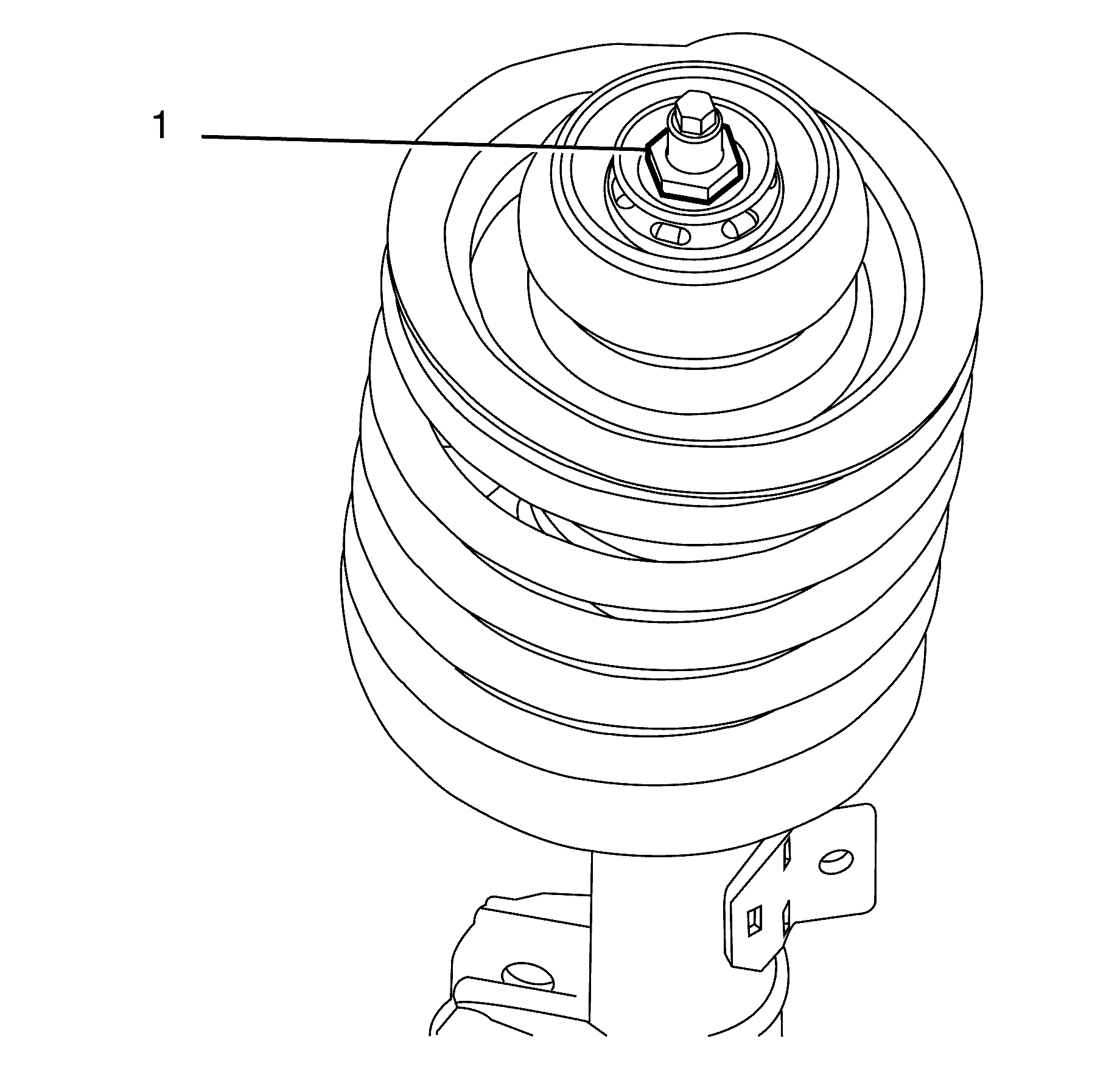
Important: The strut assembly retaining nut (1) must be checked for correct torque before installing the strut assembly into the vehicle. The strut assembly retaining nut torque must be 75 N·m (55 lb ft).
Tighten
Tighten the nut to 75 N·m (55 lb ft).
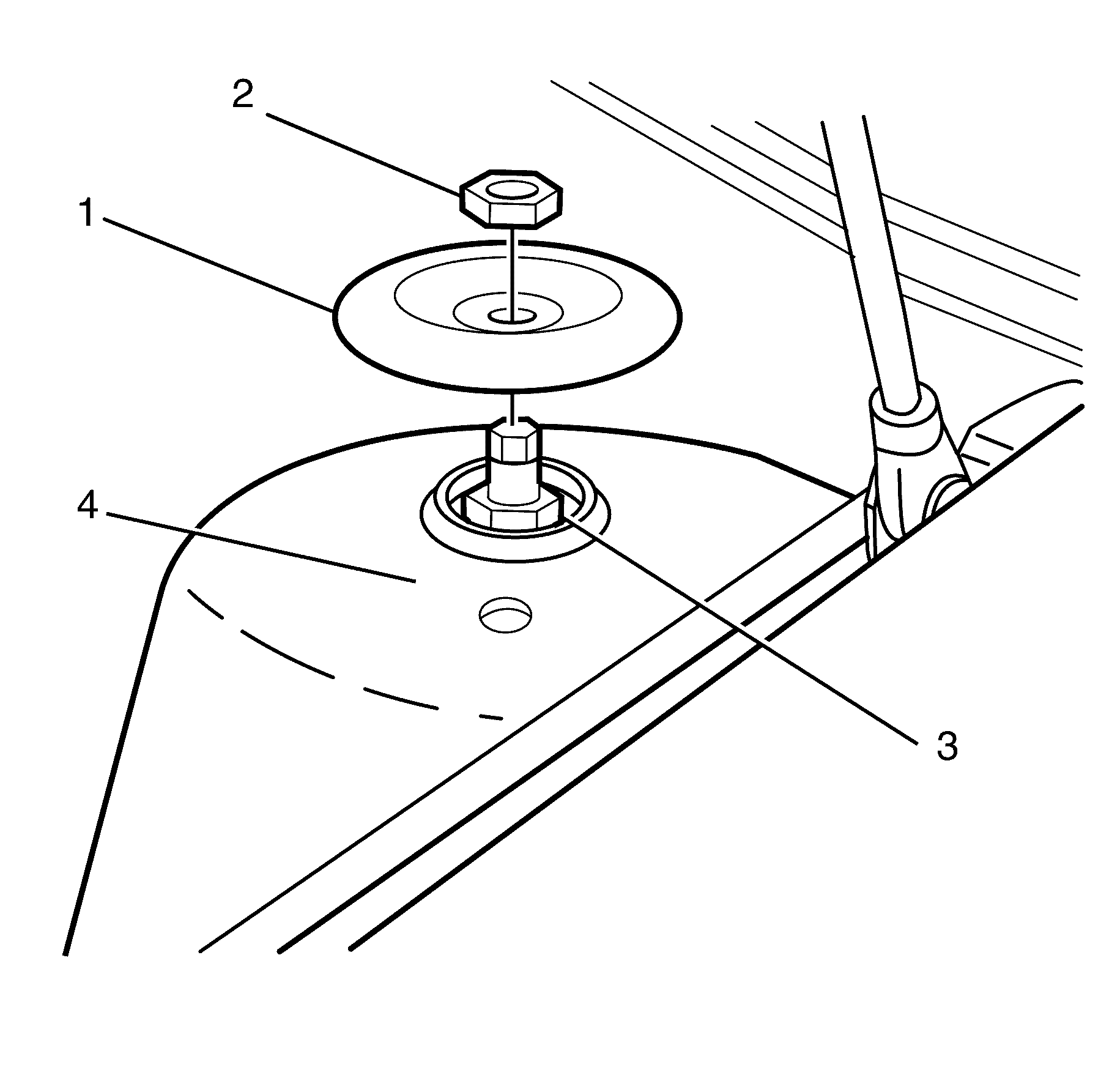
Tighten
Tighten the nut to 55 N·m (41 lb ft).
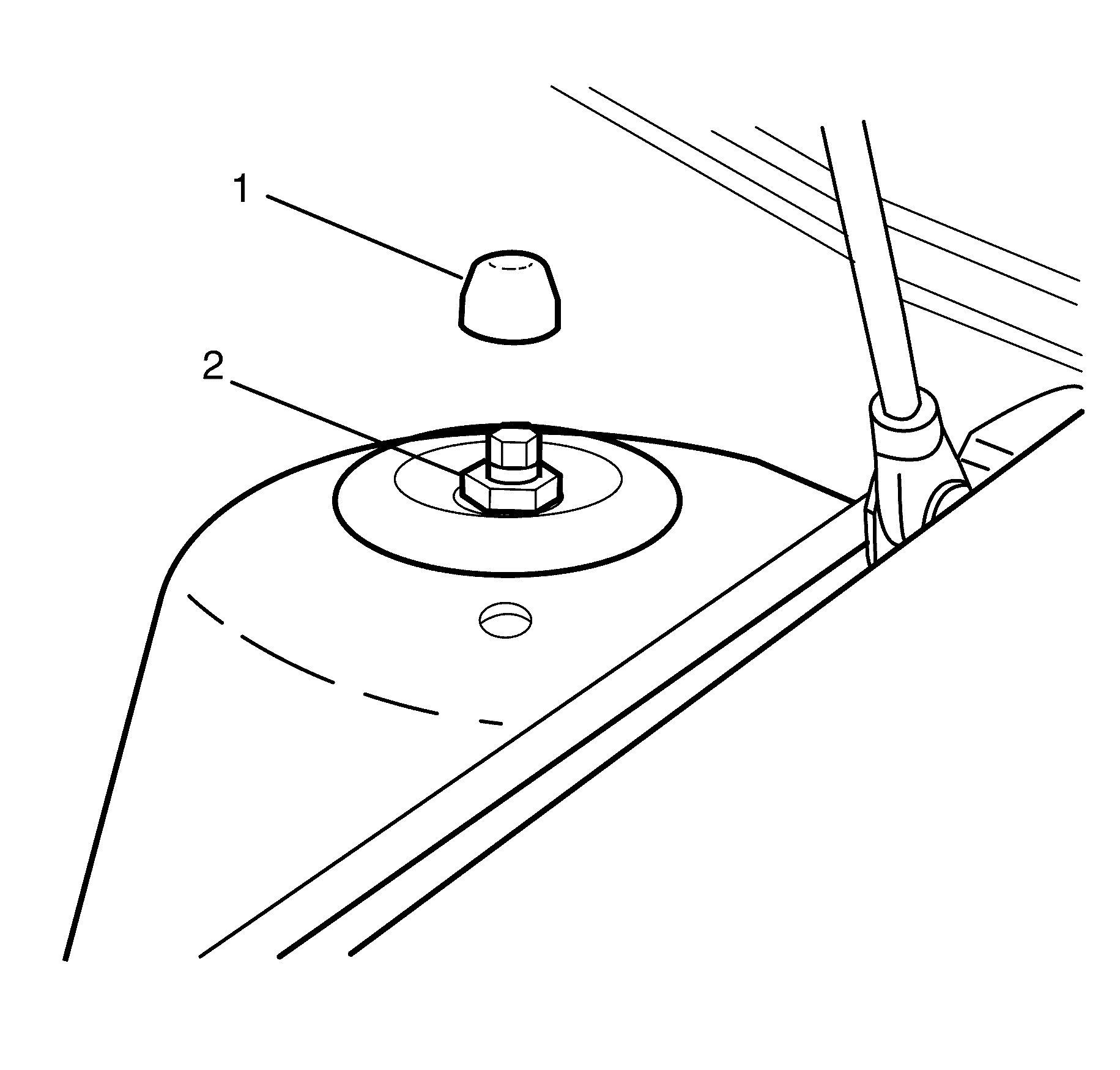


Important: The intermediate steering shaft and pinion shaft splines must be installed in the position recorded during removal and aligned with the marks previously made.
Tighten
Tighten the bolt to 25 N·m (18 lb ft).

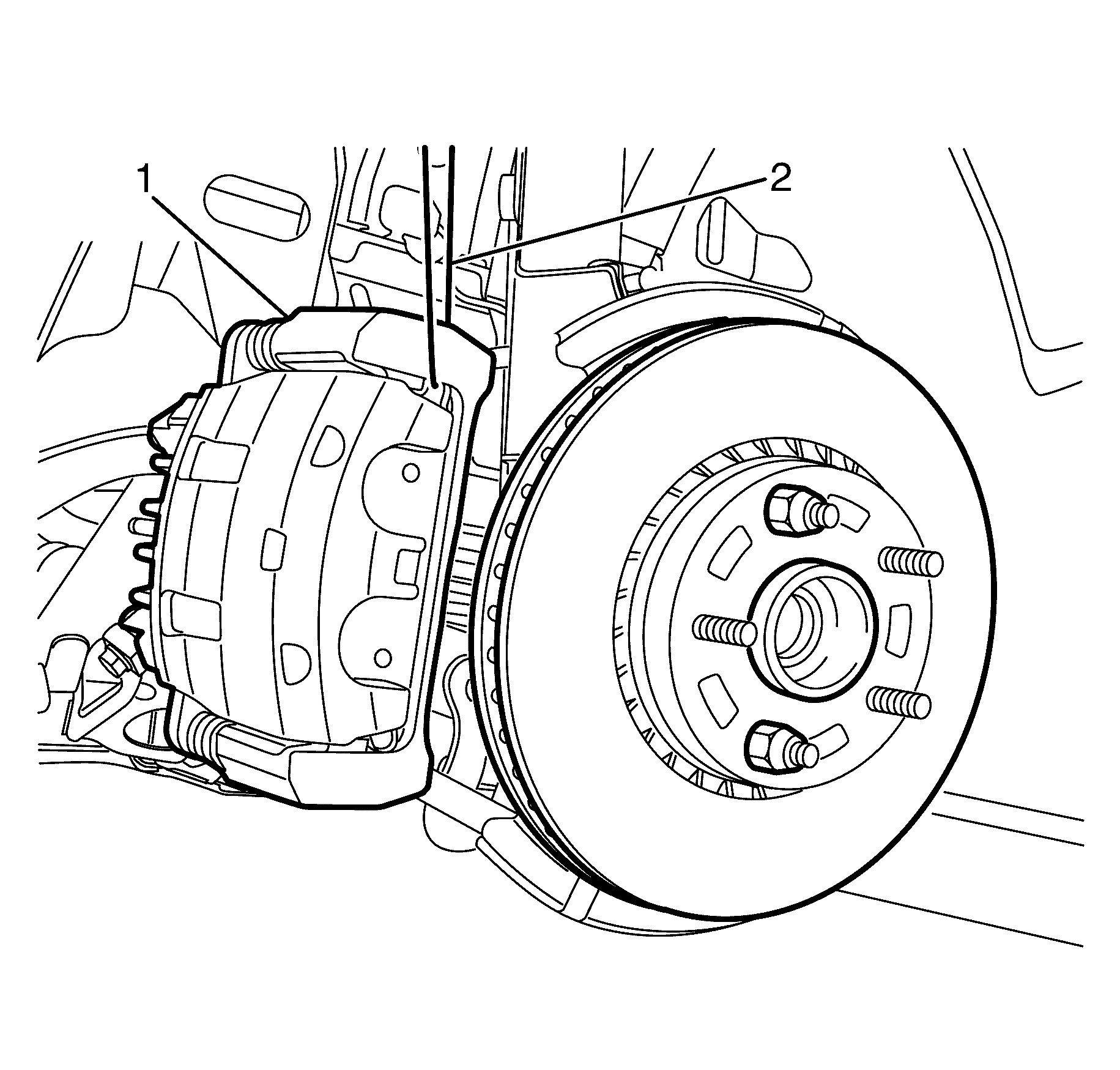

Notice: Make sure the brake hose is not twisted or kinked after installation. Damage to the hose could result.
Tighten
Tighten the bolts to 60 N·m +120°
(44 lb in +120°).

Notice: Make sure the brake hose is not twisted or kinked after installation. Damage to the hose could result.

Important: Ignore steps 76 and 77 for vehicles fitted with an manual transmission.
Tighten
Tighten the nut to 25 N·m (18 lb ft).
Important: Ignore steps 78 through to 80 for vehicles fitted with an automatic transmission .

Important: Listen for an audible click to confirm fitting.


Important: Ignore steps 94 through to 97 for vehicles equipped with a manual transmission.

Important: The flexible hoses are not serviced separately. Therefore if the hose's require replacement, then the hose and radiator to hose cooler hose assembly must be fitted.
Important: Listen for an audible click to confirm fitting.
Important: When adding or changing transmission fluid use only recommend automatic transmission fluid.

Important: Cut zip tie A and zip tie B and remove from around the front end assembly (3) and the radiator and condenser mount (1).

Important: The A/C sealing O-rings must be fitted dry. DO NOT lubricate the A/C sealing O-rings.

Tighten
Tighten the nut to 22 N·m(16 lb ft).


Tighten
Tighten the bolt to 15 N·m (11 lb ft).

Important: Make sure the clips on the remote positive battery post cover (1) are engaged to avoid an induced rattle condition.

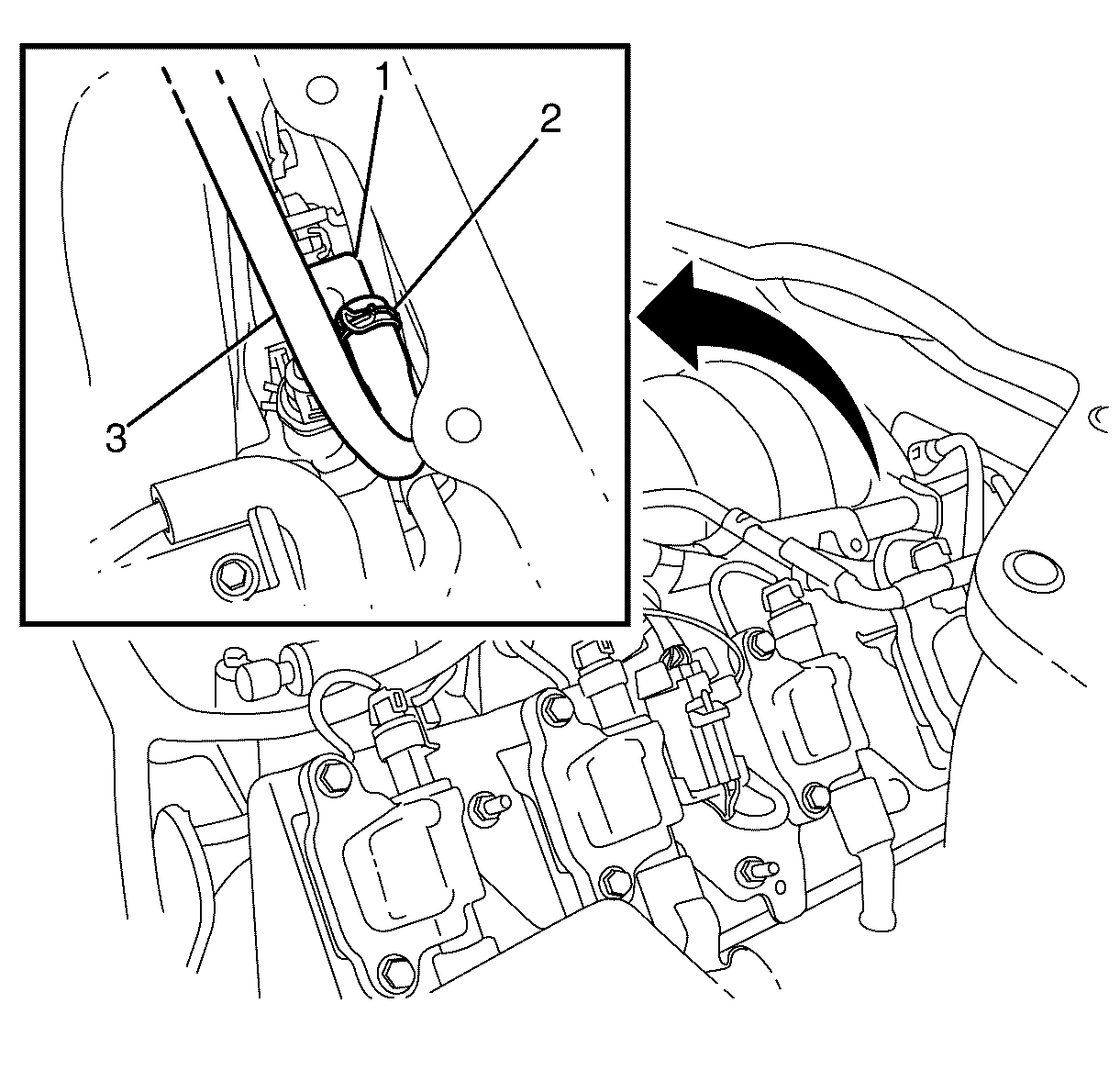

Important: The A/C sealing O-rings must be fitted dry. DO NOT lubricate the A/C sealing O-rings.

Tighten
Tighten the bolt to 22 N·m (16 lb ft).



Tighten
Tighten the bolt to 12 N·m(106 lb in).

Important: Listen for a audible click from the locking tang (2) to confirm fitting.
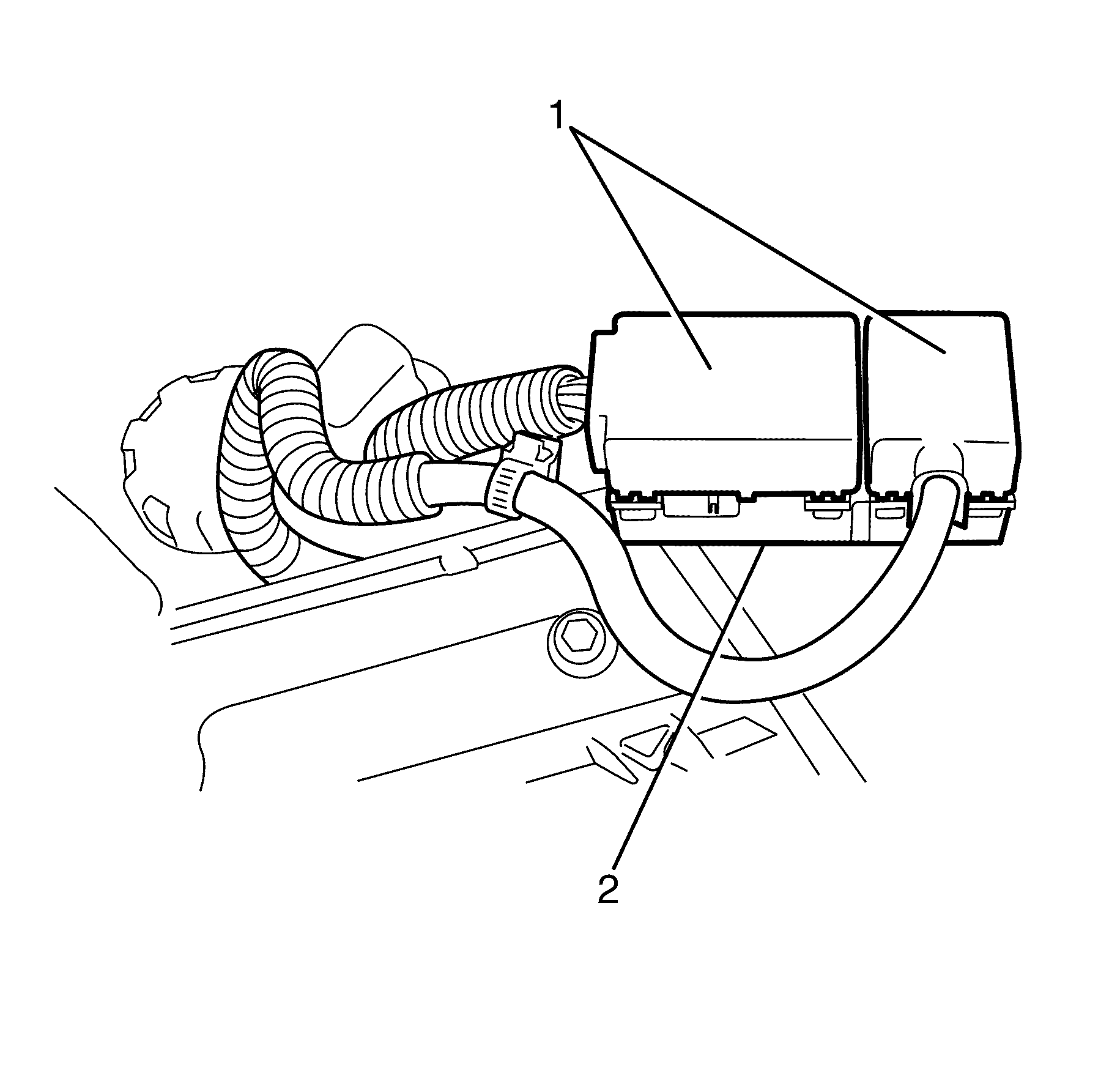

Important: The under hood BEC upper plate to lower plate retaining bolts (2) DO NOT have a torque specification. Listen for an audible clicking sound whilst tightening the under hood BEC upper plate to lower plate retaining bolts (2) to confirm correct fitting.
Listen for an audible click for correct tension.

Tighten
Tighten the bolt to 10 N·m (89 lb ft).
Notice: Refer to General Repair Instructions in the Preface section.



Important: Listen for a audible click to confirm fitting.

If necessary, install an oil pressure gauge and measure the engine oil pressure.
Engine Replacement RHD
Tools Required
J 41798 Engine Lifting Brackets
Removal Procedure
- Turn the ignition key to the LOCK position.
- Disconnect the negative battery cable. Refer to Battery Negative Cable Disconnection and Connection.
- Remove the engine cover. Refer to Engine Cover Replacement.
- Remove the radiator air baffle and deflector. Refer to Radiator Air Upper Baffle and Deflector Replacement.
- Recover the air conditioning (A/C) refrigerant. Refer to Refrigerant Recovery and Recharging.
- Remove the air intake duct. Refer to Air Cleaner Inlet Duct Replacement.
- Depressurize the fuel system. Refer to Fuel Pressure Relief.
- Drain the cooling system. Refer to Cooling System Draining and Filling.
- Remove the radiator outlet hose. Refer to Radiator Outlet Hose Replacement.
- Loosen the coolant bleed hose retaining clamp (1) at the cylinder head end and slide 50 mm (2 in) along the coolant bleed hose (3).
- Disconnect the coolant air bleed hose (3) from the coolant bleed pipe (2).
- Disconnect the inlet and outlet heater hoses (3) from the heater hose assembly quick connect fittings (1).
- Release the ECM retaining clips (1) and detach the ECM (2).
- Move the connector lock levers to the unlock position and disconnect the ECM electrical connectors (1).
- Remove the under hood body electrical centre (BEC) cover (1).
- Remove the positive cable protective cover (3).
- Remove the positive cable to under hood BEC plate retaining bolt (5).
- Disconnect the positive cable (2) from the upper under hood BEC plate (4).
- Remove the under hood BEC upper plate to lower plate retaining bolts (2).
- Raise the upper under hood BEC plate (1) from the lower under hood BEC plate (3).
- Detach the protector (1) from the base of the under hood BEC connector (2).
- Separate the body harness connector (1) from the engine connector (3).
- Reposition and secure the engine wiring harness and connector (3) on the engine.
- Remove the vehicle body ground cable to cylinder head retaining nut (1).
- Remove the vehicle body ground cable (3) from the cylinder head stud (2).
- Disconnect the A/C electrical connector (1) from the A/C compressor.
- Disconnect the electrical connector from the A/C Refrigerant Pressure Sensor (1).
- Remove the suction/discharge pipes pad (1) to compressor retaining bolt (2).
- Disconnect the suction/discharge pipes (1) from the compressor (3).
- Remove and discard the port sealing washers (2).
- Cap or plug the A/C compressor (3) ports.
- Cap or plug the A/C hoses (1).
- Compress the vacuum brake booster hose retaining clamp (2) at the intake manifold vacuum port (1) and slide 50 mm (2 in) back along the vacuum brake booster hose (3).
- Disconnect the vacuum brake booster hose (3) from the intake manifold vacuum port (1).
- Disconnect the fuel rail feed pipe (2) quick connect fitting. Refer to Metal Collar Quick Connect Fitting Service or Plastic Collar Quick Connect Fitting Service.
- Remove the remote positive battery post cover (1) from the remote positive battery post.
- Remove the remote positive battery post to wiring harness retaining bolt (1).
- Remove the wiring harness (2) from the remote positive battery post.
- Disconnect the throttle body to EVAP purge valve hose (3) from the EVAP purge valve (1).
- Disconnect the EVAP purge valve to fuel tank hose (2) from the EVAP purge valve (1).
- Remove the A/C suction pipe pad to lower A/C suction pipe retaining nut (1).
- Disconnect the upper A/C suction pipe (1) from the lower A/C suction pipe (3).
- Plug or cap the A/C suction pipe ends.
- Remove and discard the A/C suction pipe sealing O-ring (2).
- Reposition and retain the A/C suction/discharge pipes away from the engine.
- Secure radiator and condenser assembly (2) to the front end assembly (3) with large zip ties or equivalent.
- Place a suitable container beneath the radiator and engine.
- Disconnect the automatic transmission cooler pipe (2) from the flexible hose (1) at the quick connect fitting using tool. AU525.
- Reposition and secure the flexible hoses (1) away from the engine and subframe.
- Raise and support the vehicle. Refer to Lifting and Jacking the Vehicle.
- Remove the front air deflector. Refer to Front Air Deflector Replacement.
- Remove the engine splash shield. Refer to Engine Splash Shield Replacement.
- Place a suitable container under the power steering cooler.
- Release the power steering gear outlet hose spring clamp (2) and disconnect the power steering gear outlet hose (1) from the power steering cooler (3).
- Release the power steering reservoir inlet pipe/hose spring clamp (1) and disconnect the power steering reservoir inlet hose (2) from the power steering cooler (3).
- Remove the exhaust system. Refer to Exhaust System Replacement.
- Remove the centre heat shield. Refer to Exhaust Heat Shield Replacement - Center.
- Remove the propeller shaft. Refer to Propeller Shaft Replacement.
- Remove the starter. Refer to Starter Motor Replacement.
- Remove the shift selector linkage rod to shift selector shaft retaining nut (3).
- Remove the shift selector linkage rod (1) from the shift selector shaft (2).
- Remove the shift control assembly. Refer to Shift Control Assembly Replacement.
- Remove the flexible hose securing clip (2).
- Disconnect the to concentric actuator cylinder feed hose (3) from the concentric actuator cylinder feed pipe (1).
- Remove the front wheels. Refer to Tire and Wheel Removal and Installation.
- Detach the front brake hose (1) from the front strut mounted brake hose retaining bracket (2). Repeat for opposite side.
- Remove the front brake caliper anchor plate to knuckle retaining bolts (1). Repeat for opposite side.
- Remove the front brake caliper (2) from the front steering knuckle (3). Repeat for opposite side.
- Support the brake caliper (1) with heavy mechanic's wire, or equivalent (2).
- Remove the two wheel nuts (4) retaining the front brake disc (3) to the hub (5). Repeat for opposite side.
- Disconnect the front wheel speed sensor jumper harness electrical connector (1) and secure away from the front subframe and suspension components. Repeat for opposite side.
- Mark the intermediate steering shaft (1) in relation to the pinion shaft (3).
- Remove the intermediate steering shaft to pinion shaft retaining bolt (2).
- Disconnect the intermediate shaft (2) from the pinion shaft (3).
- Lower the vehicle.
- Retain the front strut assembly (1) to the front subframe (3) using heavy mechanics wire or equivalent (2). Repeat for opposite side.
- Remove the stud dust cover (1) from the strut assembly to front wheelhouse retaining nut (2). Repeat for opposite side.
- Remove the strut assembly to front wheelhouse retaining nut (2) while holding the strut piston shaft (4). Repeat for opposite side.
- Remove the strut assembly to front wheelhouse retaining plate (3). Repeat for opposite side.
- Position a suitable powertrain and/or engine lift table below the frame, engine and transmission.
- Raise the lift table and/or lower the vehicle to support the frame, engine and transmission.
- Remove the transmission support to body retaining bolts (1).
- Remove the front subframe reinforcement plate to front subframe retaining bolts (2).
- Remove the front subframe reinforcement plate (3) from the front subframe (1).
- Remove the front subframe to body rear retaining bolts (1).
- Remove the front subframe to body front retaining bolt (1). Repeat for opposite side.
- Remove the front subframe to body retaining bolt (1). Repeat for opposite side.
- With the aid of an assistant, lower the table and/or raise the vehicle to remove the engine, transmission, front suspension and subframe assembly from the vehicle.
- Remove the engine and transmission wiring harness and related components. Refer to Engine Wiring Harness Assembly Removal.
- Remove the automatic transmission cooler pipe clamp to A/C bracket bolt (1) and position the automatic transmission cooler pipes (2) aside.
- Connect a suitable lifting crane to the engine lift brackets and raise the suitable lifting crane to support the engine.
- Position a second powertrain lift table below the transmission.
- Remove the transmission. Refer to one of the following procedures:
- Remove the engine flywheel. Refer to Engine Flywheel Removal.
- Remove the accessory drive belt. Refer to Drive Belt Replacement - Accessory.
- Remove the A/C drive belt. Refer to Air Conditioning Compressor Belt Replacement.
- Remove the power steering reservoir (2) from the power steering pump power steering reservoir bracket (1) and position the power steering reservoir (2) aside.
- Remove the power steering pump (2) to power steering pump bracket retaining bolts (3) and position the power steering pump (2) away from the power steering pump bracket (1).
- Position the J 41798 J 41798 (1) on the cylinder head (3).
- Install the J 41798 J 41798 to cylinder head retaining bolts (2).
- Attach a suitable lifting chain and hooks to the engine lifting brackets (1).
- Remove the lower engine mount to front subframe retaining nut (1) from both engine mounts.
- Using a suitable lifting crane, raise the engine to clear the engine mount stud.
- Remove the engine from the subframe
- Remove the left side spark plug leads. Refer to Spark Plug Wire Replacement.
- Remove the left side spark plugs from the cylinder head. Refer to Spark Plug Replacement.
- Remove the exhaust manifold heat shield to exhaust manifold retaining bolts (2).
- Remove the left side exhaust manifold heat shield (1).
- Remove the left side catalytic converter to exhaust manifold retaining nuts (1).
- Disconnect the left side catalytic converter (2) from the exhaust manifold (3).
- Remove the right side spark plug leads. Refer to Spark Plug Wire Replacement.
- Remove the right side spark plugs from the cylinder head. Refer to Spark Plug Replacement.
- Remove the right side exhaust manifold heat shield to right side exhaust manifold retaining bolts (2).
- Remove the right side exhaust manifold heat shield (1).
- Remove the right side catalytic converter to exhaust manifold retaining nuts (1).
- Disconnect the right side catalytic converter (3) from the exhaust manifold (2).
- Remove the power steering pump bracket to engine retaining bolts (1).
- Remove the power steering pump bracket (2).
- Remove the compressor to A/C compressor bracket retaining bolts (1).
- Remove the compressor (2) to the A/C compressor bracket (3).
- Remove the A/C tensioner pulley to A/C tensioner retaining bolt (3).
- Remove the A/C tensioner pulley (2).
- Remove the A/C drive belt tensioner to A/C compressor bracket retaining bolt (4).
- Remove the A/C drive belt tensioner (1).
- Remove the A/C compressor bracket to cylinder head retaining bolts (1).
- Remove the A/C compressor bracket (2).
- Remove alternator to alternator bracket retaining bolts (1 and 2).
- Remove the alternator (3) from the alternator bracket.
- Remove the alternator bracket to engine block mounting bolt (1).
- Remove the alternator bracket (2) from the engine.
- Remove the left side engine mount to engine mount bracket retaining nut (1).
- Remove the right side engine mount to engine mount bracket retaining nut (1).
- Attach a suitable lifting chain and hooks to the 2 J 41798 J 41798, engine lifting brackets.
- Using a suitable lifting crane, remove the engine from the subframe.
- Remove the lifting equipment as required.
Important: Observing the orientation of the intermediate steering shaft (1) with reference to the pinion shaft (3) will minimise the potential of incorrect steering column assembly alignment.
Important: The front wheels of the vehicle must be maintained in the straight ahead position and the steering column must be in the LOCK position before disconnecting the steering column or intermediate shaft. If these procedures are not followed incorrect alignment of some components during installation will result and damage to the SIR coil assembly will occur.
Caution: Refer to Battery Disconnect Caution in the Preface section.


Important: Disconnect the heater hose assembly quick connect fittings (1) by releasing the retaining clips (2) using a suitable tool.
Notice: Do not touch the connector pins or soldered components on the circuit board in order to prevent possible electrostatic discharge (ESD) damage to the PCM.






Important: Use a suitable tool to depress the connector locking tang (2), then pull the body harness connector (1) upward and the engine connector (3) downward to separate the body harness connector (1) from the engine connector (3).





Important: Sealing washers are single use and must be discarded after use.
Important: Seal pipes immediately to prevent absorption of moisture from the atmosphere.
Important: The plugs for A/C compressor ports must be sufficient to stop oil escaping when tilting A/C compressor for removal.
Discard the port sealing washers (2).
Important: Cap or plug the ports immediately to prevent absorption of moisture from the atmosphere.


Important: Plug or cap the fuel feed pipe (2) and fuel rail tube (1) ends to prevent fuel leaks and/or contamination.



Important: Plug or cap the throttle body to EVAP purge valve hose (3) and EVAP purge valve (1) ends to prevent fuel leaks and/or contamination.
Important: Plug or cap the EVAP purge valve to fuel tank hose (2) and EVAP purge valve (1) ends to prevent fuel leaks and/or contamination.


Important: Plug or cap the A/C suction pipe ends (1 and 3) immediately to prevent contamination and absorption of moisture from the atmosphere.
Important: The A/C suction pipe sealing O-ring (2) is a single use component and will not reseal. Install a NEW A/C suction pipe sealing O-ring (2) whenever the upper A/C suction pipe (1) is removed from the lower A/C suction pipe (3).
Discard the A/C suction pipe sealing O-ring (2).

Important: It is necessary to secure the radiator and condenser assembly (2) to the front end assembly (3) as the radiator and condenser assembly is supported to the subframe.
Important: Thread zip tie A around the front end assembly and zip tie B through the radiator and condenser mount (1). Insert zip tie A into the retainer of zip tie B and insert zip tie B into the retainer of zip tie A.
Important: Ignore steps 47 - 49 for vehicles equipped with a manual transmission.
Important: The flexible hoses are not serviced separately. Therefore if the hose's require replacement, then the hose and radiator to hose cooler hose assembly must be fitted.
Important: When removal is complete plug hose openings with a clean lint free cloth to prevent foreign matter entry.

| • | Open release tool AU525 then close and clip around the hose to be disconnected. |
| • | While holding the flexible hose (1) push the hose inwards with one hand, then pull back to separate from the steel hose piping (2). |
| • | Repeat for the second fitting if required. |
Caution: Refer to Safety Glasses Caution in the Preface section.
Caution: Refer to Vehicle Lifting Caution in the Preface section.

Important: The power steering cooler (3) must be plugged to prevent the entry of foreign particles into the power steering system.
Plug the power steering cooler (3) and power steering gear outlet hose (1).

Important: The power steering cooler (3) must be plugged to prevent the entry of foreign particles into the power steering system.
Plug the power steering cooler (3) and power steering reservoir inlet hose (2).

Important: Ignore steps 60 to 62 for vehicles fitted with an manual transmission.
Important: Ignore steps 63 to 65 for vehicles fitted with an automatic transmission.

Important: Use a suitable tool to remove the flexible hose securing clip (2), take care not to lose the flexible hose securing clip (2) on removal.


Important: Nuts with micro-encapsulated thread sealant must be discarded after removal.
Discard the bolts.
Important: DO NOT disconnect the hydraulic brake flexible hose from the brake caliper otherwise complete bleeding of the braking system will be necessary.

Notice: Support the brake caliper with heavy mechanic wire, or equivalent, whenever it is separated from its mount and the hydraulic flexible brake hose is still connected. Failure to support the caliper in this manner will cause the flexible brake hose to bear the weight of the caliper, which may cause damage to the brake hose and in turn may cause a brake fluid leak.

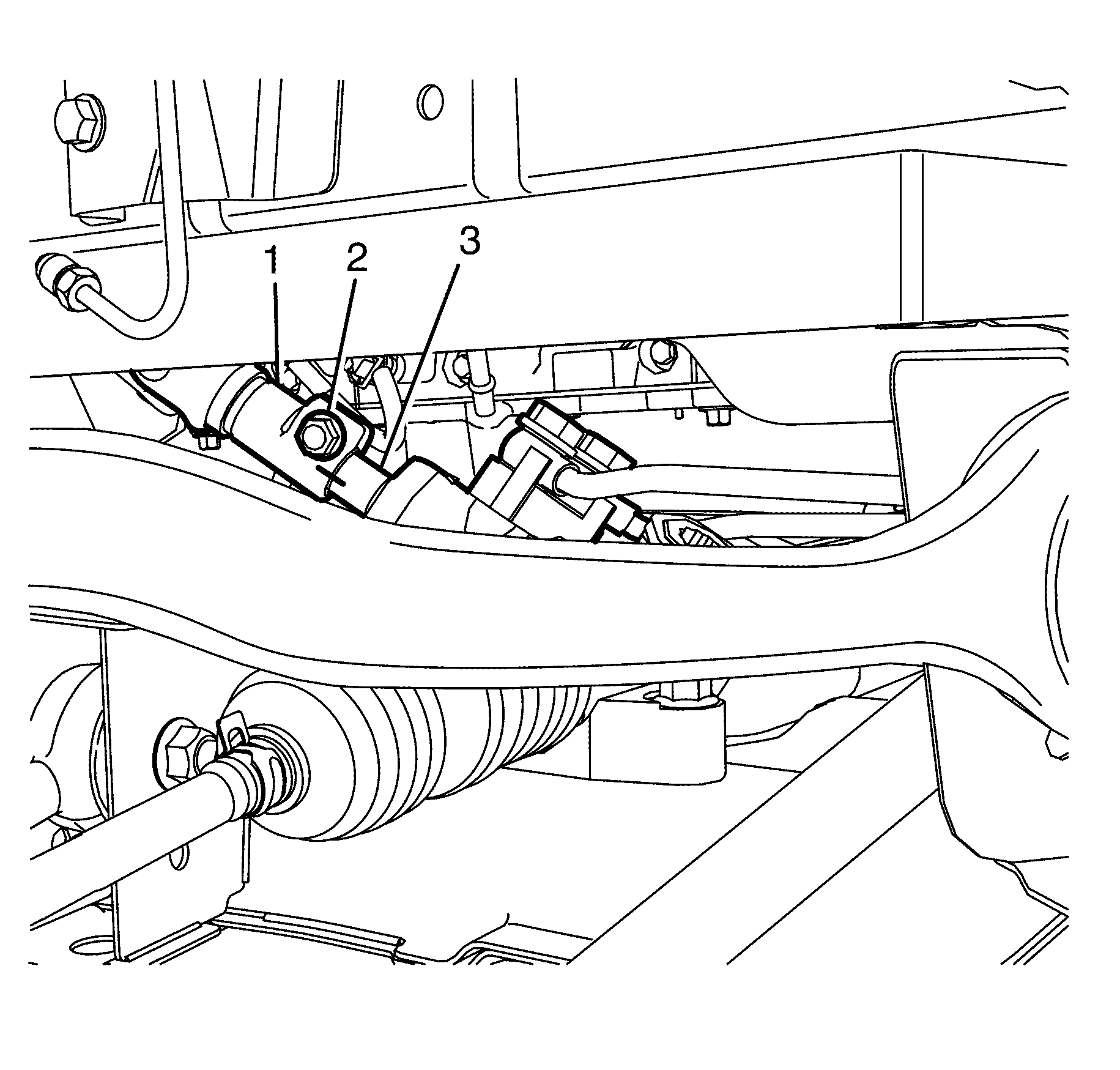
Important: Observing the orientation of the intermediate steering shaft (1) with reference to the pinion shaft (3) will minimise the potential of incorrect steering column assembly alignment.
Important: Bolts with micro-encapsulated thread sealant must be discarded after removal.
Discard the bolt.
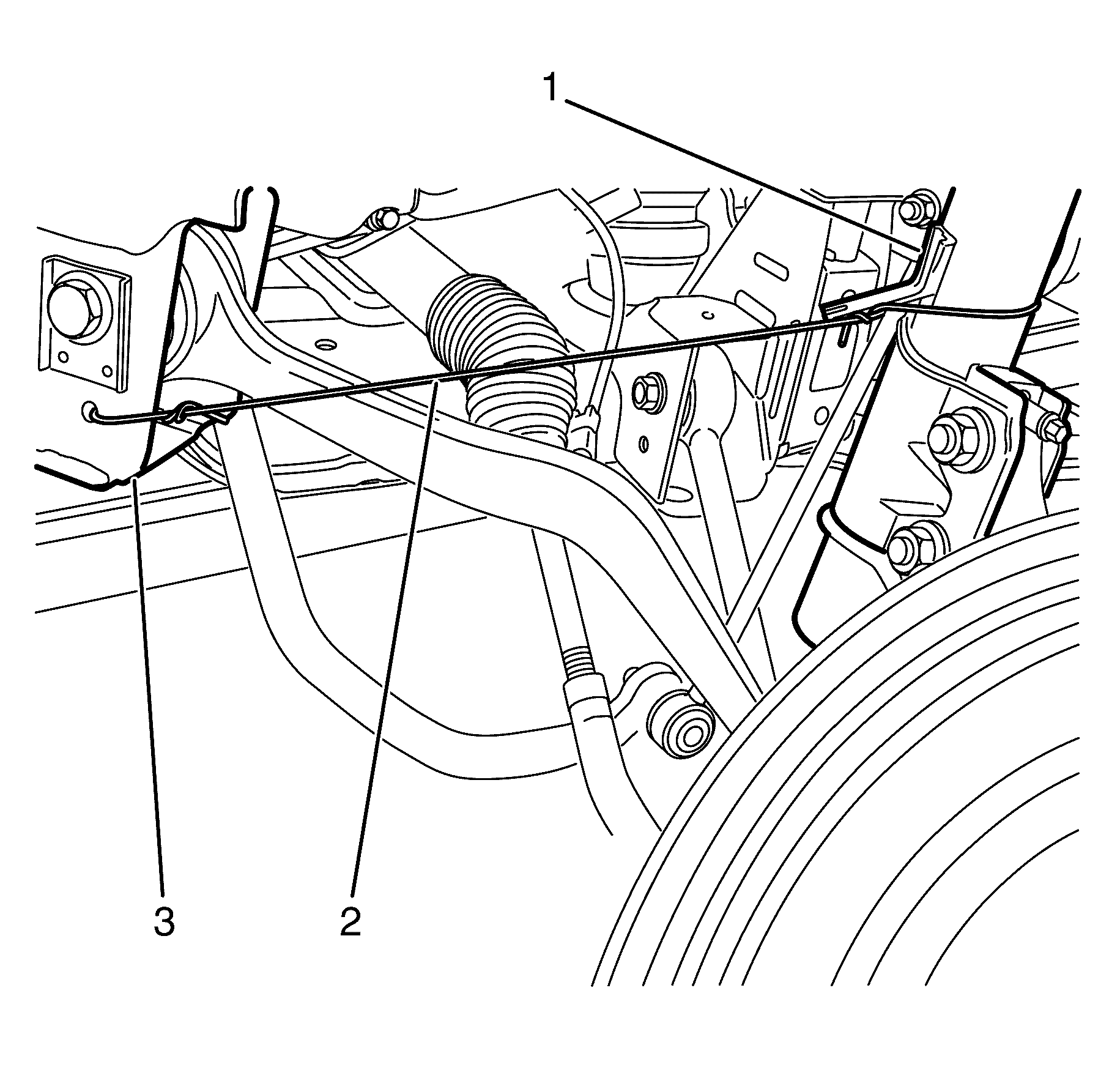
Important: The strut assembly (1) must be secured to the subframe (3) to prevent damage to the front wheelhouse liner, fenders and suspension components.

Important: The strut assembly (4) must be supported from underneath before the strut assembly to body retaining nut (2) is removed.
Discard the nut.




Important: Only right side depicted in graphic, left side similar.

Important: Only right side depicted in graphic, left side similar.
Important: Make sure that all the hoses, wires, pipes and front struts clear the vehicle during the removal process.

| • | Transmission Replacement in Manual Transmission -- Tremec 6-speed. |
| • | Transmission Replacement in Automatic Transmission -- 4L60-E/4L65-E/4L70-E. |
| • | Transmission Replacement in Automatic Transmission -- 5L40-E/5L50-E |
| • | Transmission Replacement in Automatic Transmission -- 6L50/6L80/6L90. |

Important: The locking tang on the power steering reservoir bracket (1) must be released before removing the power steering reservoir (2).


Notice: Refer to Fastener Notice in the Preface section.
Tighten
Tighten the bolts to 50 N·m (36 lb ft).

If required mount the engine on a suitable engine stand.
Caution: Refer to Exhaust Service Caution in the Preface section.
Caution: Refer to Protective Goggles and Glove Caution in the Preface section.


Important: The left side catalytic converter to exhaust manifold retaining nuts (1) are single use parts. They must be discarded after removal.
Discard the nuts.
Discard the gasket.
Caution: Refer to Exhaust Service Caution in the Preface section.
Caution: Refer to Protective Goggles and Glove Caution in the Preface section.


Important: The right side catalytic converter to exhaust manifold retaining nuts (1) are single use parts. They must be discarded after removal.
Discard the nuts.
Discard the gasket.







Important: DO NOT bend or distort the left side engine mount heat shield (2).
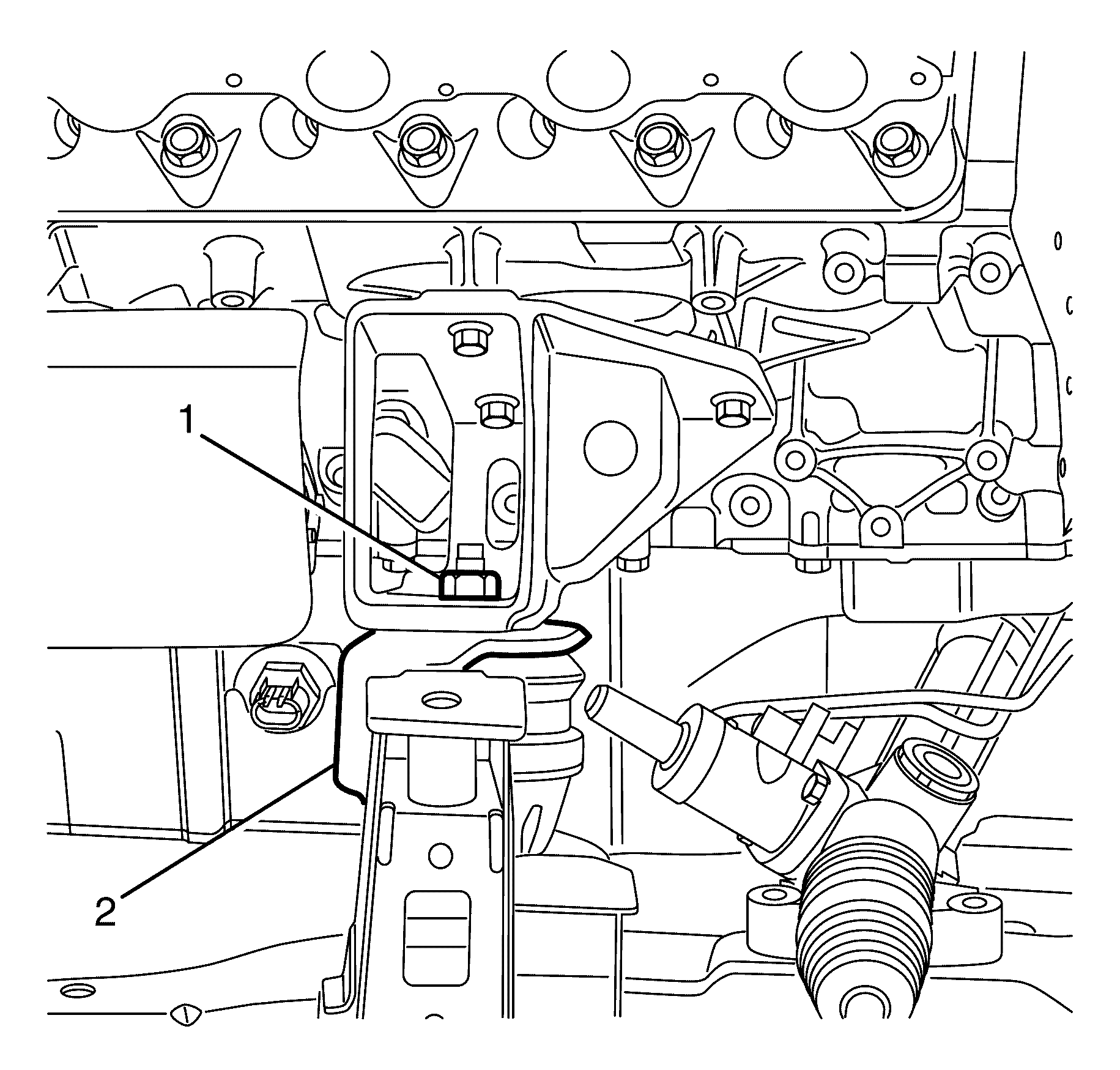
Important: DO NOT bend or distort the right side engine mount heat shield (2).
If required, mount engine to a suitable engine stand.
Installation Procedure
- Install the left side engine mount to engine mount bracket retaining nut (1)
- Install the right side engine mount to engine mount bracket retaining nut (1).
- Remove the lifting equipment as required and the J 41798 J 41798 from the cylinder heads.
- Install the alternator bracket (2) to the engine.
- Install the alternator bracket to engine block mounting bolt (1).
- Install the alternator (3) to the alternator bracket.
- Install alternator to alternator bracket retaining bolts (1 and 2).
- Install the A/C compressor bracket (2) to the engine.
- Install the A/C compressor bracket to the cylinder block retaining bolts (1).
- Install the A/C drive belt tensioner (1) to the engine.
- Tighten the A/C drive belt tensioner to A/C compressor bracket retaining bolt (4).
- Install the A/C tensioner pulley (2) to the A/C tensioner.
- Install the A/C tensioner pulley to A/C tensioner retaining bolt (3).
- If you are replacing the compressor, balance the compressor oil. Refer to Air Conditioning Compressor Oil Balancing.
- Install the compressor (2) to the compressor mounting bracket (3).
- Install the compressor to compressor mounting bracket retaining bolts (1).
- Install the power steering pump bracket (2).
- Install the power steering pump bracket to engine retaining bolts (1).
- Install a NEW sealing ring to the right side catalytic converter.
- Connect the right side catalytic converter (3) to the right side exhaust manifold (2).
- Install the right side catalytic converter to right side exhaust manifold retaining nuts (1).
- Install the right side exhaust manifold heat shield (1) to the right side exhaust manifold.
- Install the right side exhaust manifold heat shield to right side exhaust manifold retaining bolts (2).
- Install the right side spark plugs to the cylinder head. Refer to Spark Plug Replacement.
- Install the right side spark plug leads. Refer to Spark Plug Wire Replacement
- Install a NEW sealing ring to the left side catalytic converter.
- Connect the left side catalytic converter (2) to the left side exhaust manifold (3).
- Install the left side catalytic converter to left side exhaust manifold retaining nuts (1).
- Install the left side exhaust manifold heat shield (1) to the left side exhaust manifold.
- Install the left side exhaust manifold heat shield to left side exhaust manifold retaining bolts (2).
- Install the left side spark plugs to the cylinder head. Refer to Spark Plug Replacement.
- Install the left side spark plug leads. Refer to Spark Plug Wire Replacement
- Position the J 41798 J 41798 (1) on the cylinder heads (3).
- Install the J 41798 J 41798 to cylinder head retaining bolts (2).
- Using a suitable lifting crane and the J 41798 J 41798 raise the engine slightly.
- Remove the engine from the engine stand.
- Lower the engine onto the front subframe.
- Position the engine mounts to the front subframe.
- Install the lower engine mount to front subframe retaining nuts (1) on both engine mounts.
- Position the power steering pump (2) to the power steering pump bracket (1).
- Install NEW power steering pump to power steering pump bracket retaining bolts (3).
- Install the power steering reservoir (2) to the power steering pump power steering reservoir bracket (1).
- Install the A/C drive belt. Refer to Air Conditioning Compressor Belt Replacement.
- Install the accessory drive belt. Refer to Drive Belt Replacement - Accessory.
- Install the engine flywheel. Refer to Engine Flywheel Installation.
- Connect a suitable lifting crane to the engine lift brackets and raise the suitable lifting crane to support the engine.
- Install the transmission. Refer to one of the following procedures:
- Position the automatic transmission cooler pipes (2) to the engine.
- Install the automatic transmission cooler pipe clamp to A/C bracket bolt (1).
- Install the engine and transmission wiring harness and related components. Refer to Engine Wiring Harness Assembly Removal.
- With the aid of an assistant, raise the table and/or lower the vehicle to install the engine, transmission, front suspension and subframe assembly to the vehicle.
- Install the transmission support to body retaining bolts (1).
- Install the front subframe to body centre retaining bolt (1). Repeat for opposite side.
- Install the front subframe to body front retaining bolt (1). Repeat for opposite side.
- Install the subframe to body rear retaining bolts (1).
- Install the front subframe reinforcement plate (3) to the subframe (1).
- Install the front subframe reinforcement plate to front subframe retaining bolts (2).
- Lower the lift table and/or raise the vehicle to remove the support from the frame, engine and transmission.
- Remove the powertrain and/or engine lift table from the frame, engine and transmission.
- Lower the vehicle.
- Check the torque of the strut assembly retaining nut (1), correct if necessary. Repeat for opposite side.
- Install the front strut assembly (3) to the front wheelhouse (4). Repeat for opposite side.
- Install front strut assembly to front wheelhouse retaining plate (1). Repeat for opposite side.
- Tighten the NEW front strut assembly to front wheelhouse retaining nut (2). Repeat for opposite side.
- Install the dust cover (1) to the front strut assembly to front wheelhouse retaining nut (2).
- Raise the vehicle.
- Remove the heavy mechanics wire or equivalent (2) retaining the front strut assembly (1) to the front subframe (3).
- Connect the intermediate steering shaft (1) to the pinion shaft (3).
- Install NEW the intermediate steering shaft to pinion shaft retaining bolt (2).
- Connect the front wheel speed sensor jumper harness electrical connector (1) to the front wheel speed sensor. Repeat for opposite side.
- Remove the heavy mechanic's wire, or equivalent support (2) from the brake caliper (1). Repeat for opposite side.
- Install the front brake caliper assembly (2) to the front steering knuckle (3). Repeat for opposite side.
- Install the NEW brake caliper anchor plate to knuckle retaining bolts (1).
- Attach the front brake hose (1) to the strut mounted brake hose retaining bracket (2). Repeat for opposite side.
- Install the front wheels. Refer to Tire and Wheel Removal and Installation.
- Install the shift selector linkage rod (1) to the shift selector shaft (2).
- Install the shift selector linkage rod to shift selector shaft retaining nut (3).
- Install the shift control assembly. Refer to Shift Control Assembly Replacement.
- Connect the to concentric actuator cylinder feed hose (3) to the concentric actuator cylinder feed pipe (1).
- Install the flexible hose securing clip (2).
- Install the starter motor. Refer to Starter Motor Replacement.
- Install the propeller shaft. Refer to Propeller Shaft Replacement.
- Install the centre exhaust heat shield. Refer to Exhaust Heat Shield Replacement - Center.
- Install the Exhaust system. Refer to Exhaust System Replacement.
- Remove the plug from the power steering cooler (3) and power steering reservoir inlet hose (2).
- Connect the power steering reservoir inlet hose (2) to the power steering cooler (3).
- Install the power steering reservoir inlet hose spring clamp (1) to its original location
- Remove the plug from the power steering cooler (3) and power steering reservoir inlet hose (1).
- Connect the power steering reservoir inlet hose (1) to the power steering cooler (3).
- Install the power steering reservoir inlet hose spring clamp (2) to its original location
- Install the engine splash shield. Refer to Engine Splash Shield Replacement.
- Install the front air deflector. Refer to Front Air Deflector Replacement.
- Lower the vehicle.
- Remove the clean lint free cloth at the automatic transmission cooler pipes (2) and the flexible hoses (1).
- Align both flexible hose's with both steel cooler lines.
- Hold the cooler line (2) and connect the flexible hose (1) by pushing together. Repeat procedure for other hose.
- Check and top up transmission fluid level if required. Refer to Transmission Fluid Level Inspection. Refer to Transmission Fluid Level Inspection.
- Remove the large zip ties or equivalent securing the radiator and condenser assembly (2) to the front end assembly (3).
- Remove the plug or cap at the A/C suction pipe ends (1 and 3)
- Fit the NEW A/C suction pipe sealing O-ring (2) to the suction tube.
- Install the upper A/C suction pipe (1) to the lower A/C suction pipe (3).
- Install the A/C suction pipe pad to A/C suction pipe retaining nut (1).
- Remove the plug from the throttle body to EVAP purge valve tube (3) and EVAP purge valve (1) ends.
- Connect the throttle body to EVAP purge valve tube (3) to the EVAP purge valve (1).
- Remove the plug from the EVAP purge valve to fuel tank tube (2) and EVAP purge valve (1) ends.
- Connect the EVAP purge valve to fuel tank tube (2) to the EVAP purge valve (1).
- Install the wiring harness (2) to the remote positive battery post.
- Install the remote positive battery post to wiring harness retaining bolt (1).
- Install the remote positive battery post cover (1).
- Remove the plug from the fuel feed pipe (2) and fuel rail pipe (1) ends.
- Connect the fuel rail feed pipe (2) quick connect fitting. Refer to Metal Collar Quick Connect Fitting Service or Plastic Collar Quick Connect Fitting Service.
- Connect the vacuum brake booster hose (3) from the intake manifold vacuum port (1).
- Compress the vacuum brake booster hose retaining clamp (2) and return to its original position on the vacuum brake booster hose (3).
- Remove the plug from the compressor (3) ports.
- Remove the plug from the pipes (1).
- Fit the NEW A/C suction/discharge pipe O-rings (2) to the suction/discharge pipes (1).
- Connect the A/C suction/discharge line pad (1) to the A/C compressor (3).
- Install the suction/discharge line pad (1) to compressor and tighten the retaining bolt (1) to the correct torque specification.
- Connect the electrical connector to the A/C Refrigerant Pressure Sensor (1).
- Connect the A/C electrical connector (1) to the A/C compressor.
- Install the vehicle body ground cable (3) to the cylinder head stud (2).
- Install the vehicle body ground cable to cylinder head retaining nut (1).
- Slide the engine connector (3) into the body harness connector (1) to join.
- Attach the protector (1) to the base of the under hood BEC connector (2).
- Install the upper under hood BEC plate (1) to the lower under hood BEC plate (3).
- Install the under hood BEC upper plate to lower plate retaining bolts (2).
- Connect the positive cable (2) to the upper under hood BEC plate (4).
- Install the positive cable to under hood BEC plate retaining bolt (5).
- Install the positive cable protective cover (3).
- Install the under hood body electrical centre (BEC) cover (1).
- Connect the ECM electrical connectors (1) to the ECM.
- Engage the ECM retaining clips (1) to secure the ECM (2).
- Connect the inlet and outlet heater hoses (3) at the heater hose assembly quick connect fittings (1).
- Connect the coolant air bleed hose (3) to the coolant bleed pipe (2).
- Reposition the coolant bleed hose retaining clamp (1) to its original position on the coolant bleed hose (3).
- Tighten the coolant bleed hose retaining clamp (1).
- Install the radiator outlet hose. Refer to Radiator Outlet Hose Replacement.
- Fill the cooling system. Refer to Cooling System Draining and Filling.
- Install the air intake duct. Refer to Air Cleaner Inlet Duct Replacement.
- Recharge the air conditioning (A/C) system. Refer to Refrigerant Recovery and Recharging.
- Install the radiator air baffle and deflector. Refer to Radiator Air Upper Baffle and Deflector Replacement.
- Install the engine cover. Refer to Engine Cover Replacement.
- Connect the negative battery cable. Refer to Battery Negative Cable Disconnection and Connection.
- Bleed The clutch. Refer to Hydraulic Clutch Bleeding.
- Disable the ignition system.
- Crank the engine several times. Listen for any unusual noises or evidence that parts are binding.
- Enable the ignition system.
- Start the engine and listen for unusual noises.
- Check the vehicle oil pressure gauge and confirm that the engine has acceptable oil pressure.
- Run the engine speed at about 1,000 RPM until the engine has reached normal operating temperature.
- Listen for sticking lifters and other unusual noises.
- Inspect for fuel, oil, and/or other coolant leaks while the engine is running.

Important: DO NOT bend or distort the left side engine mount heat shield (4).
Tighten
Tighten the nut to 80 N·m (59 lb ft).

Important: DO NOT bend or distort the right side engine mount heat shield (4).
Tighten
Tighten the nut to 80 N·m (59 lb ft).

Tighten
Tighten the bolt to 50 N·m (37 lb ft).

Tighten
Tighten the bolts to 34 N·m (25 lb in).

Notice: Refer to Fastener Notice in the Preface section.
Tighten
Tighten the bolts to 58 N·m(43 lb ft).

Notice: Refer to Fastener Notice in the Preface section.
Tighten
Tighten the bolt to 22 N·m (16 lb ft).
Tighten
Tighten the bolt to 50 N·m (37 lb ft).

Tighten
Tighten the bolts to 22 N·m (16 lb ft).

Tighten
Tighten the bolts to 58 N·m (43 lb ft).

Important: Make sure that a new sealing ring is fitted prior to installation. If not the exhaust system may perform poorly.
Tighten
Tighten the nuts to 45 N·m (33 lb ft).

Tighten
Tighten the bolts to 10 N·m (89 lb in).

Important: Make sure that a new sealing ring is fitted prior to installation. If not the exhaust system may perform poorly.
Tighten
Tighten the nuts to 45 N·m (33 lb ft).

Tighten
Tighten the bolts to 10 N·m (89 lb in).

Notice: Refer to Fastener Notice in the Preface section.
Tighten
Tighten the bolts to 50 N·m (36 lb ft).

Tighten
Tighten the nuts to 80 N·m (59 lb ft).

Tighten
Tighten the bolts to 30 N·m (23 lb ft).

Important: Make sure the power steering reservoir (2) and the power steering reservoir bracket locking tang (1) are engaged to avoid an induced rattle condition.
| • | Transmission Replacement in Manual Transmission -- Tremec 6-speed. |
| • | Transmission Replacement in Automatic Transmission -- 4L60-E/4L65-E/4L70-E. |
| • | Transmission Replacement in Automatic Transmission -- 5L40-E/5L50-E |
| • | Transmission Replacement in Automatic Transmission -- 6L50/6L80/6L90. |

Tighten
Tighten the bolt to 22 N·m (16 lb ft).
Important: Make sure that all the hoses, wires, pipes and shock modules clear the vehicle during the installation process.

Tighten
Tighten the bolts to 58 N·m (42 lb ft).

Tighten
Tighten the bolts to 160 N·m (118 lb ft).

Tighten
Tighten the bolts to 160 N·m (118 lb ft).

Tighten
Tighten the bolts to 240 N·m (177 lb ft).

Tighten
Tighten the bolts to 17 N·m (11 lb ft).
Notice: Refer to Fastener Notice in the Preface section.

Important: The strut assembly retaining nut (1) must be checked for correct torque before installing the strut assembly into the vehicle. The strut assembly retaining nut torque must be 75 N·m (55 lb ft).
Tighten
Tighten the nut to 75 N·m (55 lb ft).

Tighten
Tighten the nut to 55 N·m (40 lb ft).



Important: The intermediate steering shaft and pinion shaft splines must be installed in the position recorded during removal and aligned with the marks previously made.
Tighten
Tighten the bolt to 25 N·m (18 lb ft).



Notice: Make sure the brake hose is not twisted or kinked after installation. Damage to the hose could result.
Tighten
Tighten the bolts to 60 N·m +120°
(44 lb in +120°).

Notice: Make sure the brake hose is not twisted or kinked after installation. Damage to the hose could result.

Important: Ignore steps 73 and 74 for vehicles fitted with an manual transmission.
Tighten
Tighten the nut to 25 N·m (18 lb ft).
Important: Ignore steps 75 through to 77 for vehicles fitted with an automatic transmission.

Important: Listen for an audible click to confirm fitting.


Important: Ignore steps 91 through to 94 for vehicles equipped with a manual transmission.

Important: The flexible hoses are not serviced separately. Therefore if the hose's require replacement, then the hose and radiator to hose cooler hose assembly must be fitted.
Important: Listen for an audible click to confirm fitting.
Important: When adding or changing transmission fluid use only recommend automatic transmission fluid.

Important: Cut zip tie A and zip tie B and remove from around the front end assembly (3) and the radiator and condenser mount (1).

Important: The A/C sealing O-rings must be fitted dry. DO NOT lubricate the A/C sealing O-rings.

Tighten
Tighten the nut to 22 N·m(16 lb ft).


Tighten
Tighten the bolt to 15 N·m (11 lb ft).

Important: Make sure the clips on the remote positive battery post cover (1) are engaged to avoid an induced rattle condition.



Important: The A/C sealing O-rings must be fitted dry. DO NOT lubricate the A/C sealing O-rings.

Tighten
Tighten the bolt to 22 N·m (16 lb ft).



Tighten
Tighten the nut to 10 N·m (89 lb ft).

Important: Listen for a audible click from the locking tang (2) to confirm fitting.


Important: The under hood BEC upper plate to lower plate retaining bolts (2) DO NOT have a torque specification. Listen for an audible clicking sound whilst tightening the under hood BEC upper plate to lower plate retaining bolts (2) to confirm correct fitting.
Listen for an audible click for correct tension.

Tighten
Tighten the bolt to 10 N·m (89 lb ft).
Notice: Do not touch the connector pins or soldered components on the circuit board in order to prevent possible electrostatic discharge (ESD) damage to the PCM.



Important: Listen for a audible click to confirm fitting.

If necessary, install an oil pressure gauge and measure the engine oil pressure.
